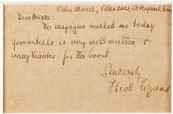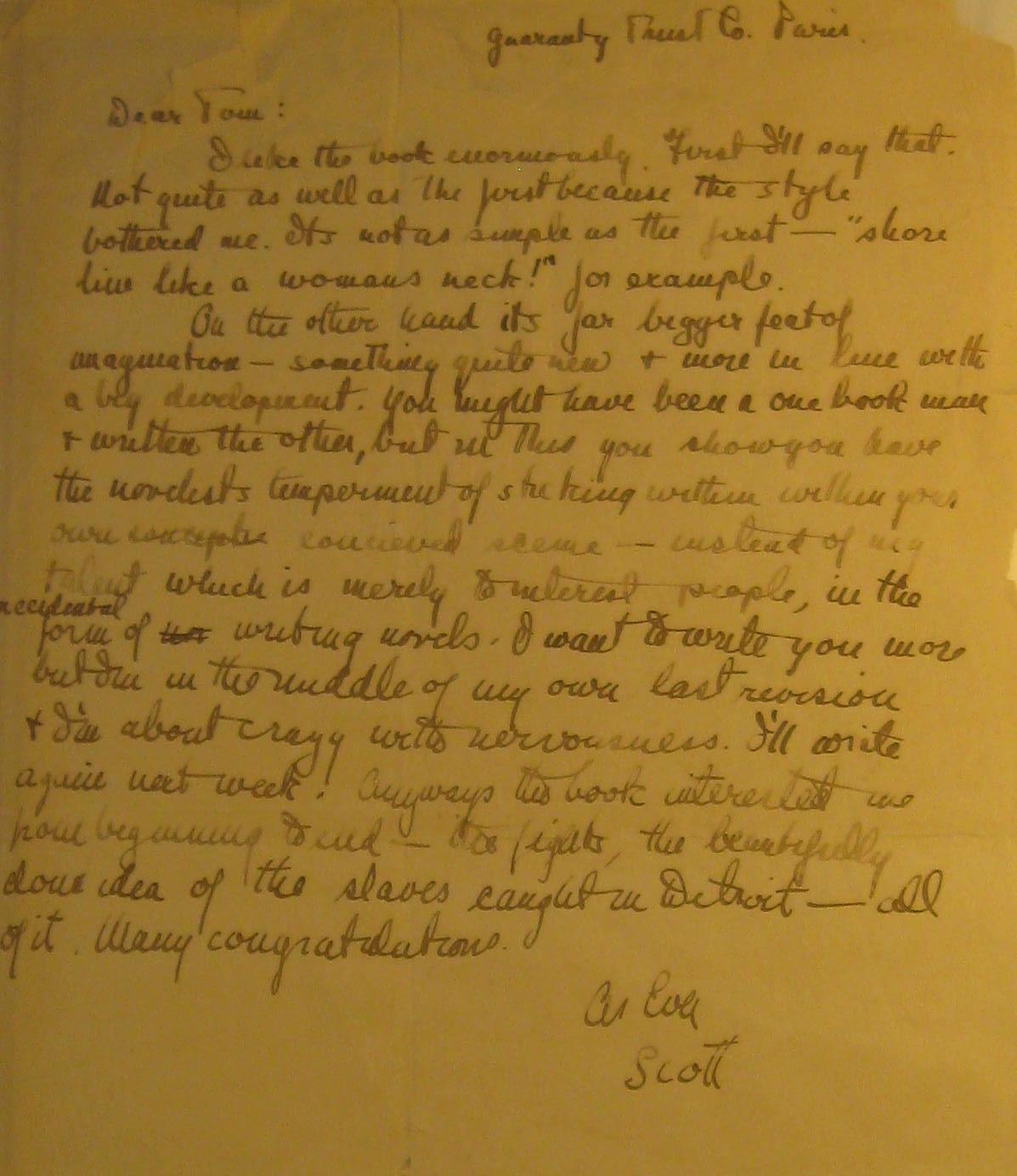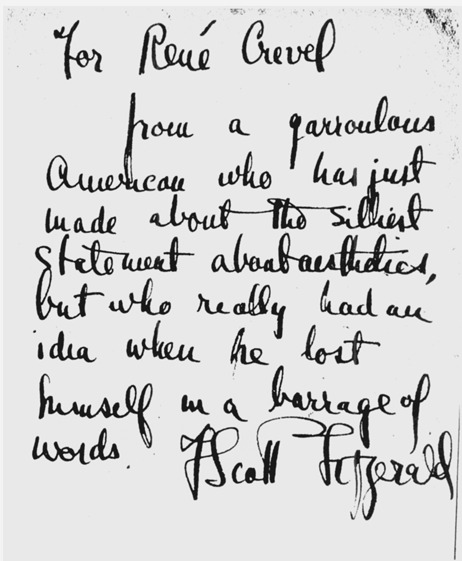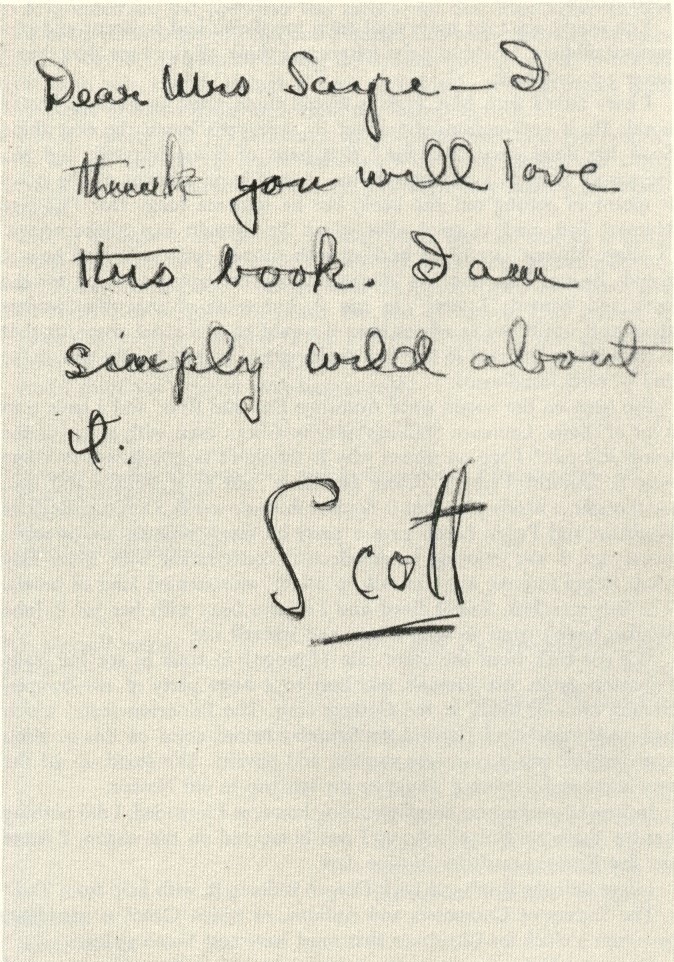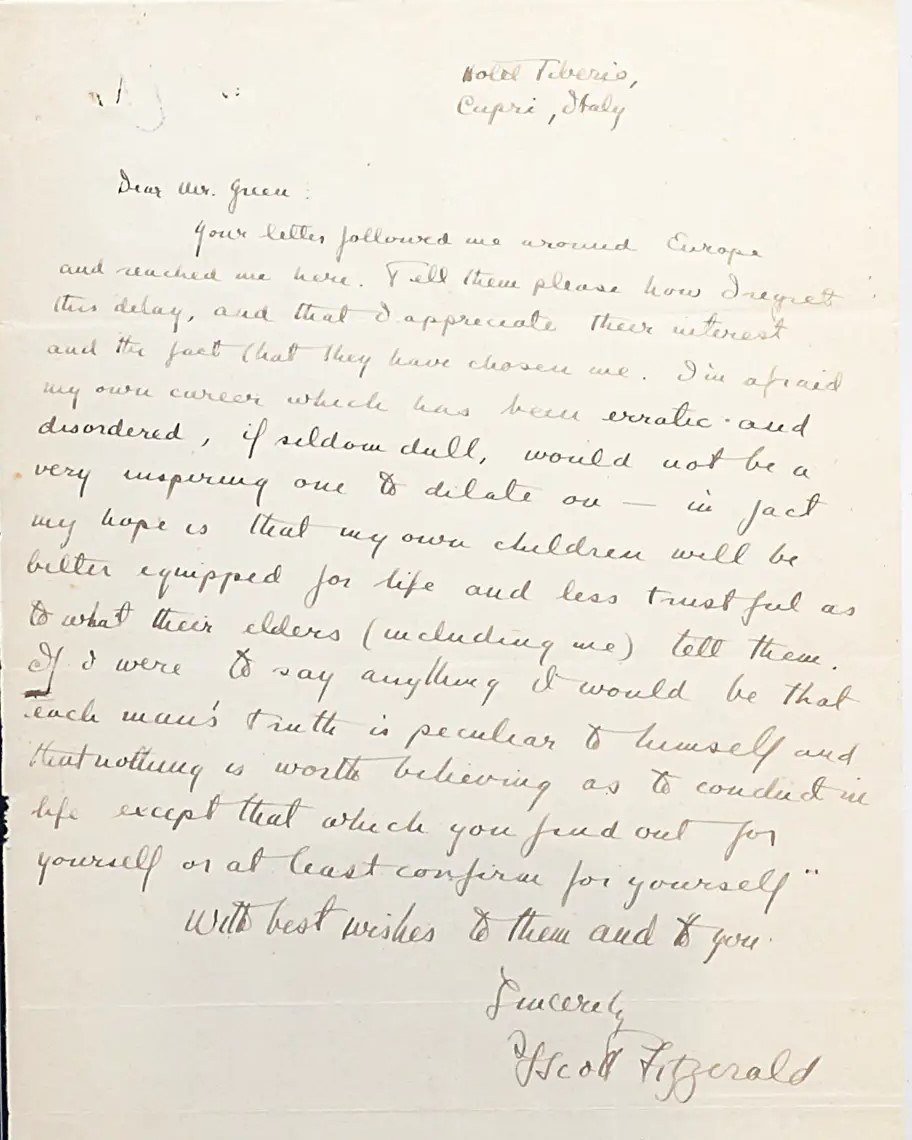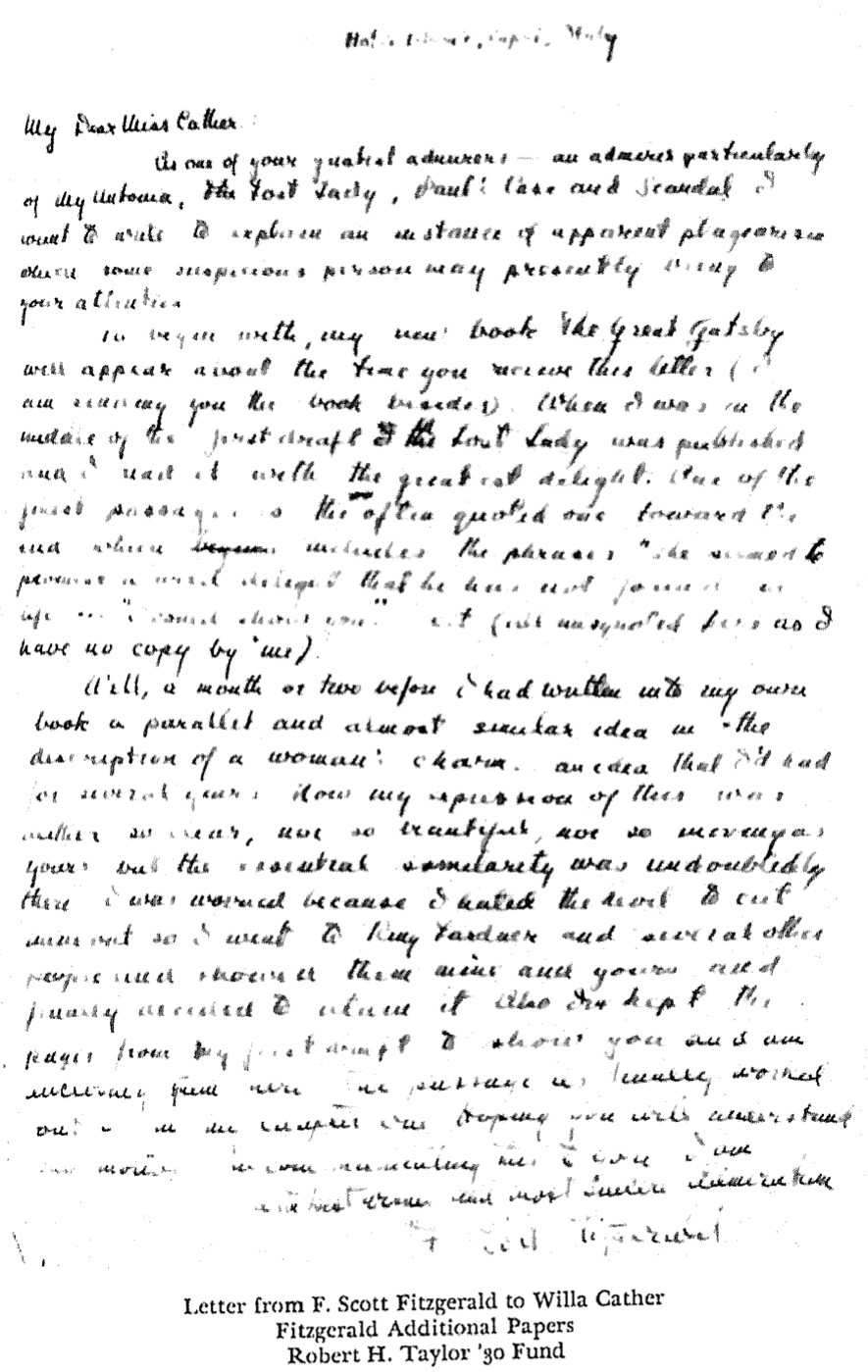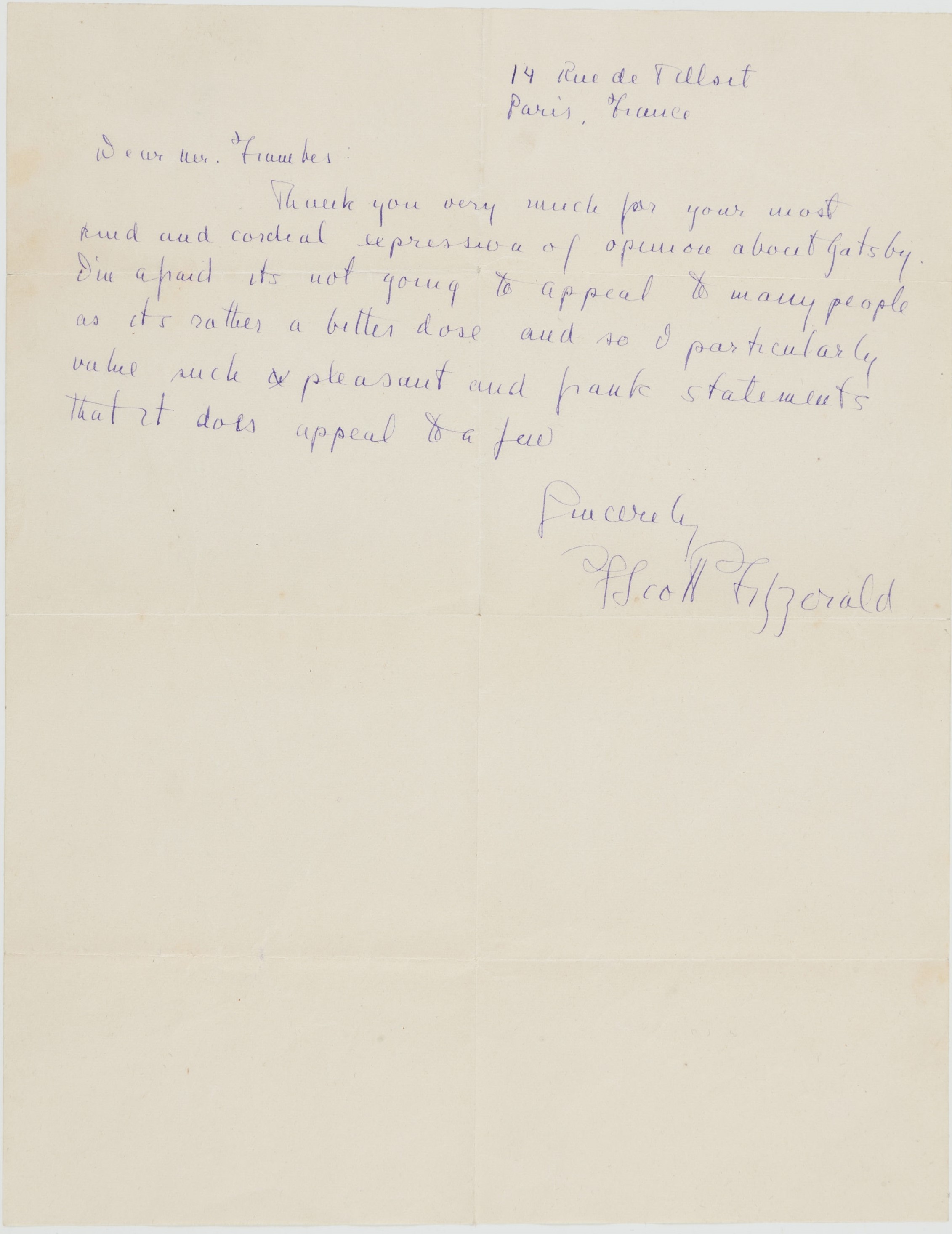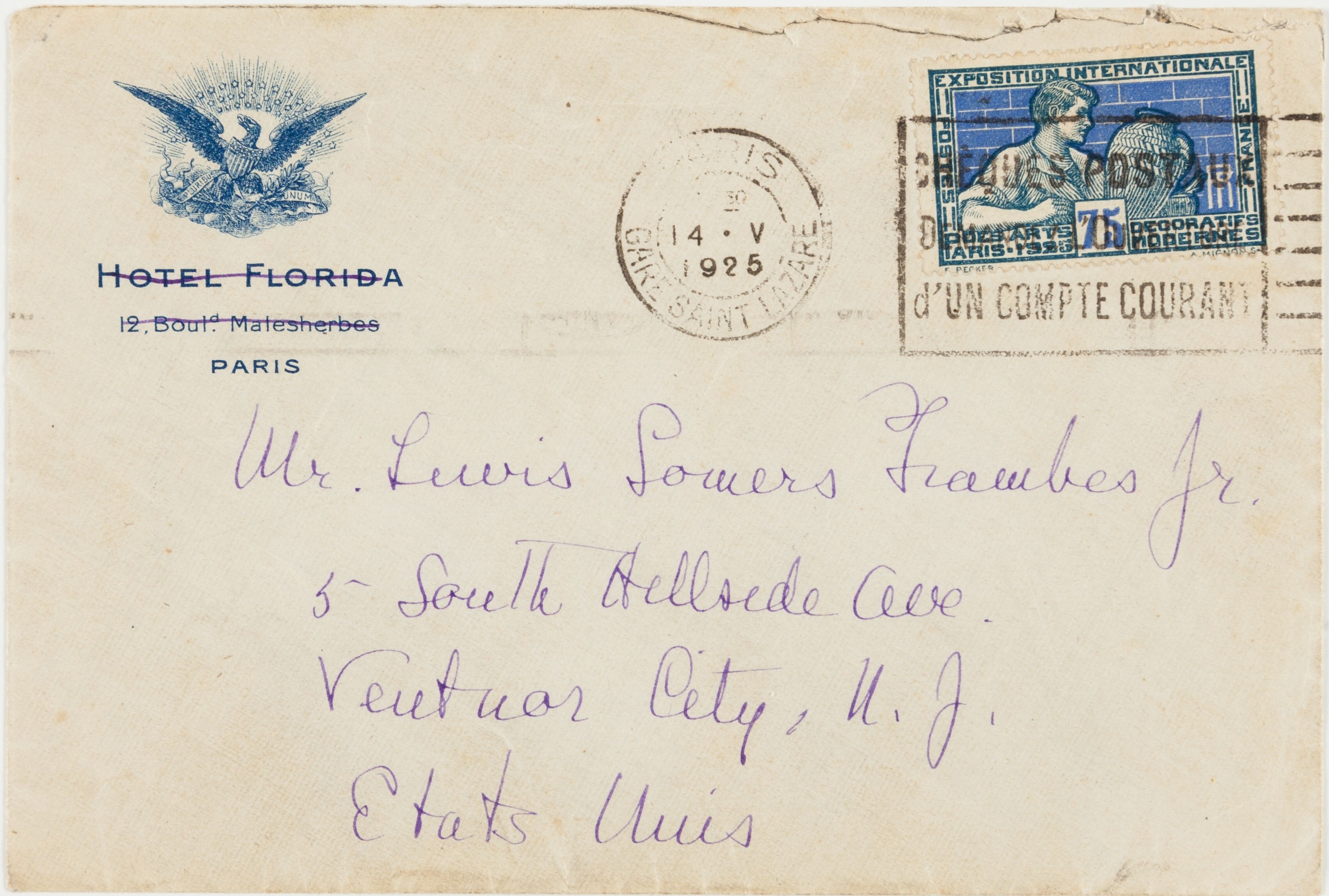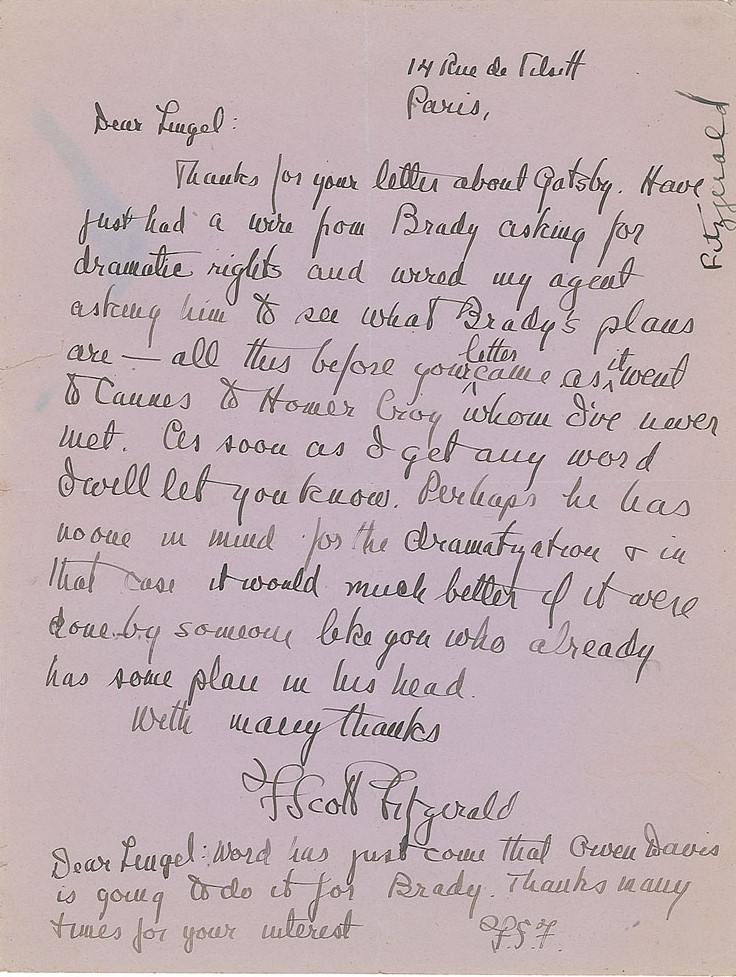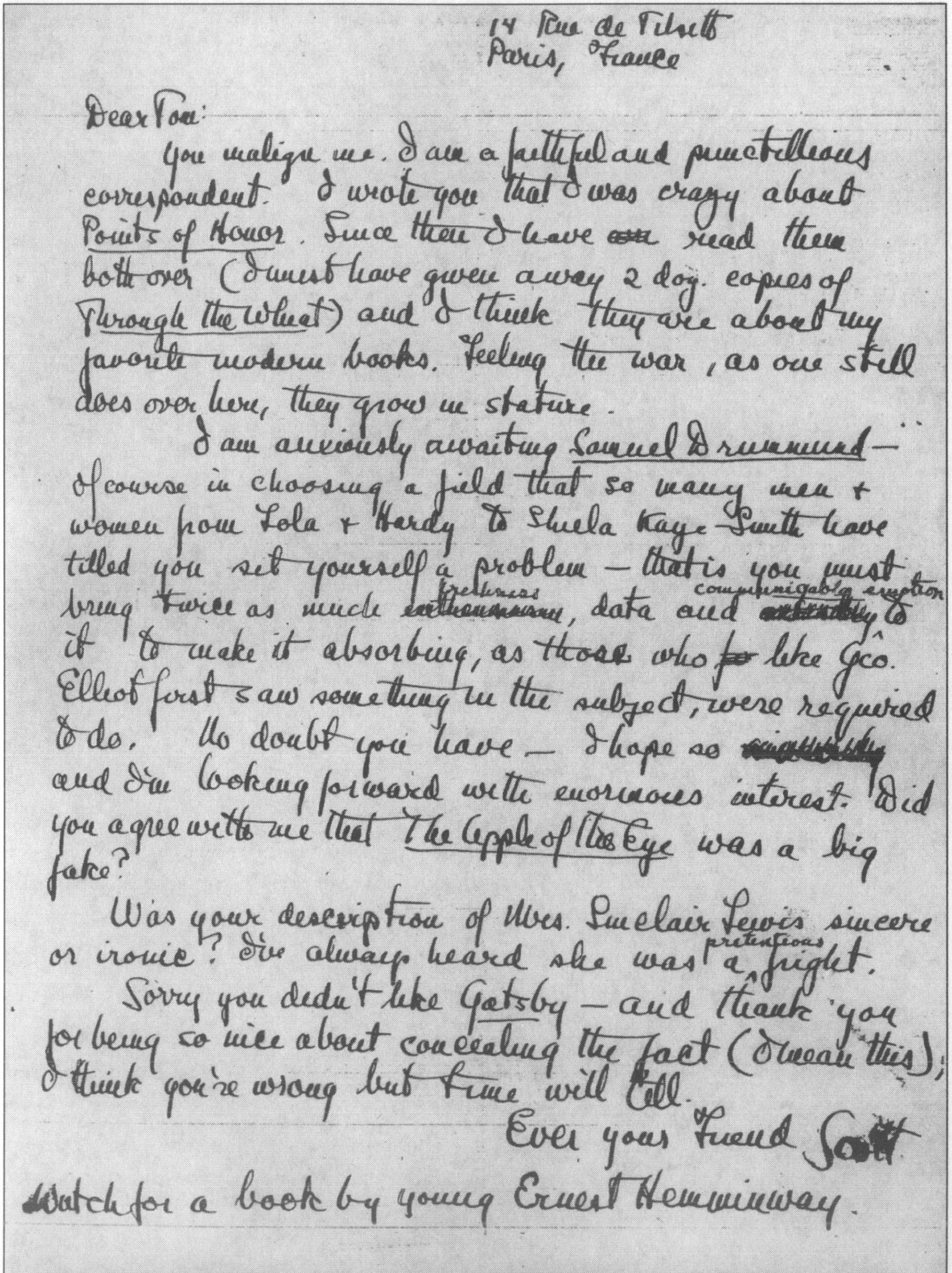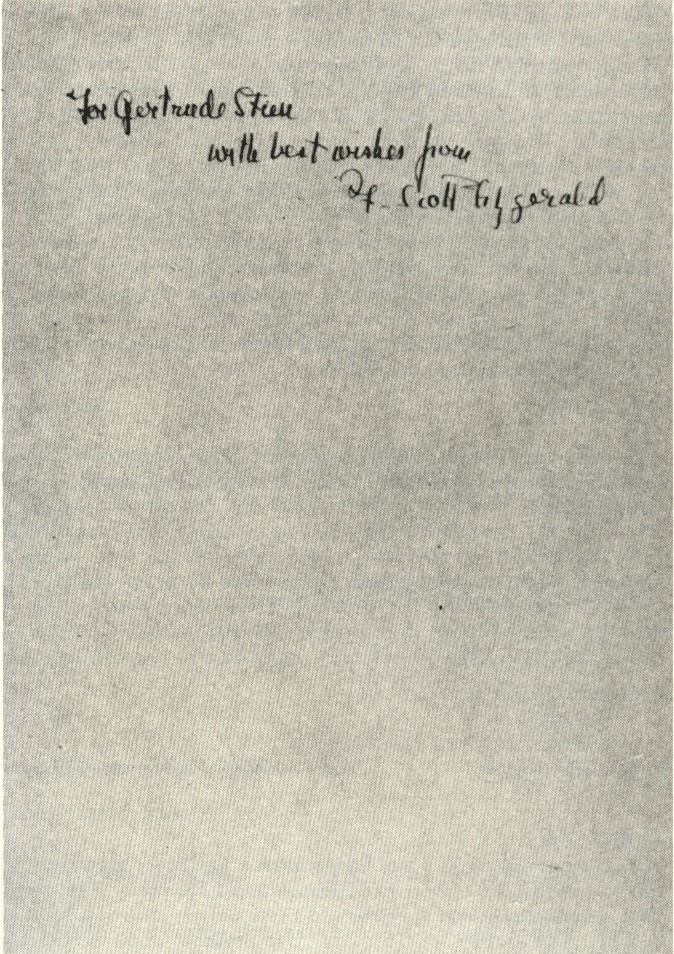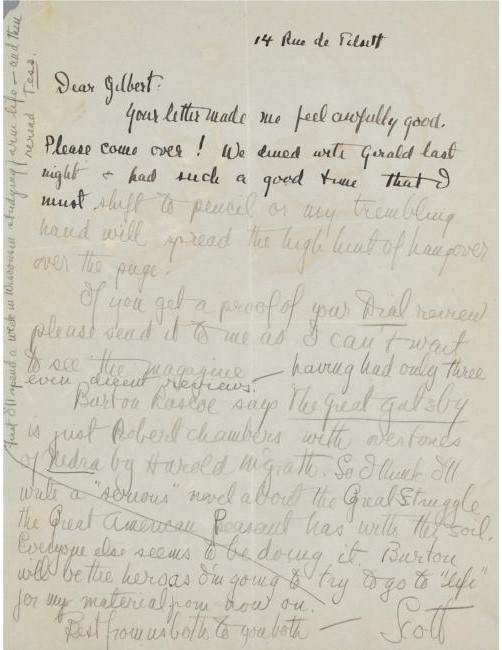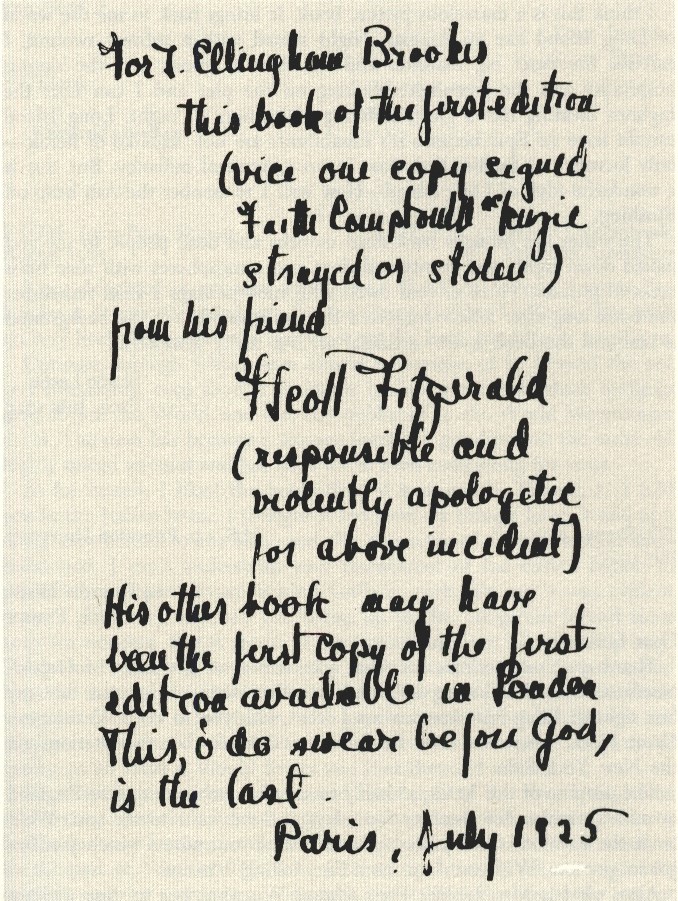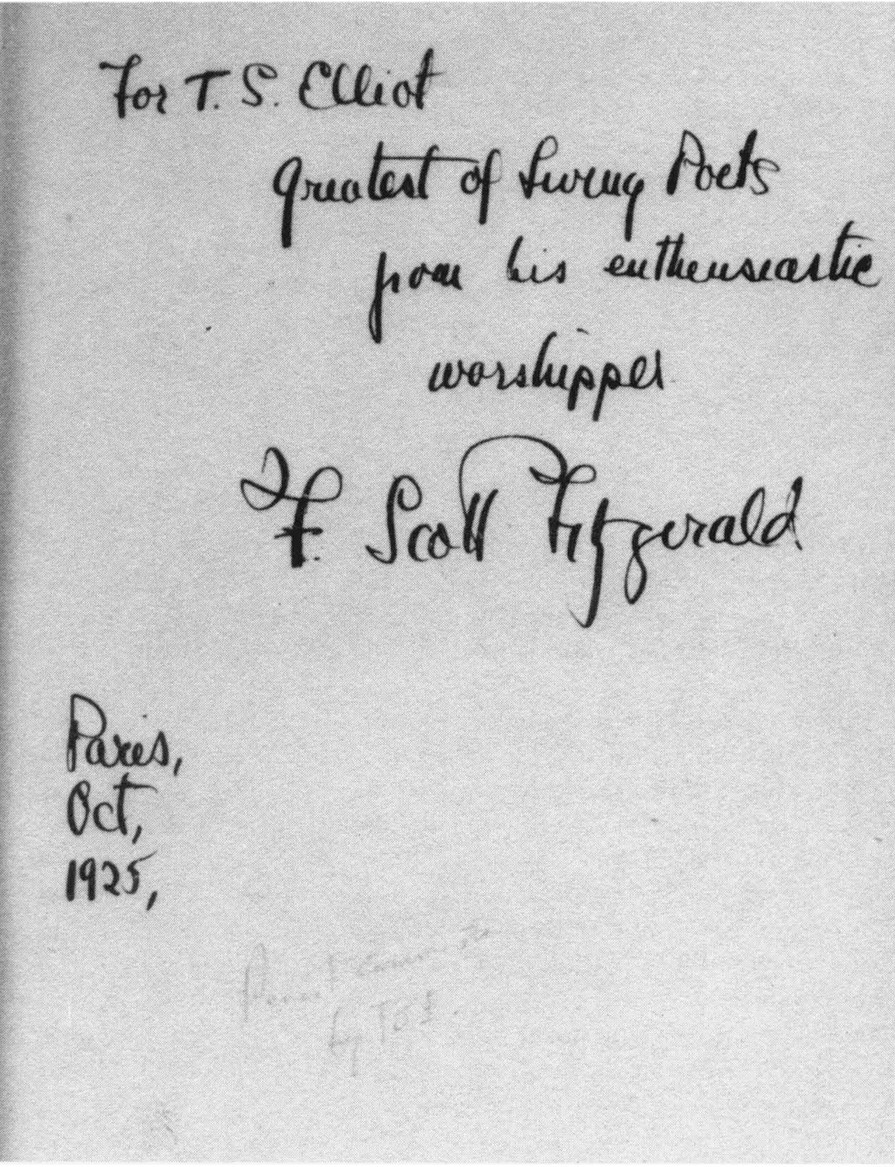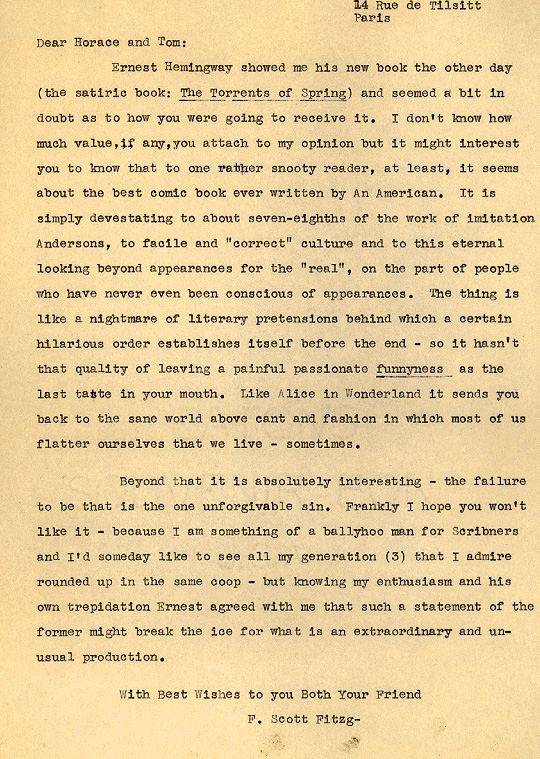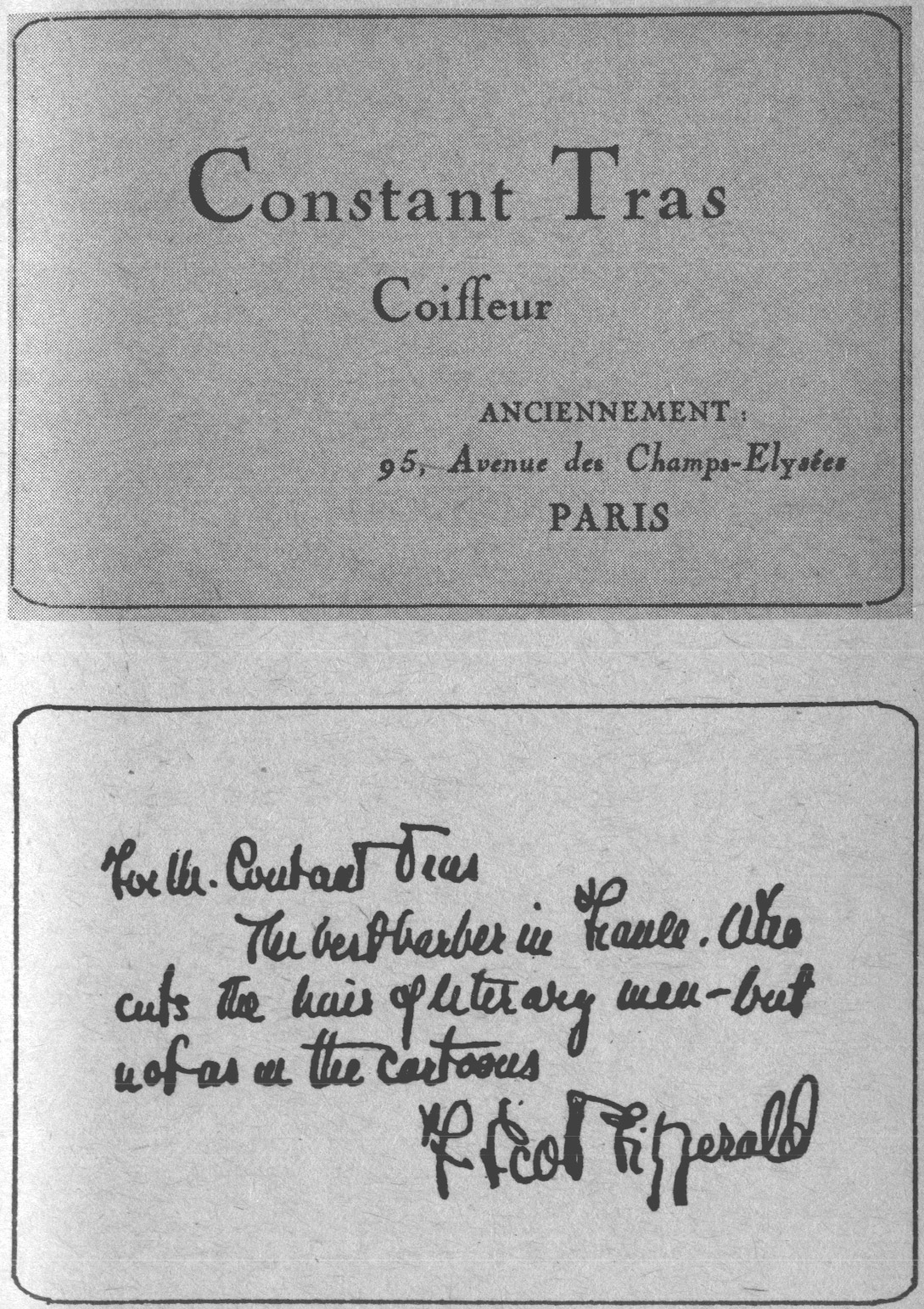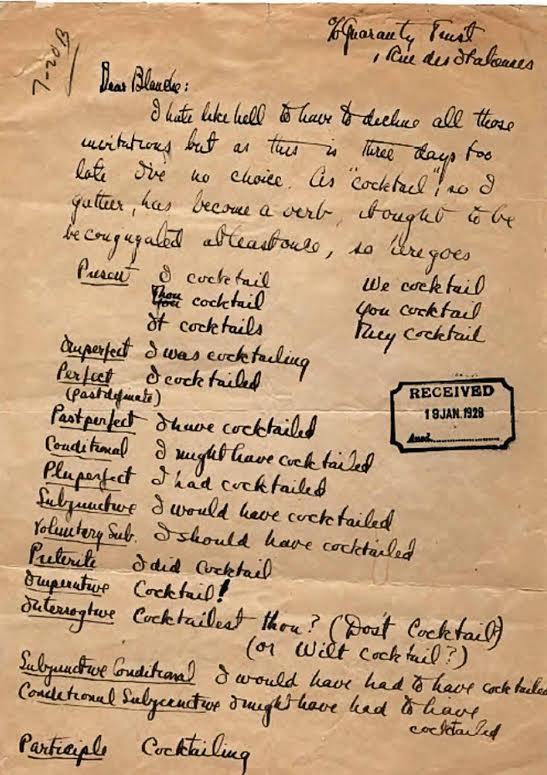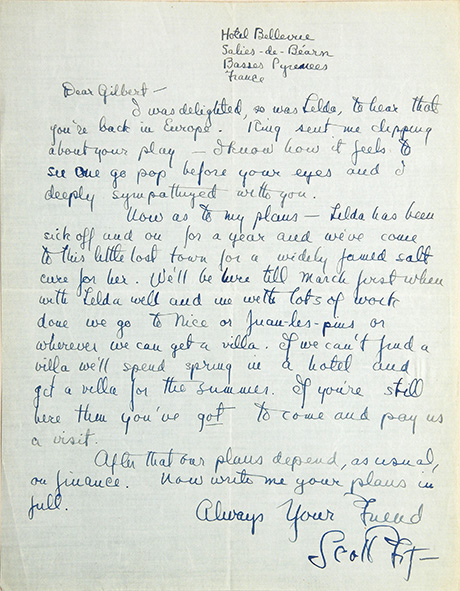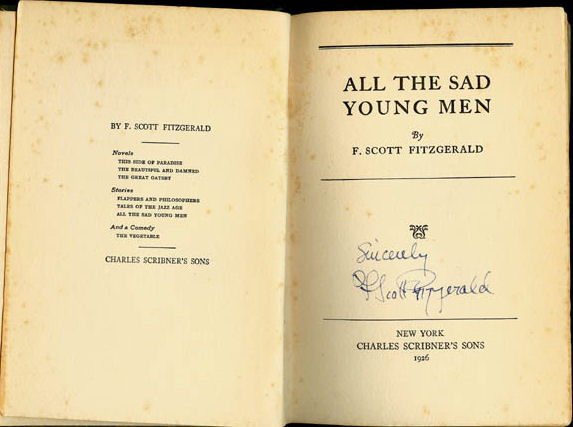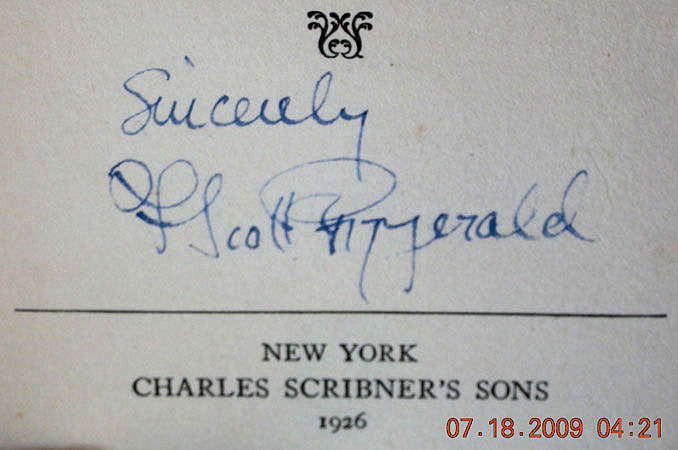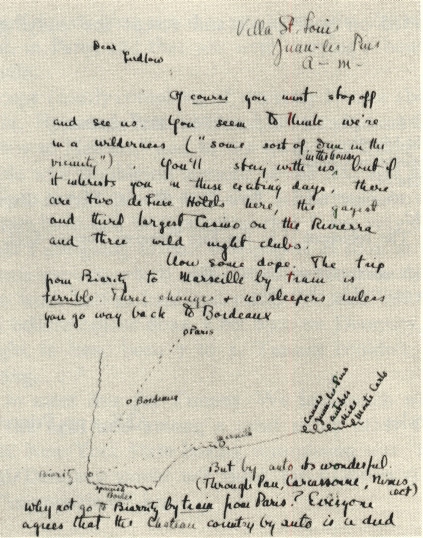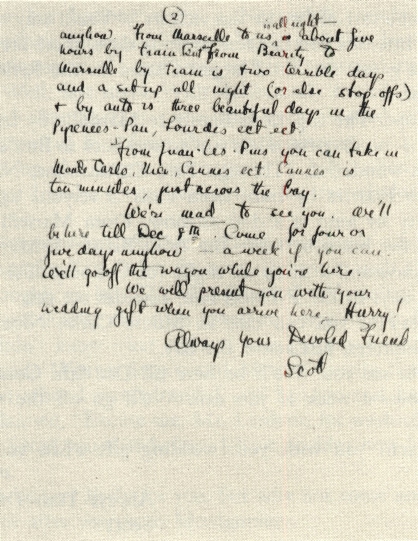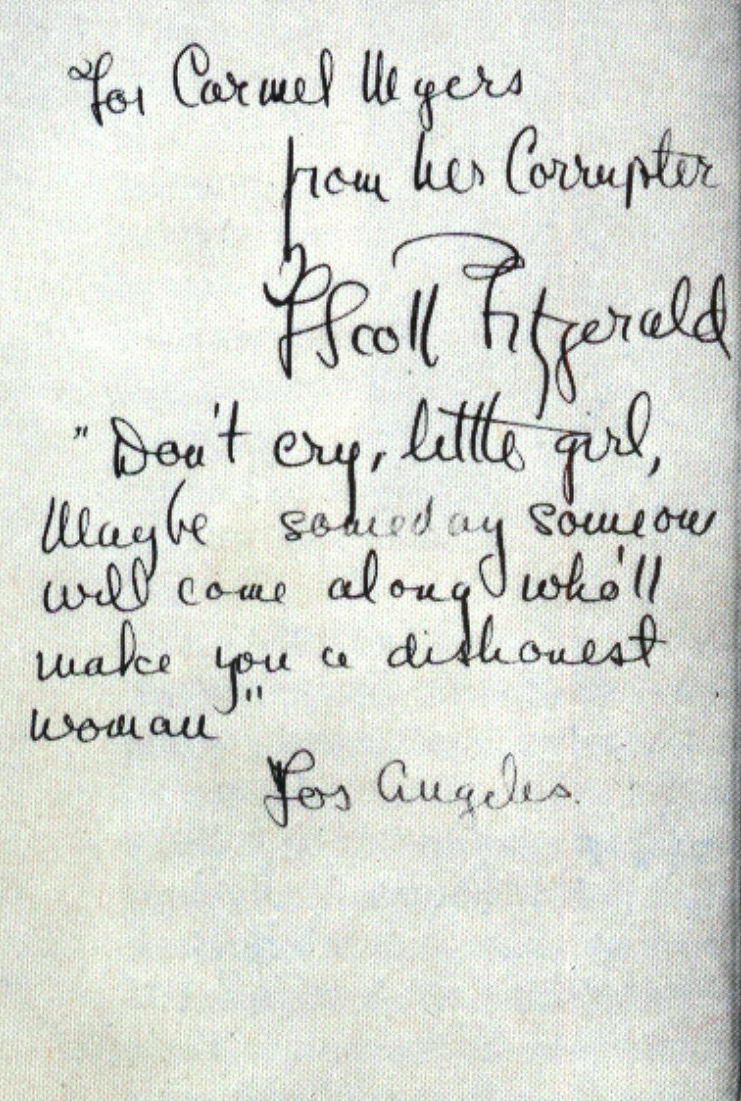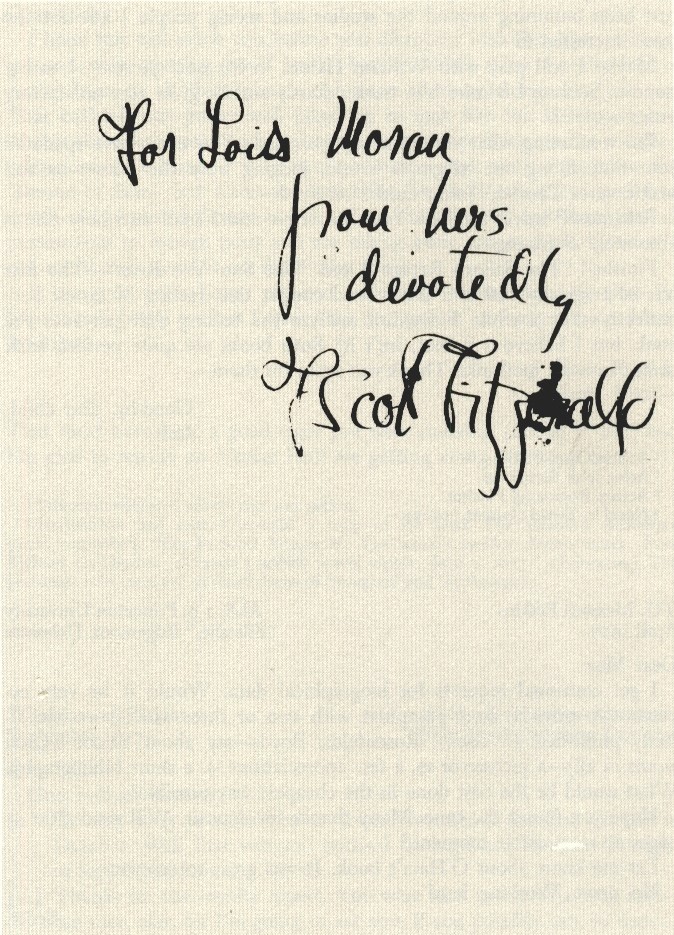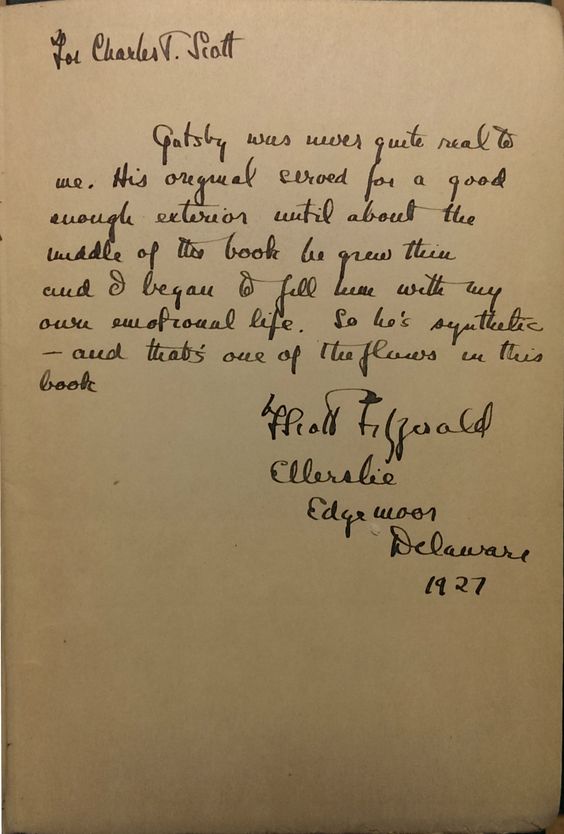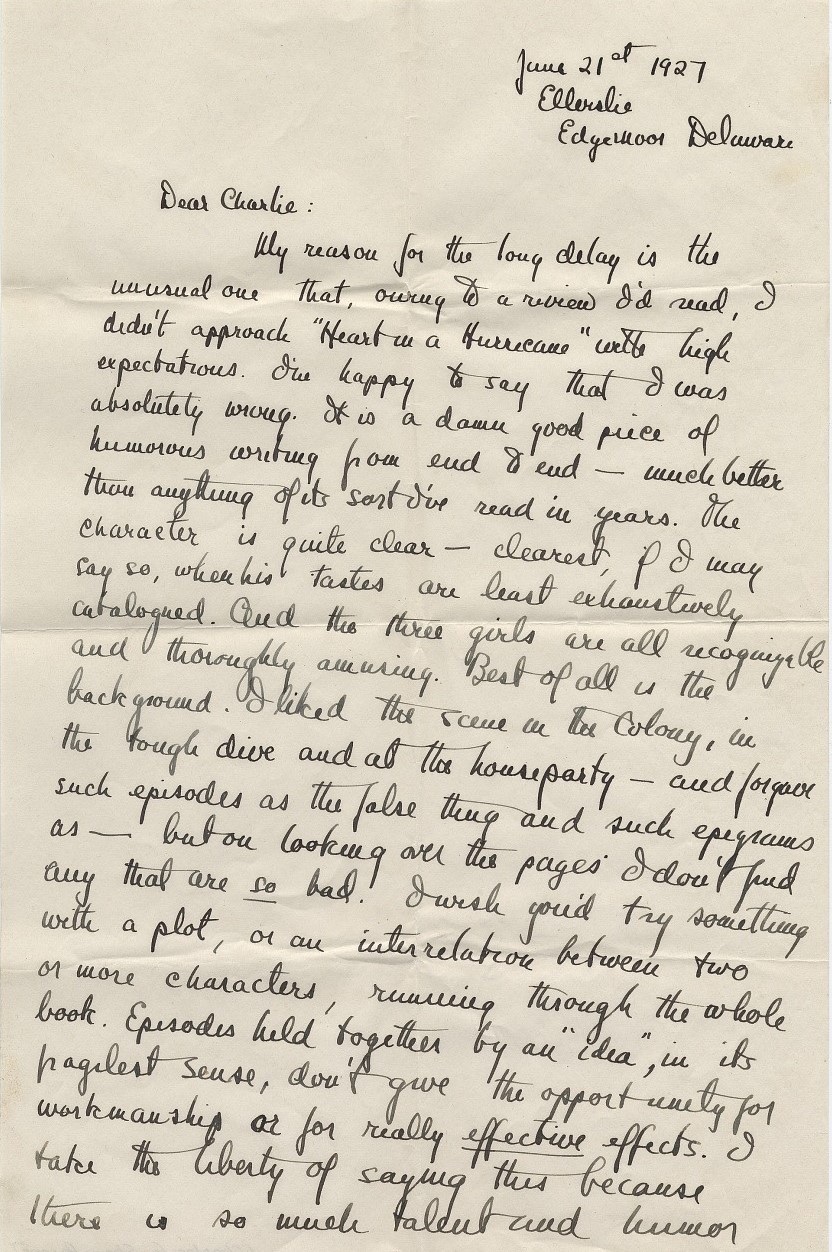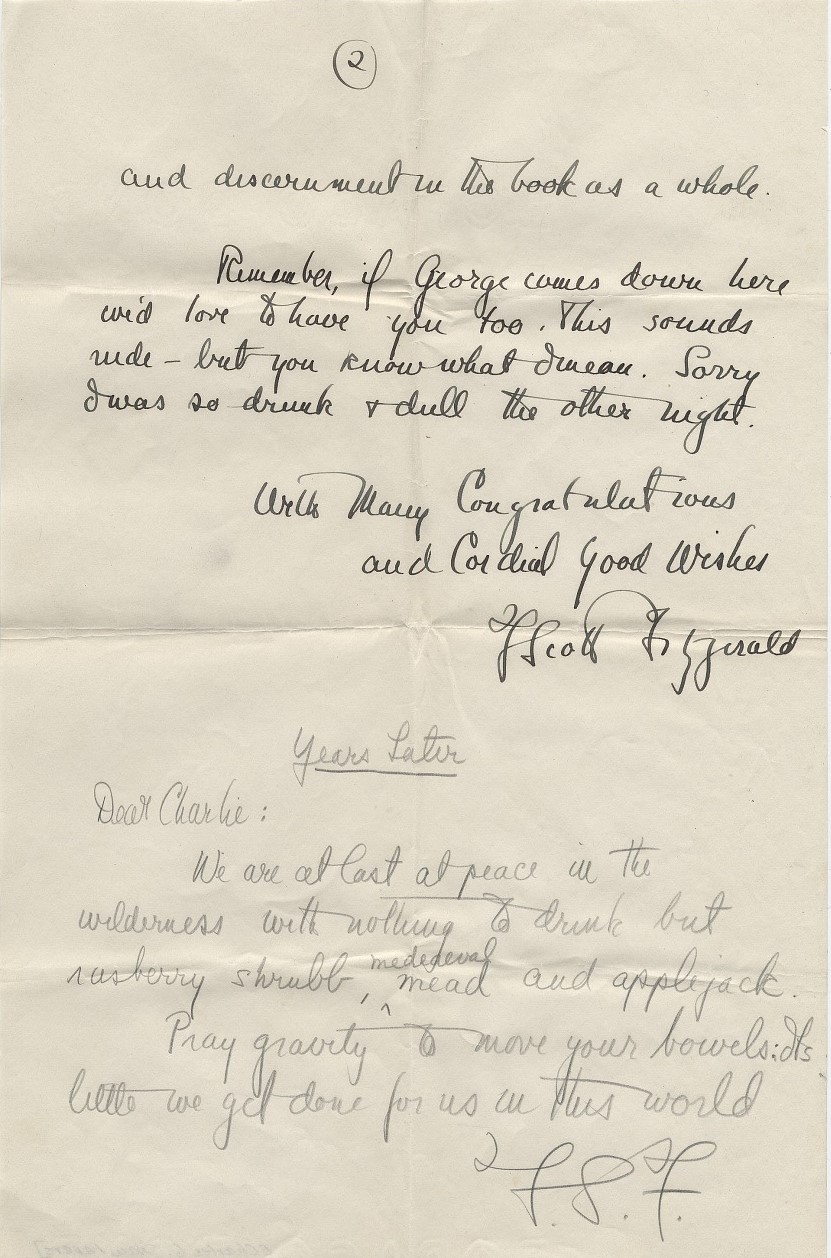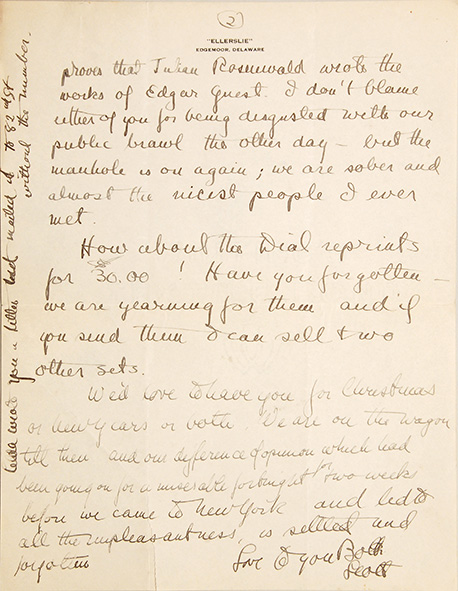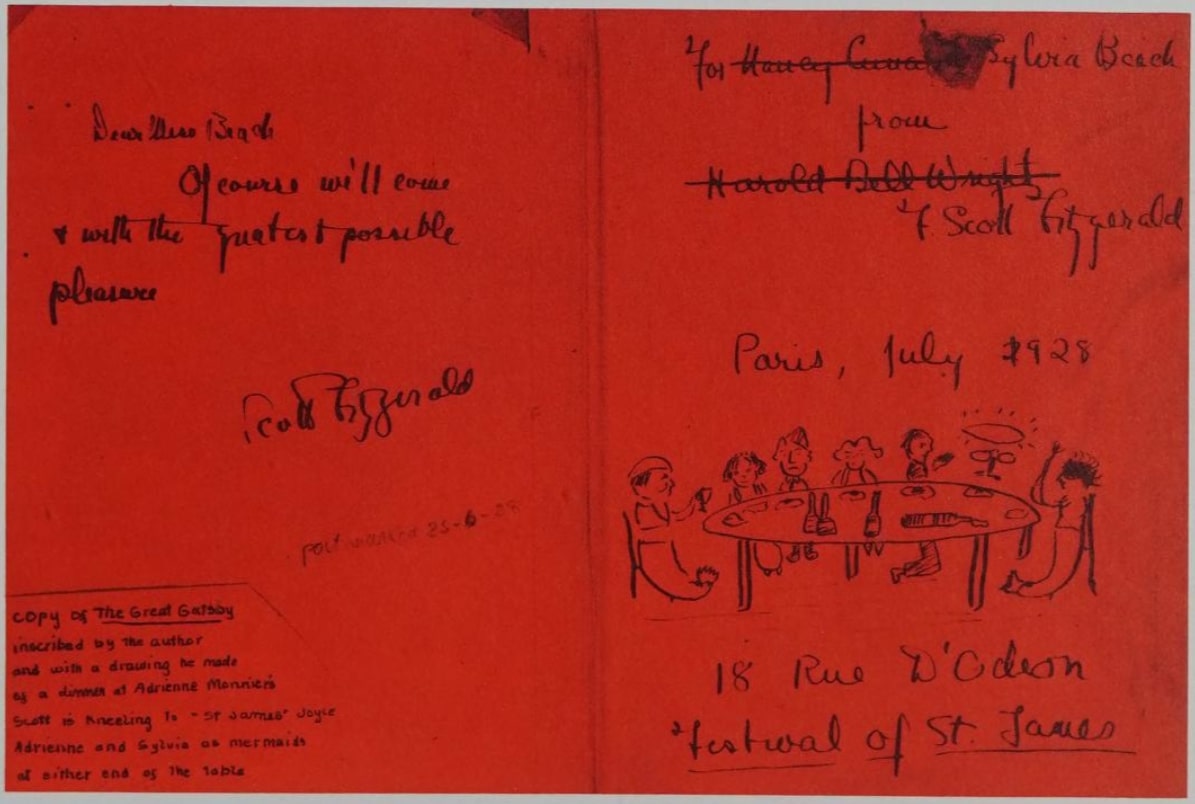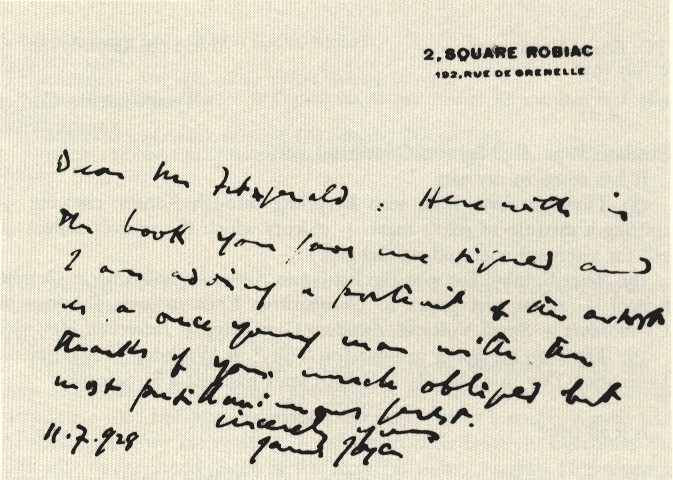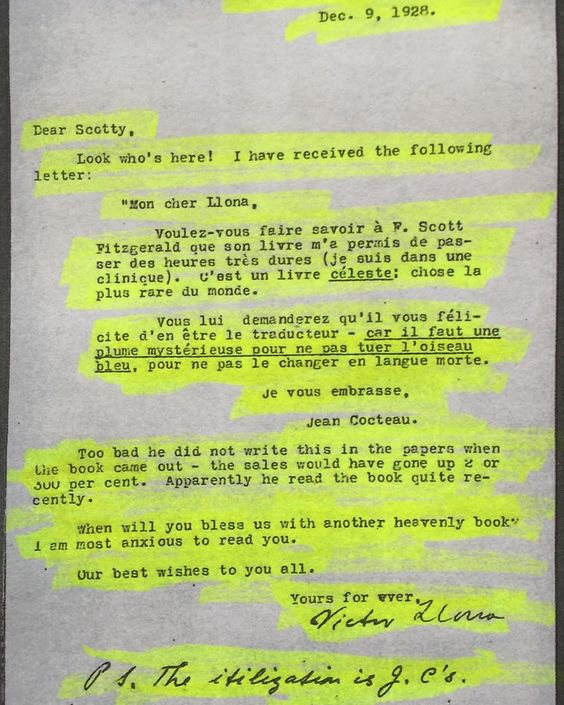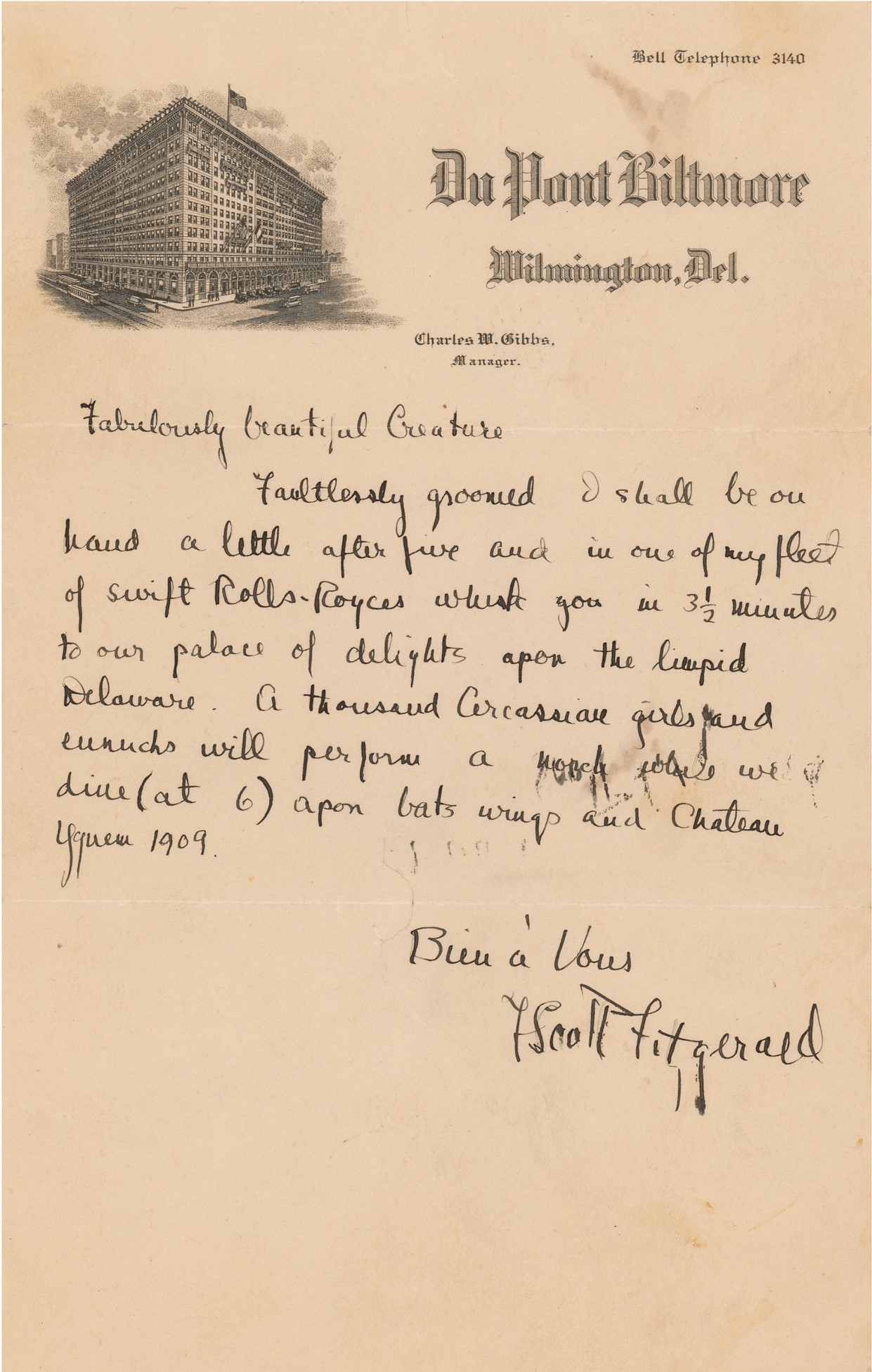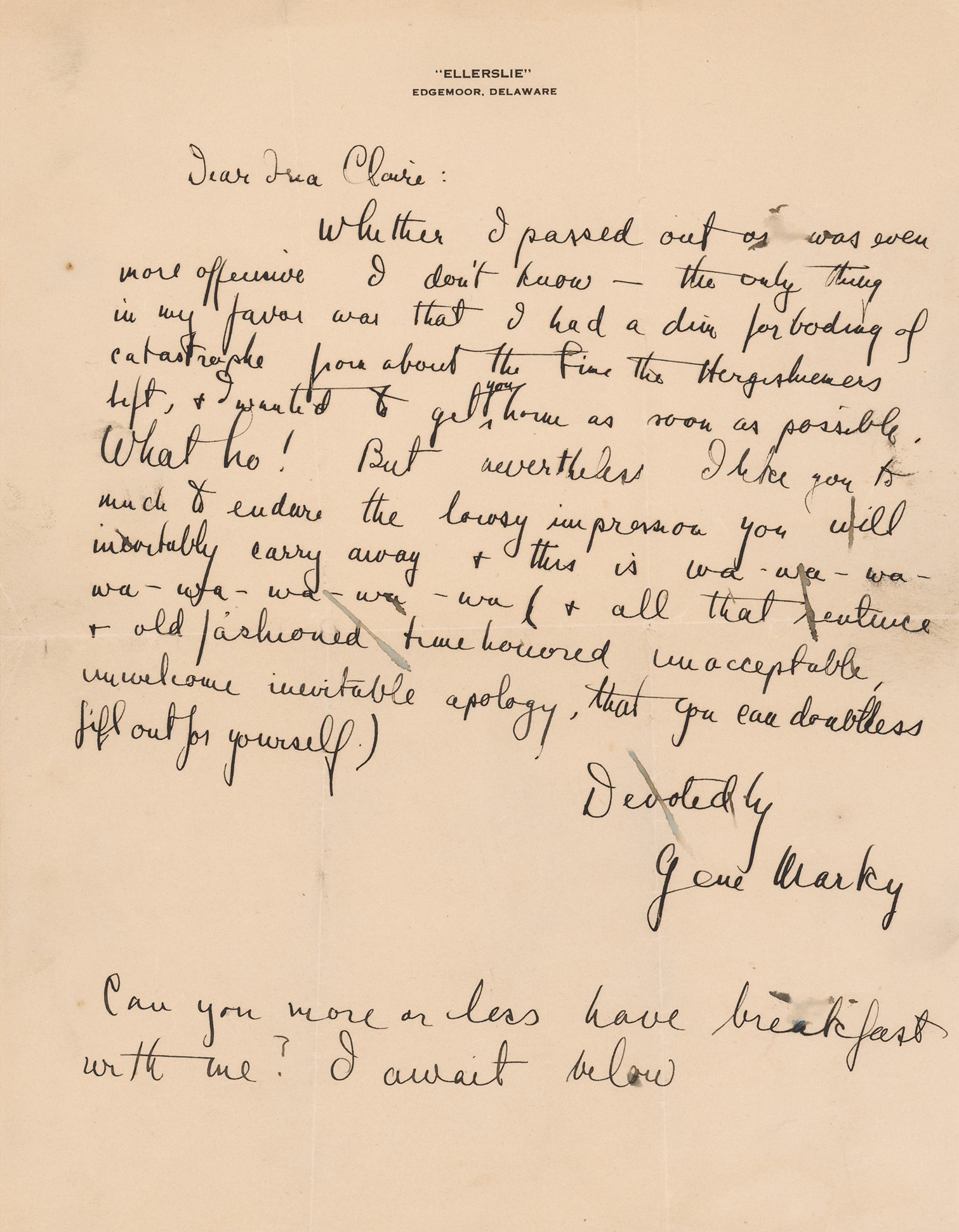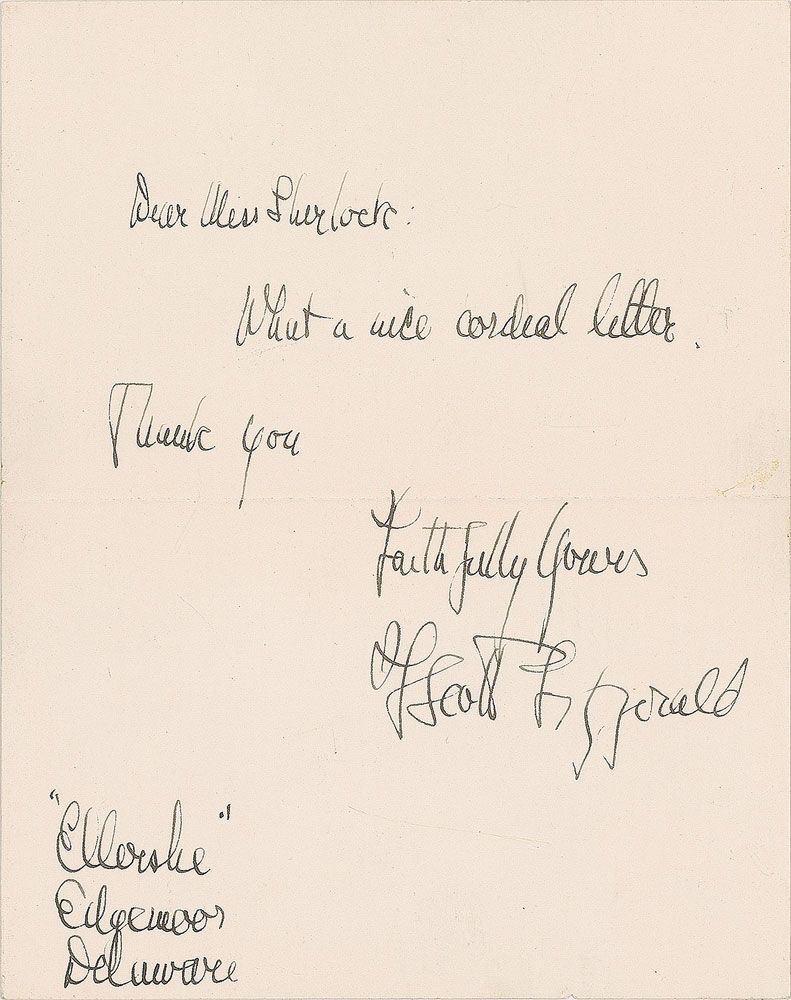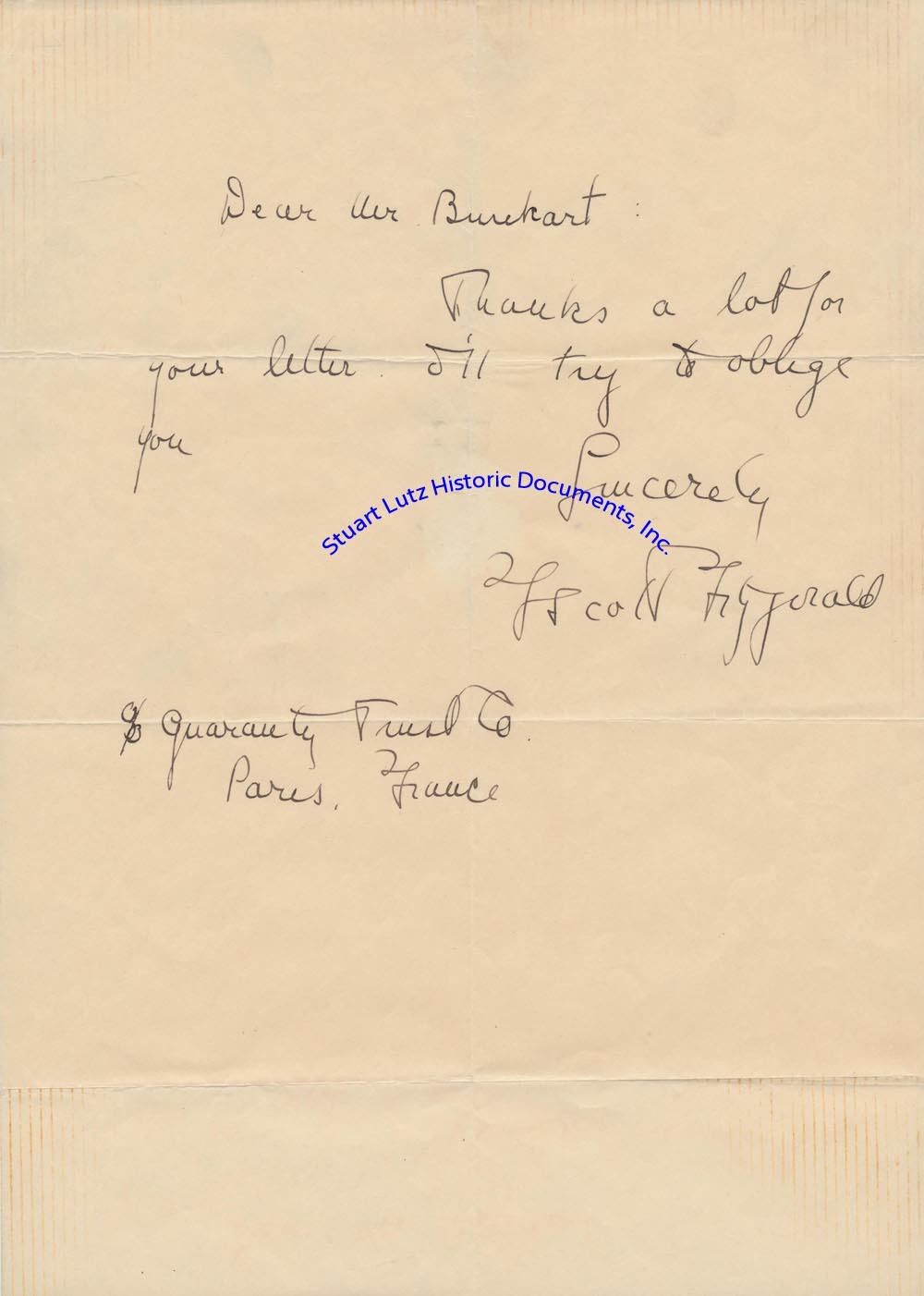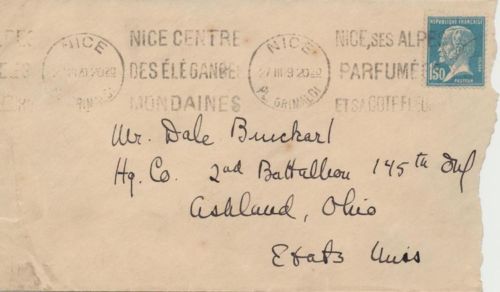
F. Scott Fitzgerald's Life In Letters
The Correspondence of F. Scott Fitzgerald
CONTENTS
Chapter 1: 1907–1919
Chapter 2: 1919–1924
Chapter 3: 1924–1930
Chapter 4: 1930–1937
Chapter 5: 1937–1940
Chapter 3: May 1924 – Spring 1930
xxx. TO: Thomas Boyd
May 1924
ALS, 6 pp. Princeton University
Grimm’s Park Hotel stationery. Hyeres, France
Dear Tom:
Your letter was the first to reach me after I arrived here. This is the lovliest piece of earth I’ve ever seen without excepting Oxford or Venice or Princeton or anywhere. Zelda and I are sitting in the cafe I’Universe writing letters (it is 10.30. P.M.) and the moon is an absolutely au fait Mediteraenean moon with a blurred silver linnen cap + we’re both a a little tight and very happily drunk if you can use that term for the less nervous, less violent reactions of this side.
We found a wonderful English nurse in Paris for $26.00 a month (My God! We paid $90.00 in New York) and tomorrow we’re going to look at a villa that has a butler + cook with it for the summer + fall. I have 100 feet of copper screen against the mosquitoes (we brought 17 pieces of baggage) + on the whole it looks like a gorgeous working summer.
We missed Edith Wharton by one day—she left yesterday for Paris + won’t return until next season. Not that I care, except that I met her in New York + she’s a very distinguished grande dame who fought the good fight with bronze age weapons when there were very few people in the line at all.
I’m going to read nothing but Homer + Homeric literature—and history 540–1200 A.D. until I finish my novel + I hope to God I don’t see a soul for six months. My novel grows more + more extraordinary; I feel absolutely self-sufficient + I have a perfect hollow craving for lonliness, that has increased for three years in some arithmetical progression + I’m going to satisfy it at last.
I agree with you about Bunny + Mencken—though with qualifications as to both. Bunny appreciates feeling after its been filtered through a temperment but his soul is a bit sec—and in beginning the Joyce cult on such an exalted scale he has probably debauched the taste of a lot of people—(who of course don’t matter anyhow)—but these unqualified admirations! Poor Waldo Frank!
My God! Do you know you once (its been a year) thought that Middleton Murray was an important man!
Paul Rosenfeld is quite a person—(he admires Sandburg though!)—+ the “Port of New York” is quite an adventure in our nervous critical entheusiasm; its nicer tho to be sitting here, to watch slow dogs inspect old posts. (I don’t kid myself Ive got away from anything except people in the most corporeal sense.)
Well, I shall write a novel better than any novel ever written in America and become par excellence the best second-rater in the world.
Good night old kid
F Scott Fitz—
P.S. Brentano’s (Paris) seems to have had some Thru the Wheat but are sold out—Max is entheusiastic about The Dark Cloud + promised to send it to me. I made a suggestion about brighter color in the jacket. Between you + me the background of the first proof suggested a story of the steel mills. It should be rather rich, I think, like Melvilles Moby Dick jacket. This is entre nous
For Christs sake don’t blame Scribners because of that ass Bridges. Perkins + Old Charles would make 20 Bridges bearable. What do you mean you lost $1200.00.
The Jellybean is junk! I’ve written a fine story called The Baby Party (a bit soft but good stuff) that will appear in Hearsts for July or August.
F.S.F
Message from Zelda → Hello Tom + Peggy
Notes:
Novelist and critic.
British critic.
Rosenfeld’s Port of New York: Essays on Fourteen American Modems (1924) treated writers, artists, and musicians.
1924 novel by Boyd.
xxx. TO: Robert Kerr
June 1924
ALS, 1 p. Doris K. Brown
Great Neck—I mean
St. Raphael, France
Villa Marie.
Dear Bob:
Thanks for your letter + for selling the membership many thanks indeed. 2 One hundred and fifty is more than I expected. I hope some time that I may be able to return the favor.
The part of what you told me which I am including in my novel is the ship, yatch I mean, + the mysterious yatchsman whose mistress was Nellie Bly I have my hero occupy the same position you did + obtain it in the same way. I am calling him Robert B. Kerr instead of Robert C. Kerr to conceal his identity (this is a joke—I wanted to give you a scare. His name is Gatsby).
Best to you all from all of us and again thanks enormously for your courtesy + your trouble
Sincerely
Scott Fitzg—
Notes:
2 Fitzgerald's membership in a Great Neck golf club.
Muckraking journalist who wrote sensational “inside” stories about such institutions as asylums and prisons; she is primarily remembered for her 1890 account of her successful attempt to travel around the world within eighty days.
As a boy Kerr had been befriended by yachtsman Edward Gilman, and Fitzgerald drew upon Kerr's experiences for Gatsby's association with Dan Cody. See Joseph Corso, “One Not-Forgotten Summer Night,” Fitzgerald/Hemingway Annual 1976.
xxx. TO: Horace Wade
circa June 1924
Postcard, addressed by Fitzgerald to the verso, with stamp and illegible postmark, Auction
Villa Marie, France
Letter to "Horace" [Wade], thanking him for sending an article and a "boost," Signed F. Scott Fitzgerald ...
Notes:
This postcard is likely sent from Fitzgerald while working on Gatsby and the "boost" likely a Wade article in Chicago on the young Fitzgerald.
xxx. TO Carl Van Vechten
From Turnbull.
Villa Marie, Valescure St. Raphael, France
[Probably June, 1924]
Dear Carl:
Your letter was one of the nicest compliments I've ever had. Thank you for a most cheerful half hour while I basked in the warmth of such generous praise. We shall be here until November 1st so don't neglect to send The Tatooed Countess 1 down to the last sardonic gargoyle on her navel.
We are living here in a sort of idyllic state among everything lovely imaginable in the way of Mediterranean delights. Unlike you I have only an occasional lust for the exotic streets of the metropolis—at present I am content to work and become excruciatingly healthy under Byron's and Shelley's and Dickens' sky. I will try to dig up a picture though God knows where. I have just received two furious letters from papists referring to “Absolution.” But yours is worth ten thousand of them.
Zelda sends her admiration and love to you both and I do too.
F. Scott Fitz——
Notes:
1 A novel by Van Vechten.
xxx. To Tom Boyd
ALS, 2 pages, Auction
Villa Marie, Valescure, St. Raphael, Var, France.
June 23d, 1924
Dear Tom:
Hyeres proved too hot for summer. I loved it but the bathing was bad and we couldn't find a new clean villa. So we're up the coast between St. Maxime and Cannes in a charming villa we've got until November 1st. I saw a lot of Hyere s during the week we were there the castle on the hill I liked especially there one day I met a twelve year old girl on the street whose face had been eaten off with congenital syphilis. She had the back of her head and in front of that nothing but a scab slit three times for her mouth and eyes It rather spoiled the street for me. Anyways after seeing Cannes, Hyeres, Nice, St. Maximes, and Antibes, I think St. Raphael (where we are) is the loveliest spot I ve ever seen. It s simply saturated with Shelley tho he never lived here. I mean its like the "Euganean Hills" and "lines written in Dejection" cooler than Hyeres, less tropical, less somnolent, perhaps less Romanesque still Frejus which has aqueducts and is both Roman and Romanesque is in sight of my window. We have bought a little Reynault car and Zelda and the baby and the Governess swim every day on a sandy beach in fact everything s idyllic and for the first time since I went to St. Paul in 1921 (the worse move I ever made in my life) I m perfectly happy. Lewis prosperity makes me boil with envy. I am only asking $25,000 or $20,000 for my novel. Its almost done. The man who sent the remembrance was the manager of your hotel at La Plage d Hyeres. I spoke to Paul R Reynolds about your work (he s my agent and the best in New York--The Post people came to see him every week. Liverite isn t any good) and he said he d like to try your stuff. Explain to him in your letter if you write him (70 5th Ave.) that your wrote Through the Wheat and are the man I spoke of. And if you send him anything that Liverite s had be sure to tell him everywhere it s been. Send me The Dark Cloud please with it appears. We expect to be in Europe three or four years maybe longer.
Yours ever,
F. Scott Fitz
Notes:
1 Sinclair Lewis.
2 Serial rights to The Great Gatsby were not sold. Fitzgerald declined $10,000 from College Humor.
3 Horace Liveright.
xxx. TO: Carl Van Vechten
Summer 1924
ALS, 1 p. New York Public Library
Villa Marie, Valescure St Raphael, France
Dear Carl:
The book1 is great and you were a mighty good egg to send it to me. I have only finished three chapters as Zelda has snatched it away but the resume of her past + the 1st “sketches” of Iowa as you call them (the Parcae, the Reception) ect. are unbeatable. I couldn't resist writing you this premature line to thank you.
As Ever Your Friend Scott Fitzg—
Notes:
1 The Tattooed Countess (1924).
xxx. TO: Ludlow Fowler
August 1924
ALS, 2 pp. Princeton University
Villa Marie, Valescure
St Raphael, France
Dear Lud: I knew there wasn’t a chance of seeing you when your trip was so short but I wrote a note to Sap asking him to drop in on us if he stayed over and got down this far. I sent it care of Eleanor Maurice, American Express. I wonder if he ever got it.
My novel is finished and I’m doing the last revision of it. We’ve had a quiet summer and are moving on in the fall either to Paris or Italy. I’m going to write another play and I hope it’ll be less disastrous than the last.
The real purpose of this letter is sordid + material is this. The field glasses you gave me were out of whack—they showed two ships instead of one and made the Olympic look as if it had 8 smokestacks which can’t be true according to the papers.
So I’m going to ask you to send mine to Ring Lardner, Steamship Paris, sailing Sept. 10th + he’ll bring them to me. And will you wrap a newspaper around them so the Captain won’t appropriate them for himself. About yours I’ll do just as you say—send them home by somebody or have them fixed in Paris and leave them at some definate place there so you can call for them on your annual jaunt last summer.
I remember our last conversation and it makes me sad. I feel old too, this summer—I have ever since the failure of my play a year ago. Thats the whole burden of this novel—the loss of those illusions that give such color to the world so that you don’t care whether things are true or false as long as they partake of the magical glory.
We both send our best love to you, Lud.
Scott
PS. Don’t forget the glasses—I’m awfully anxious to get them. I’m sorry I’ve been such a bother about it.
Notes:
Charles W. Donahoe, Newman School and Princeton classmate of Fitzgerald.
xxx. TO: Hazel McCormack
September 1924
ALS, 2 pp. Princeton University
Villa Marie, Valescure
St Raphael, France
Dear Patsy:
We’ve been here on the Medeteraenean since May and my novel is finished at last. The stories you objected to were nessessary—they arose from a complicated situation between the Post, Hearsts and me. Besides, some of them—“Absolution” (in the Mercury) “The Baby Party” (in Hearsts) are awfully good. So were “Rags Martin-Jones” and “The Sensible Thing” before two editors cut them to pieces. The Post stuff was pretty raw, I’ll admit.
My novel is wonderful. I’ve read to everyone within hearing (Seldes [the critic] Donald Stuart, Maxwell Struthers Burt, John Dos Passos + other literary gents who have done time with us and I hope it’ll be out in the Spring. We are waiting for the Ring Lardners to take a jaunt through Spain, largely so we can see a bullfight. Then I think we’ll spend the winter in Sorrento (where Shelley wrote the “West Wind” + “Lines written in dejection”); and Spring in Paris and perhaps next summer.
“In Granchester—in Grantchester”
(By all means read The Life of Shelley, or rather, Ariel if the English translation is good. I hear there is one. You’ll love it.) I went to school with Cyril Hume—I remember him as a little prig, son of the headmaster. But he’s turned out to be a nice fellow + I liked his book which he sent me—all except the rotten passages of polyphonic prose.
Zelda sends her very best + thanks you for the sweet compliment.
Thine F Scott Fitzgerald
Arn’t you the big swell with the typewriter!
Notes:
Village near Cambridge; setting for Rupert Brooke’s poem “The Old Vicarage, Grantchester.”
Author of the 1923 novel Wife of the Centaur.
xxx. To Tom Boyd
ALS, 1 p. Elizabeth B. Nash
[Late 1924 ?]
Guaranty Trust Co., Paris
Dear Tom:
I like the book enormously. First I'll say that. Not quite as well as the first because the style bothered me. Its not as simple as the first--"shore line like a woman s nick!" for example.
On the other hand its far bigger feat of imagination--something quite new and more in line with a big development. You might have been a one book man and written the other, but in this you show you have the novelists temperament of sticking within your own conceived scene-- instead of my talent which is merely to interest people the the accidental form of writing novels. I want to write you more but I m in the middle of my own last revision and I m about crazy with nervousness. I ll write again next week. Anyways the book interested me from beginning to end--its flights, the beautifully done idea of the slaves caught in Detroit all of it. Many congratulations.
As Ever,
Scott
Notes:
1 The Dark Cloud.
2 The Great Gatsby was published before Fitzgerald settled in Paris in May 1925. This letter was probably written from Rome in late 1924, using the Paris forwarding address.
xxx. To Baldwin
[1924]
The contents of this letter are unknown--it seems that this is the letter from Princetion Archive.
xxx. TO: Sidney Howard
Winter 1924
ALS, 1 p. University of California—Berkeley
Hotel Quirinal, Rome
Dear Sid:
Perkins sent us your book and I can't tell you how extraordinarily good I think the two middle stories are.2 Especially Transatlantique. I loved Mrs. Vietch too (the grandmothers attitude—with its absolute lack of any appeal to sentimentality) and so did Zelda. She was in fact the first who read the book. Transatlantic however was my favorite. It seems quite as good to me as Katherine Mansfield + Ruth Suckow—the only touch I objected to was when the good sport broke down and wept. But the pool auction, and the engineers story, and all about Harry were wonderful. I felt horribly like Harry all through.
Many congratulations and I hope it sells. Its nice to be able to write you with real entheusiasm because you've liked my books too. Please believe me I look forward to your doing some gorgeous things—if Mrs. Vietch had been only 10,000 words longer it might have been wise to publish it as a short novel + get the rather larger intention that that insures. However several short story books have made enormous hits lately + I hope this gets the attention it diserves. Zelda joins me in congratulations + best wishes
Sincerely
F Scott Fitzgerald
Notes:
2 Three Flights Up (1924) included “Mrs. Vietch: A Segment of Biography” and “Transatlantic.”
xxx. TO John Myers O'Hara
ALS, 1 p. University of Northern Iowa; [from Fitzgerald/Hemingway Annual, 1978]
[postmarked December 13, 1924]
Hotel des Princes Rome, Italy
Dear Mr. O’Hara
The Sapho followed me around Europe + reached me here. We had some people to dinner the night it came + we took turns reading it and almost finished the book. Its gorgeous—I’d always wanted to read Sapho but I never realized it would be such a pleasure as you’ve made it.
Thank you, + for your courtesy in sending me a copy thanks again
Sincerely F. Scott Fitzgerald
Notes:
2 The Poems of Sappho (1924).
xxx. TO: Rene Crevel
1924
Inscription in Joyce's The Dubliners.
For Rene Crevel
from a garruolous American who has just made ...
xxx. Inscription TO John Myers O'Hara
1924
Published in Antiquarian Bookman [7 July 1975], 99.
Inscription in This Side of Paradise.
For John Myers O'Hara who first introduced me to Sapho in his translations, with a thousand thanks. 'Much have I travelled in the Realms of gold'? his most cordially, F Scott Fitzgerald, Washington D.C.
xxx. TO: Mrs. A. D. Sayre
1924 (?)
Inscription in The Diary of Otto Braun (1924). Bruccoli.
Dear Mrs Sayre--I think you will love this book. I am simply wild about it.
Scott
Notes:
Otto Braun was a young German intellectual killed in the war.
1925
xxx. FROM: Ring Lardner
TL, 3 pp. Princeton University
Friday, January 9, 1925.
Dear Wops:—
You would get a lot more mail from me if you had a decent and permanent address. I hate to write letters and think all the time that they'll never get anywhere.
I have talked with Max Perkins several times since he received Scott's novel. He is very enthusiastic about it, saying it's much the best thing Scott has done since “Paradise,” that parts of it are inspired, and etc. He wasn't crazy to have anybody use it serially on account of the delay it meant in getting out the book, but he told me today that “College Humor” had made a good offer which he thought you might accept. “College Humor” seems to be l—y with money and careless of how it spends it—not knocking Mr. Fitzgerald. My brother was strong for the book and wanted “Liberty” to run it, but some of the other readers thought it was better as a book than it would be as a serial, meaning that it couldn't be arranged so that the reader would be left in suspense at the end of each installment.
I've been on the wagon since Armistice Day and Ellis1 and I have seen a lot of shows. Laurence Stallings' play is a bear, even with a few of the words left out.2 I see no reason why it shouldn't beat a record or come near it. Dorothy Parker's “Close Harmony” got great notices and was, we thought, a dandy play, but it flopped in three weeks. Dorothy, Beatrice Kaufman and Peggy Leech gave a party at the Algonquin six or seven weeks ago. I was enjoying an intellectual conversation with Mary Hay when Peggy tore me away to talk to a lady who seemed kind of lonely. The lady was Mrs. Ernest Boyd and I'd have been with her yet if June Walker hadn't come in with a bun and rescued me.
We got back from the other side (Europe) in time to see the Yale-Princeton game. Art Samuels was host to a huge party of us—Swopes, Brouns, etc.—at lunch at the Cottage club. The Princeton team, which had made a sucker of Harvard the Saturday before, acted on this occasion as if football was a complete surprise and novelty. We stood up all the way home and I swore it would be my last trip to old Nassau.
Instead of working on the ship coming home, as I intended, I did nothing but lap them up. But as soon as I was home and on the wagon, I wrote the five European articles in nine days.
I have quit the strip3 and Dick Dorgan is doing it, with help from Tad.4
The Society of Composers and Authors, of which Gene5 is president, gave him a clock for Christmas that must have cost $1000 at least.
Gene and Helen were over the other night and in the midst of one of Gene's stories, Helen said, “Stop picking your nose, sweetheart.” That's all the dirt I know.
Speaking of noses, Rube and Irma6 gave a New Year's Eve party to which 150 people were invited and 300 came. Rube said he never saw so many strangers in his life. Billy Seeman had a lot of the Follies people there to help entertain, but the affair was such a riot that little attention was paid to the entertainment. Ellis and I missed this party. Speaking of noses again, I was in the hospital having my antrum cut open. I'm nearly all right again now, I think, though if I get up suddenly or stoop over, a regular Niagara of blood pours forth from my shapely nostrils.
I took “Vanity Fair” (Thackeray's, not Crowninshield's) to the hospital with me and one day the nurse asked me what I was reading and I told her and she said, “I haven't read it yet. I've been busy making Christmas presents.”
Ellis is at present in Danville, Illinois, where her last brother is being married tomorrow to a gal named Bredehoft. I was kept at home by my nose. We are leaving next Tuesday, with the Grant Rices,7 for Miami and then Nassau, to be gone till nearly the first of March. Our address at Nassau will be New Colonial Hotel. I think I'll take up golf again, but won't stick to it if I don't like it.
And I think you've staid away long enough.
Mrs. Nell.
Notes:
1 Mrs. Lardner.
2 What Price Glory?
3 Lardner provided continuity for a syndicated comic strip, “You Know Me Al.”
4 Cartoonist Tad Dorgan.
5 Gene Buck.
6 Cartoonist Rube Goldberg and his wife.
7 Sportswriter Grantland Rice.
xxx. TO Ernest Boyd
From Turnbull.
Hotel des Princes Rome, Italy
February 1, 1925
Dear Ernest:
Your picture of me in Portraits, Real and Imaginary truly touched me. I was honestly delighted that I, or we, had pleased anybody enough so they could write about me (or us) like that. Of course it was indiscreet (you should see the letter I got today from Mother: “Who is this Ernest Boyd who seems to know so much about my boy?") but it is so delicately done that I'm sure it will fill the gay cafes with everybody who reads it. It made Zelda and I horribly homesick for New York. We'd love to go shooting out into space with you and Madeleine. We're tired of black shirts and dirty teeth and the parades of Pope __ the Sixth—tho, contrary to Madeleine's prediction, we thoroughly enjoyed St. Raphael last summer. Paris in the spring, as they say!
I read the whole book with the greatest pleasure, regretting that the “impressions” were so short, and liking especially A. E., Nathan, myself, Aesthete, Yeats and Beer. And, least, the critic. But God, it all sounded like home—and the $100,000 we're trying to save over here is still about $99,000 away.
My new novel appears in late March: The Great Gatsby. It represents about a year's work and I think it's about ten years better than anything I've done. All my harsh smartness has been kept ruthlessly out of it—it's the greatest weakness in my work, distracting and disfiguring it even when it calls up an isolated sardonic laugh. I don't think this has a touch left. I wanted to call it Trimalchio (it's laid on Long Island) but I was voted down by Zelda and everybody else.
Best love to you and Madeleine from both of us—and thank you for writing about me so pleasantly. I feel like an infinitely more genial soul than I did a week ago.
Scott Fitzg——
xxx. TO: Ludlow Fowler
March 1925
ALS, 2 pp. Princeton University
Capri, Italy Guaranty Trust Co. 1 Rue des Italiens Paris
Dear Lud:
This is a last desperate appeal. Twice I've written you in vain—have you or havn't you got my field glasses. If they are permanently mislaid do let me know—I shall accept the fact with equanimity as I had no business to make you responsible for them for six years. But I want to know because I need field glasses all the time over here and the ones you lent me are cross-eyed and myoptic and always have been. I don't mind buying a new pair because they add so to every excursion but I'd rather not if there's any chance of getting my own back in June. Are you coming over? What on God's earth has become of you?
Now, having bawled you out I'll give you the news. We've been over a year during which I've done a lot of work, saved money and had a facinating and most instructive time. We have spent the spring here in Capri but next month (April) we go to Paris for 8 mos. so adress me there.
I have written a fifteen thousand word story about you called The Rich Boy—it is so disguised that no one except you and me and maybe two of the girls concerned would recognize, unless you give it away, but it is in a large measure the story of your life, toned down here and there and symplified. Also many gaps had to come out of my imagination. It is frank, unsparing but sympathetic and I think you will like it—it is one of the best things I have ever one. Where it will appear and when, I don't as yet know.1
Question? How did Connie Bennet take Phil Plants engagement.2 Had they split up before? Is Judy Smith that 30 year-old prom trotter or another Judy Smith.
How of Virgina, Dot Mc[ ], Ada? The law business? Eleanor and Al? Your Mother? Powell? John Bishop and Ring Lardner send me my only news and I have none at all from you.
With all good wishes and hopes of seeing you in June.
Ever your Friend Scott
Notes:
1 Redbook (January and February 1926).
2 Plant, a millionaire playboy, married actress Constance Bennett in November 1925.
xxx. TO: S. D. Green
March-April 1925
ALS, 1 pp. Auctioned
Hotel Tiberio,
Capri, Italy
Dear Mr. Green:
Your letter followed me around Europe and reached me here. Tell them please how I regret this delay, and that I appreciate their interest and the fact that they have chosen me. I’m afraid my own career, which has been erratic and disordered, if seldom dull, would not be a very inspiring one to dilate on -- in fact my hope is that my own children will be better equipped for life and less trustful as to what their elders (including me) tell them. If I were to say anything it would be that each man’s truth is peculiar to himself and that nothing is worth believing as to conduct in life except that which you find out for yourself or at least confirm for yourself.
With best wishes to them and to you
Sincerely,
[signed]
F. Scott Fitzgerald
Notes:
The letter responding to a request by an American teacher S.D. Green to offer advice to his students.
xxx. FROM: Ring Lardner
March 24th. [1925]
TL, 3 pp. Princeton University
Dears Mr. and Mrs. F.—
Max Perkins reports that Mrs. F. is or has been sick, which we hope isn't true, but would like to know for sure.
I read Mr. F's book (in page proofs) at one sitting and liked it enormously, particularly the description of Gatsby's home and his party, and the party in the apartment in New York. It sounds as if Mr. F. must have attended a party or two during his metropolitan career. The plot held my interest, too, and I found no tedious moments. Altogether I think it's the best thing you've done since Paradise.
On the other hand, I acted as volunteer proof reader and gave Max a brief list of what I thought were errata. On Pages 31 and 46 you spoke of the news-stand on the lower level, and the cold waiting room on the lower level of the Pennsylvania Station. There ain't any lower level at that station and I suggested substitute terms for same.1 On Page 82, you had the guy driving his car under the elevated at Astoria, which isn't Astoria, but Long Island City.2 On Page 118 you had a tide in Lake Superior3 and on Page 209 you had the Chicago, Milwaukee & St. Paul running out of the La Salle Street Station.4 These things are trivial, but some of the critics pick on trivial errors for lack of anything else to pick on.
Michael Arlen, who is here to watch the staging of The Green Hat, said he thought How To Write Short Stories was a great title for my book and when I told him it was your title, he said he had heard a great deal about you and was sorry to miss you. He also said he had heard that Mrs. Fitzgerald was very attractive, but I told him he must be thinking of somebody else. Mike is being entertained high and low. He was guest of honor at a luncheon given by Ray Long.5 Irv Cobb6 and George Doran7 sat on either side of him and told one dirty story after another. Last Sunday night he was at a party at Conde Nast's, but who wasn't? I was looking forward to a miserable evening, but had the luck to draw Ina Claire8 for a dinner and evening companion and was perfectly happy, though I regretted being on the wagon. The last previous time I saw her was at the Press Club in Chicago about eight years ago and she says I was much more companionable on that occasion. George Nathan said he heard you were coming home soon. George, they say, is quitting the associate editorship of the Mercury, but will continue to write theaters for it.
So far as I know, Zelda, Mary Hay9 and Richard are still together; they were when I met them.
Beatrice Kaufman and Peggy Leech have gone abroad.
We had a dinner party at our little nest about two weeks ago; the guests were the Ray Longs, the Grantland Rices, June Walker10 and Frank Crowninshield. As place cards for Ray, Crownie and Grant, we had, respectively, covers of Cosmopolitan, Vanity Fair and The American Golfer, but this didn't seem to make any impression on June and right after the soup she began knocking Conde Nast in general and his alleged snobbishness in particular. Finally Crownie butted in to defend him and June said, “What do you know about him?” “I live with him,” said Crownie. “What for?” said June. “Well,” said Crownie, “I happen to be editor of one of his magazines, Vanity Fair.” “Oh!” said June. “That's my favorite magazine! And I hate most magazines! For instance, I wouldn't be seen with a Cosmopolitan.” After the loud laughter had subsided, I explained to her that Ray was editor of Cosmopolitan. “I'm always making breaks,” she said, “and I guess this is one of my unlucky evenings. I suppose that if I said what I think of William R. Hearst, I'd find that even he has a friend here or something.”
The annual Dutch Treat show11 comes off this week. I have a sketch in it which is a born flop.
I met Gene on the train the other day and he said, “Come over and play bridge with us tonight,” and I said I couldn't because Arthur Jacks was coming to our house. When I got home, I called up Arthur to inform him of this and he said it was tough luck, but it just happened that he had been invited, several days before, to dine at Gene's that very night.
Write.
Bob Esselstyn.
Notes:
1 These changes were not made.
2 This change was not made.
3 Fitzgerald changed “ebb-tide” to “wind.”
4 The La Salle Street Station was changed to Union Station.
5 Hearst magazine editor.
6 Irvin S. Cobb.
7 Partner in Doubleday, Doran.
8 Actress.
9 Actress married to movie actor Richard Barthelmess.
10 Actress.
11 New York club for writers and artists.
xxx. TO: Willa Cather
Late March/early April 1925
ALS, 1 p. Princeton University
Hotel Tiberio, Capri, Italy
My Dear Miss Cather:
As one of your greatest admirers—an admirer particularly of My Antonia, A Lost Lady, Paul’s Case and Scandal I want to write to explain an instance of apparent plagiarism which some suspicious person may presently bring to your attention.
To begin with, my new book The Great Gatsby will appear about the time you recieve this letter (I am sending you the book besides). When I was in the middle of the first draft A Lost Lady was published and I read it with the greatest delight. One of the finest passages is the often-quoted one toward the end which includes the phrases “she seemed to promise a wild delight that he has not found in life… “I could show you” … ect (all misquoted here as I have no copy by me).
Well, a month or two before I had written into my own book a parallel and almost similar idea in the description of a woman’s charm—an idea that I’d had for several years. Now my expression of this was neither so clear, nor so beautiful, nor so moving as yours but the essential similarity was undoubtedly there. I was worried because I hated the devil to cut mine out so I went to Ring Lardner and several other people and showed them mine and yours and finally decided to retain it. Also Ive kept the pages from my first draft to show you and am enclosing them here. The passage as finally worked out is in my Chapter One. Hoping you will understand my motive in communicating this to you I am
With Best Wishes and Most Sincere Admiration
F. Scott Fitzgerald
Notes:
See A Lost Lady (New York: Knopf, 1923), pp. 171–72.
On April 28 Cather wrote Fitzgerald that she had enjoyed reading The Great Gatsby before receiving his letter and had detected no duplication of A Lost Lady.. The reply is in Fitzgerald's scrapbook. See Bruccoli, " An instance of Apparent Plagiarism': F Scott Fitzeerald, Willa Cather, and the first Gatsby manuscript".
xxx. TO: Carl Van Doren
April 1925
Unlocated
Inscription pasted in The Great Gatsby. Capri, Italy
Dear Mr. Van Doren:
This is really not a moral boo. I swear before God that if it seems to be I’m going to a psychoanalist.
F Scott Fitzgerald
xxx. FROM: H. L. Mencken
April 16th [1925]
TLS, 1 p. Scrapbook. Princeton University
Dear Fitz:—
“The Great Gatsby” fills me with pleasant sentiments. I think it is incomparably the best piece of work you have done. Evidences of careful workmanship are on every page. The thing is well managed, and has a fine surface. My one complaint is that the basic story is somewhat trivial—that it reduces itself, in the end, to a sort of anecdote. But God will forgive you for that.
I'll probably do a review of it for the Chicago Tribune, which supplies 25 or 30 papers, with a total circulation of 3,000,000.1 I assume that one reader in every 30,000 will read the review.
You are missing many spiritual immensities by staying away from the Republic. Future generations will look back to the Coolidge era as upon a Golden Age. I wake up every morning with a glow of anticipation, and am roaring with mirth by the time my senile tea and Zwieback come on.
Yours in Xt., H L Mencken
Notes:
1 Mencken's review appeared in the Baltimore Evening Sun (2 May 1925) and was syndicated in other papers.
xxx. FROM: Roger Burlingame
Before 19 April 1925
ALS, 2 pp. Scrapbook. Princeton University
Dear Scott:
I can't help writing you how grand I think the Gatsby is; I've read it twice now and I'm going to read it again and I've got to like a book something terrible to read it 3 times.
Of course I liked The Beautiful + D. + I suppose, in a way, that is a more substantial novel, but nowhere have you ever touched the warmth and living quality of this Gatsby; or its beauty or its strange nostalgia or its amazing color.
In the: “For Daisy was young and her artificial world was redolent … etc.,” you have done something that I think no one will ever do better. That's so damn beautiful it hurts + makes you cry out with pain. The one after too, is good but nothing in the book or any where that I know is so adequate for that particular thing. It does so much. It gives in 11 lines that whole phase of her life, of anyone's, of everyone's life. It's tremendous.
I could go on for a long time quoting things that delight me. The beginning of Ch. II, for instance, + that gorgeous place where she cried into the shirts, + the night “when we hunted through the great rooms for cigarettes.”
Someone said once that the thing that was common to all real works of art was a nostalgic quality, often indefinable, not specific. If that is so then The Great Gatsby is surely one because it makes me want to be back somewhere as much, I think as anything I've ever read.
Congratulations!
As ever
Roger Burlingame
xxx. TO: Roger Burlingame
19 April 1925
ALS, 2 pp. Syracuse University
Dollar Steamship Line/ S.S. President Garfield letterhead
(Bound from Naples to Marsielle en route to Paris
April 19th, 1924
Dear Roger:
I think that's about the nicest letter I ever recieved about my work. I was tremendously pleased that it moved you in that way “made you want to be back somewhere so much” because that describes, better than I could have put it myself, whatever unifying emotion the book has, either in regard to the temperment of Gatsby himself or in my own mood while writing it. Thank you so much for taking the trouble to write.
As yet I know nothing. Zelda has been too sick for the long overland trip to Paris in our French Ford so we had to catch a boat on a days notice to get the car back to France within the 6 mos. period of the International touring arrangement. (She's better now—Italy depressed us both beyond measure—a dead land where everything that could be done or said was done long ago [for whoever is decieved by the pseudo activity under Mussolini is decieved by the spasmotic last jerk of a corpse. In these days of critisism it takes a weak bunch of desperates to submit for 3 years to a tyrant, even a mildly benificent one]—) .1
—but leaving suddenly I have heard nothing about Gatsby—nothing except you and Ring since Perkins letters three months ago. I don't know how many were printed or what advance orders or what notices or advertising not to mention reviews tho by this time all that information is probably waiting for me in Paris, having been forwarded from Capri. (By the way will you ask Max to pass on any movie nibbles to Reynolds)
Thank you again and again for your letter. I shall always keep it.
Scott Fitz—
Guaranty Trust Co. 1-3 Rue des Italiennes Paris. France
Notes:
1 Fitzgerald's brackets.
xxx. FROM: Van Wyck Brooks
April 22d 1925
ALS, 3 pp. Scrapbook. Princeton University
Westport, Connecticut
Dear Fitzgerald:
It was ever so kind of you to send me “The Great Gatsby.” I have just read it, with the greatest delights, and it seems to me by far the best thing you've done—certainly a real creation and one that leaves in the mind a most haunting impression. Your values are so true, although that isn't what makes the book so appealing: it is merely the thing full of glamour, and so it is—your own kind—this time for me more glamorous than ever.
I am sending you my book on Henry James1 because you spoke in such a friendly way of the opening chapters. I hope it will not strike you as too bleak. It is the last thing of the kind I mean to do. Next time I hope to give you something more “constructive,” as they say.
Capri must be wonderful now. I knew every inch of the island once. Have you been up to the little church on the top of Monte Solaro. And do they still have there those pictures at the stations of the cross that were lithographed in Bleeker street, New York?
Won't you remember me most kindly to your wife and believe me, with thanks and warm regards, Yours sincerely,
Van Wyck Brooks
Notes:
1 The Pilgrimage of Henry James (1925) which he inscribed: “For Scott Fitzgerald. With friendly greetings Van Wyck Brooks April 22nd. 1925.” (Princeton)
xxx. FROM: James Branch Cabell
2 May 1925
TLS, 1 p. Scrapbook. Princeton University
My dear Scott Fitzgerald:
It was good of you to send me The Great Gatsby. But it is upon another count that I am most grateful to you,—upon the count that you have here written a solidly and sharply excellent book.
It is, I think, coherent and individual and clean-cut, in a fashion—if you don't mind,—wholly unpredicted by your earlier work. And it is full, too, of good bits. That last glimpse of Daisy and Tom, in particular,—I mean, upon page 174 5,—surprises and, in a half-instant, delights.
Altogether, I tender you my most cordial congratulations upon this book,—and am
Yours faithfully, James Branch Cabell
xxx. TO: James Branch Cabell
After 2 May 1925
ALS, 1 p. Princeton University
14 Rue de Tillsit (sp.) Paris,
Dear Mr. Cabell:
Thank you for writing me such a nice letter about my novel. I know it (the letter) by heart and carry it around constantly to show people. I'm afraid the book isn't a popular success but two or three letters, of which yours is one, have made it a success for to me.
Sincerely
F Scott Fitzgerald
xxx. TO: H. L. Mencken
ALS, 2 pp. Enoch Pratt Free Library
14 Rue de Tilsitt
Paris, France
May 4th, 1925
Dear Menk—
Your letter was the first outside word that reached me about my book. I was tremendously moved both by the fact that you liked it and by your kindness in writing me about it. By the next mail came a letter from Edmund Wilson and a clipping from Stallings, both bulging with interest and approval, but as you know I’d rather have you like a book of mine than anyone in America.
There is a tremendous fault in the book—the lack of an emotional presentment of Daisy’s attitude toward Gatsby after their reunion (and the consequent lack of logic or importance in her throwing him over). Everyone has felt this but no one has spotted it because its concealed beneath elaborate and overlapping blankets of prose. Wilson complained: “The characters are so uniformly unpleasant,” Stallings: “a sheaf of gorgeous notes for a novel” and you say: “The story is fundamentally trivial.” I think the smooth, almost unbroken pattern makes you feel that. Despite your admiration for Conrad you have lately—perhaps in reaction against the merely well-made novels of James’ imitators—become used to the formless. It is in protest against my own formless two novels, and Lewis’ and Dos Passos’ that this was written. I admit that in comparison to My Antonia and The Lost Lady it is a failure in what it tries to do but I think in comparison to Cytherea or Linda Condon it is a success. At any rate I have learned a lot from writing it and the influence on it has been the masculine one of The Brothers Karamazov, a thing of incomparable form, rather than the feminine one of The Portrait of a Lady. If it seems trivial or “anecdotal” (sp) it is because of an aesthetic fault, a failure in one very important episode and not a frailty in the theme—at least I don’t think so. Did you ever know a writer to calmly take a just critisism and shut up?
Incidently, I had hoped it would amuse the Mencken who wrote the essay on New York in the last book of Prejudices—tho I know nothing in the new Paris streets that I like better than Park Avenue at twilight.
I think the book is so far a commercial failure—at least it was two weeks after publication—hadn’t reached 20,000 yet. So I rather regret (but not violently) the fact that I turned down $15,000.00 for the serial rights. However I have all the money I need and was growing rather tired of being a popular author. My trash for the Post grows worse and worse as there is less and less heart in it—strange to say my whole heart was in my first trash. I thought that the Offshore Pirate was quite as good as Benediction. I never really “wrote down” until after the failure of the Vegetable and that was to make this book possible. I would have written down long ago if it had been profitable—I tried it unsuccessfully for the movies. People don’t seem to realize that for an intelligent man writing down is about the hardest thing in the world. When people like Hughes and Stephen Whitman go wrong after one tragic book it is because they never had any real egos or attitudes but only empty bellies and cross nerves. The bellies full and the nerves soothed with vanity they see life rosily and would be violently insincere in writing anything but the happy trash they do. The others, like Owen Johnson, just get tired—there’s nothing the matter with some of Johnson’s later books—they’re just rotten that’s all. He was tired and his work is no more writing in the sense that the work—Thomas Hardy and Gene Stratton Porter is writing than were Driesers dime novels.
However I won’t bore you any longer. I expect to spend about two years on my next novel and it ought to be more successful critically. Its about myself—not what I thought of myself in This Side of Paradise. Moreover it will have the most amazing form ever invented.
With many, many thanks
F. Scott Fitzg——
P.S. This is simply an acknowledgment and expects no answer.
P.S. Italy (but not France) is full of Pilsen and Munich beer of fine quality. There is less than there was when I got there.
Notes:
Novels by Joseph Hergesheimer.
Rupert Hughes, The Thirteenth Commandment (1916), and Stephen French Whitman, Predestined (1910).
Author of stories about Lawrenceville School and Stover at Yale (1912), Johnson also wrote adult novels about the privileged classes.
Porter wrote popular fiction.
xxx. TO: Lewis Somers Frambes Jr.
ALS, 1 pp. [Sold at Heritage Auction in 2013]
Postmarked May 14, 1925
14 Rue de Tilsitt
Paris, France
Dear Mr. Frambes
Thank you very much for your most kind and cordial expression of opinion about Gatsby. I'm afraid its not going to appeal to many people as its rather a bitter dose and so I particularly value such a pleasant and frank statements that it does appeal to a few.
Sincerely
F. Scott Fitzgerald.
xxx. TO: Hazel McCormack
Postmarked May 15, 1925
ALS, 2 pp. Princeton University
14 Rue de Tilsitt
Paris, France
Dear Patsy—Thanks enormously for your kind note—One from Mencken and a handful of fairly intelligent reviews arrived in the same mail and did a lot to lift me up from the wearying fact that it isn’t going to sell. Not like the others, I mean, which automaticly condemns me to 6 months of canned rubbish for the popular magazines. Thank you for likeing Love in the Night too. I didn’t like it.
Gatsby was far from perfect in many ways but all in all it contains such prose as has never been written in America before. From that I take heart. From that I take heart and hope that some day I can combine the verve of Paradise, the unity of the Beautiful + Damned and the lyric quality of Gatsby, its aesthetic soundness, into something worthy of the admiration of those few——God, I am inextricably intangled in that sentence, and the only thing to do is to start a new one. Anyhow, thanks.
We have taken an appartment in the Rue de Tillsit near the Etoile for 8 months and I have taken a studio near by to write in. We’re glad to leave Italy and Paris in the Spring is no easy place to settle down to work. In fact most of our time is taken up in dodging our friends, most of whom seem to be over here. About July I’m starting a new novel.
About my life in general I can refer you to the following gems of biography.
F. Scott Fitzgerald—by Edmund Wilson—In “The Literary Spotlight” (Doran)
"— " Paul Rosenfeld—In “Men Seen” (Dial Press)
"— " Ernest Boyd—In “Portraits Real + Imaginary” (Appleton) I think
"— " Bee Wilson—In “Smart Set” early in 1924
"— " Himself—In Who’s Who in Sat. Eve. Post late in 1920
or early ” 1921
And such articles of my own as you’ve seen like “How to Live on 36,000 a year”, its sequeal, “What I Think + Feel at 25” ect. not to mention a book called This Side of Paradise which is what a most egotistic young man thought of himself at twenty-two (or was it sixteen).
I enclose you a picture of a naked woman—who, much to my shame is not a member of the Folies Bergere but my own daughter.
Please send me any stories ect. that you publish and thanks again for the letter.
As Ever Your Friend
F Scott Fitzg
xxx. FROM: Alexander Woollcott
May 15 [1925]
ALS, 1 p. Scrapbook. Princeton University
Dear Scott,
This is a line to report that I read “The Great Gatsby” with the deepest interest. It is, I think, your best job by a long jump. I have the profoundest respect for the man who could write it
A. Woollcott
xxx. TO: William C. Lengel
[May 19, 1925]
ALS, 1 p., Auction
14 Rue de Tilsitt, Paris, France
Dear Lengel
Thanks for your letter about Gatsby. Have just had a wire from Brady asking for dramatic rights and wired my agent asking him to see what Brady's plans are—all this before your letter came, as it went to Cannes & Homer Croy whom I've never met. As soon as I get any word I will let you know. Perhaps he has no one in mind for the dramatization & in that case it would much better [sic] if it were done by someone like you who already has some plan in his head. With many thanks.
F. Scott Fitzgerald
Dear Lengel:
Word has just come that Owen Davis is going to do it for Brady. Thanks many times for your interest.
F. S. F.
xxx. FROM: Gilbert Seldes
26th of May [1925]
TLS, 1 p.1 Scrapbook. Princeton University
My dear Scott:
Of course you know that you have written a fine book; but it may be news to you that we know it too. Amanda and I are madly enthusiastic about it, and some of that has gone into a very severely analytical boost of the truly great Gatsby for The Dial.2 (It probably won't be out for months, but I am doing a little propaganda elsewhere.) It's so good, Scott; so satisfying, and so rich in stuff. And written; and by the Lord, composed; it has structure and direction and an internal activity.
I'm told it's going well, but the reviews, apart from Mencken and Bill Benet3 have made me sour. Van Wyck Brooks and Paul Rosenfeld told me they admire it; from Bunny you've no doubt heard; and your admirer, and the best critic hereabouts (Mrs Mary Colum) is doing it for the New Republic so you'll have some sort of a press. For God's sake Scott, if it doesn't go well, don't be persuaded not to go on with this, your real line of genius. I hope you're writing another already, and that it is as good.
I trust I suggest, in a way, my enthusiasm.4
Gilbert
Notes:
1 Cut by Fitzgerald from a longer letter.
2 Seldes' review appeared in the August 1925 issue of The Dial.
3 William Rose Benet.
4 See Fitzgerald's June letter to Seldes
xxx. TO H. L. Mencken
From Turnbull.
14 rue de Tilsitt Paris, France
[May or June, 1925]
Dear Menck:
The idea is fascinating and I'll try it when we go to Brussels in July. I've got two pieces of hack work to do first. I thought the Spring Flight 1 was great—it needed some cutting tho, and I have no feeling that he has another book in him. That must have all been true. Also I liked The Constant Nymph 2 but I thought The Apple of the Eye was lousy.
By the way you mention in your review of Sea Horses that Conrad has only two imitators. How about
|
O'Neill in Emperor Jones |
(Heart of Darkness) |
|
Hergesheimer in Bright Shawl |
(Java Head) |
|
Me in Gatsby |
(God! I've learned a lot from him) |
|
Maugham in The Moon and Sixpence |
(You mentioned it in your own review, five years ago) |
But his (Conrad's) approach and his prose is naturally more imitated than his material, tho he did send [at] least O'Neill and Masefield to sea in ships.
As ever,
Robert Chambers Fitzgerald (according to Rascoe)
Notes:
1 By Lee J. Smits.
2 By Margaret Kennedy.
xxx. TO: Sidney Howard
Spring 1925
ALS, 1 p. University of California—Berkeley
14 Rue de Tilsitt Paris
Dear Sid:
Many thanks for They Knew What They Wanted1 which after an adventurous buffeting here and there was finally forwarded to me here from Capri. I read it immediately and with greatest pleasure, moved throughout and easily understanding how it has achieved its great success. I think in life she would have kept on staying with Joe but of course that would have made the idea of her being taken back profoundly unsympathetic. A thousand congratulations—I only hope the reception of the play won't keep you from writing more Transatlantic's and Mrs. Veach's.
As Always, Your friend F. Scott Fitzg—
Notes:
1 Howard's play, produced in 1924.
xxx. FROM: George Jean Nathan
Spring 1925
ALS, 1 p. Scrapbook. Princeton University
Dear Scott: A thousand congratulations! “The Great Gatsby” is an excellent job. It is leagues in advance of anything you have ever done.
As ever, George Jean Nathan.
xxx. TO: Thomas Boyd
Spring/Summer 1925
ALS, 1 p. Princeton University
14 Rue de Tilsitt Paris, France
Dear Tom:
You malign me. I am a faithful and punctilious correspondent. I wrote you that I was crazy about Points of Honor.1 Since then I have read them both over (I must have given away 2 doz. copies of Through the Wheat.) and I think they are about my favorite modern books. Feeling the war, as one still does over here, they grow in stature.
I am anxiously awaiting Samuel Drummund—2 of course in choosing a field that so many men + women from Zola + Hardy to Shiela Kaye-Smith have tilled you set yourself a problem—that is you must bring twice as much freshness, data and communicable emotion to it to make it absorbing, as those who like Geo. Elliot first saw something in the subject, were required to do. No doubt you have—I hope so and I'm looking forward with enormous interest. Did you agree with me that The Apple of the Eye4 was a big fake?
Was your description of Mrs. Sinclair Lewis sincere or ironic? I've always heard she was a pretentious fright.5
Sorry you didn't like Gatsby—and thank you for being so nice about concealing the fact (I mean this); I think you're wrong but time will tell.
Ever your Friend Scott
Watch for a book by young Ernest Hemminway.
Notes:
1 Boyd's collection of war stories published by Scribners in March 1925.
2 Boyd's novel (Scribners, 1925).
3 Sheila Kaye-Smith, English regional novelist.
4 A 1924 novel by Glenway Wescott.
5 Grace Hegger Lewis.
xxx. TO: Joseph Hergesheimer
May/June 1925
ALS, 1 p. University of Texas—Austin
14 Rue de Tilsitt Paris, France
Dear Hergeshiemer:
Scribners forwarded me a copy of the letter you were kind enough to write about The Great Gatsby. Thank you for what you said about it as well as for the permission you so courteously gave to use your opinion. I'm afraid its a financial failure and I enclose you one of comments which may interest you. I don't do Rascoe's1 intelligence to think he really believes I am like Chambers—La Cousine Bette or Linda Condon could be “critisized” on the same grounds, if one wanted to make out such a preposterous case—the trouble is that we snubbed his wife. None the less I find the enclosure rather saddening.
Looking forward to From an Old House of which I've read with delight the three parts I came across in Italy.
Again thank you, and most cordial good wishes
Scott Fitzg—
Excuse the blots!
I'm awfully anxious to see the Dower House.2 You promised to invite us but never did.
Notes:
1 Burton Rascoe's comment on The Great Gatsby has not been identified.
2 Hergesheimer's Pennsylvania home.
xxx. TO: T. R. Smith
Late May 1925
ALS, 1 p. Collection of Mania and Maurice Neville
14 Rue de Tilsitt
Paris, France
Dear Tom:
Thank you many times for your kind letter about Gatsby. I’m afraid its not going to sell like the others but I’m delighted at the response from the people who care about writing.
Now as to the publishing business. Max Perkins is one of my closest friends + my relations with the Scribners in general have always been so cordial and so pleasant that I couldn’t imagine breaking them. But as I told you once before if anything should happen to make our relations impossible I should certainly come to your firm, and I know we’d get along.
But it would be a monoply in restraint of trade. You already have the only other two Americans under thirty who promise a great deal—Hemminway + Cummings. / But please don't quote this about them; I don't want to step on the toes of two other particular friends. / I hope the former's book succeeds + will be glad to review it for any paper you might select.
We'll be here in Paris the rest of 1925 and, we sometimes hope, forever.
Best regards to Horace.
As Ever, Your Friend,
Scott Fitzg——
xxx. TO: Gertrude Stein
Before 22 May 1925
Inscription in The Great Gatsby (1925). Yale university.
Paris
Notes:
Hemingway took too the Fitzgeralds to meet the Gertrude Stein shortly after their arrival to Paris.
xxx. From Gertrude Stein
ALS, 4 pp. Scrapbook. Princeton University, [from The Crack-Up, 1945]
Hotel Pernollet Belley (Ain) Belley, le
22 May, 192-[1925]
My dear Fitzgerald
Here we are and have read your book and it is a good book. I like the melody of your dedication1 it shows that you have a background of beauty and tenderness and that is a comfort. The next good thing is that you write naturally in sentences and that too is a comfort. You write naturally in sentences and one can read all of them and that among other things is a comfort. You are creating the contemporary world much as Thackery did his in Pendennis and Vanity Fair and this isn't a bad compliment. You make a modern world and a modern orgy strangely enough it never was done until you did it in This Side of Paradise. My belief in This Side of Paradise was alright. This is as good a book and different and older and that is what one does, one does not get better but different and older and that is always a pleasure. Best of good luck to you always, and thanks so much for the very genuine pleasure you have given me. We are looking forward to seeing you and Mrs. Fitzgerald when we get back in the Fall. Do please remember me to her and to you always
Gtde Stein.
I find that at the last moment of departure I did not copy your address into my address book, and so am sending this care of Hemingway. do give it to me again.
G.S.
Notes:
1 The Great Gatsby was dedicated: once again to zelda.
2 See Fitzgerald's June 1925 letter to Stein in Letters.
xxx. From H. L. Mencken To F. Scott Fitzgerald
Letters of H. L. Mencken, ed. Guy J. Forgue (New York: Knopf, 1961)
The American Mercury 730 Fifth Avenue New York
May 26th [1925]
Dear Fitz:-
When are you coining back to the Republic? You are missing a superb show. In a few weeks I am going down to Tennessee to see a school-teacher tried for teaching Evolution.1 Match that in your decayed principalities if you can! William Jennings Bryan is to prosecute, and Clarence Darrow and Dudley Field Malone are for the defense.
I am very eager to see the new novel. But two years is a hell of a long while. I hope you find time by the way to compose a piece for the above great family magazine. Why not a treatise on the very subject you discuss in your letter, i.e., novel-writing? It is much belabored, but seldom by anyone who has ever actually written a novel. La Wharton’s fulminations in Scribner’s scarcely constitute an exception. Her ideas are those of a high-school teacher.
As Law Enforcement grows rigider and rigider, New York grows wetter and wetter. Baltimore is now knee-deep in excellent beer. I begin to believe in prayer.
Sincerely yours,
H. L. Mencken
Notes:
[1] The trial here mentioned is, of course, the celebrated Scopes trial at Dayton, Tenn., where Mencken was sent as reporter for the Baltimore Evening Sun.
xxx. FROM: John Galsworthy
June 2. 1925
ALS, 1 p. Princeton University
My Dear Scott FitzGerald
I have only just had the chance to read your novel 'The Great Gatsby' which you were good enough to send me with some very charming words.
Find it very interesting indeed, and prefer it to 'This Side Paradise.' Thank you so much for sending it; and forgive this thready line of acknowledgment. I write to you after a fortnight of fever. Our best wishes,
very sincerely John Galsworthy
xxx. TO Carl Van Vechten
From Turnbull.
14 rue de Tilsitt Paris, France
[Postmarked June 6, 1925]
Dear Carl:
I met Fanya1 on the streets of this not unpress-agented hamlet, looking lovely as usual (Fanya—not Paris) and she told me you like Gatsby and had written me. The letter must have gone astray but last week arrived The Nation with your review of my book. Carl, it made me feel awfully high to have anyone whose work I admire and enjoy as much as I do yours feel that way and write that way about my book. A dozen or more people have been very complimentary about it, largely on account of the writing, but only three or four seemed to have cared to notice what I was driving at and whether or not I approached realizing my intention—but I am consoled by the fact that those three or four have been the people whose appreciation I would rather have than any other Americans. And when one of them goes to the trouble not only of writing a letter but of reviewing it—well, you can't ask much more in the way of courtesy or friendliness. I can't tell you how deeply I am in your debt.
Scott Fitz——-
Notes:
1 Mrs. Carl Van Vechten.
xxx. FROM: Paul Rosenfeld
Spring/Summer 1925
TL, 1 p. (fragment). Scrapbook. Princeton University
The Great Gatsby would have given me a diving rock better than any I had, May Day included.1 It's beautifully done, breezy throughout like Daisy's sitting-room. And extraordinarily American, like ice cream soda with arsenic flavoring, or jazzmusic in a fever-dream. I could have wished to have known a little more of the quality of Gatsby's passion for Daisy: what made him so naive, and what made him with his bootleg and wandering bonds love a girl who was as weak as she. Not that I doubt the reality of his passion; but there was not quite enough of it to make me feel at home in it. Also, I could have wished the narrator more positively dramatized. Don't you find him, at present, a trifle too passive; and the cause of his narration within himself not sufficiently developed? There were hints, to be sure, but he too was a Great Gatsby who learned vicariously, I imagine. But really, Mr.F.Scott, the story is unfolded with all the suavity of the late H. James. And the writing! The garden before the first supper party, and “It was already midsummer on the rooves of garages,” and the Rabelaisian chronicle of the people who came to Gatsby's house! Really virtuosic, and a delight to read. The book felt like a dawn, for all the time I had to say to myself “This is the last time he asks life to do something for him! This is the last time he tries to play with life itself! This is the moment when he realizes that the flowing something he has been looking for outside is really within himself!” Isn't that so, or am I too projecting?
Paul Rosenfeld
Notes:
1 Rosenfeld had written about Fitzgerald in Men Seen (1925).
xxx. TO Gilbert Seldes
From Turnbull.
14 rue de Tilsitt [Paris, France]
[June, 1925]
Dear Gilbert:
Your letter made me feel awfully good. Please come over! We dined with Gerald 2 last night and had such a good time that I must shift to pencil or my trembling hand will spread the high hint of hangover over the page.
If you get a proof of your Dial review please send it to me as I can't wait to see the magazine—having had only three even decent reviews.
Burton Rascoe says The Great Gatsby is just Robert Chambers with overtones of Nedra by Harold Nigrath. So I think I'll write a “serious” novel about the Great Struggle the Great American Peasant has with the Soil. Everyone else seems to be doing it. Burton will be the hero as I'm going to try to go to “life” for my material from now on.
Best from us both to you both.
Scott
Notes:
2 Gerald Murphy.
xxx. TO: Gertrude Stein
ALS, 1 p. Yale University
14 Rue de Tilsitt
June 1925.
Dear Miss Gertrude Stien:
Thank you. None of your letter was “a bad compliment” and all of it “was a comfort.” Thank you very much. My wife and I think you a very handsome, very gallant, very kind lady and thought so as soon as we saw you, and were telling Hemminway so when you passed us searching your car on the street. Hemminway and I went to Lyons shortly after to get my car and had a slick drive through Burgundy. He’s a peach of a fellow and absolutely first rate.
I am so anxious to get The Makeings of Americans + learn something from it and imitate things out of it which I shall doubtless do. That future debt I tried so hard to repay by making the Scribners read it in the Transatlantic + convinced one, but the old man’s mind was too old.
You see, I am content to let you, and the one or two like you who are accutely sensitive, think or fail to think for me and my kind artisticly (their name is not legend but the word like it), much as the man of 1901, say, would let Nietche (sp.) think for him intellectually. I am a very second rate person compared to first rate people—I have indignation as well as most of the other major faults—and it honestly makes me shiver to know that such a writer as you attributes such a significance to my factitious, meritricous (metricious?) This Side of Paradise. Like Gatsby I have only hope. It puts me in a false position, I feel.
Thank you enormously for writing me
Scott Fitzg——
xxx. From Edith Wharton
[from The Crack-Up, 1945]
Pavilion Colombe St. Brice-Sous-Foret (S&O) Gare: Sarcelles
June 8, 1925
Dear Mr. Fitzgerald,
I have been wandering for the last weeks and found your novel—with its friendly dedication—awaiting me here on my arrival, a few days ago.
I am touched at your sending me a copy, for I feel that to your generation, which has taken such a flying leap into the future, I must represent the literary equivalent of tufted furniture & gas chandeliers. So you will understand that it is in a spirit of sincere deprecation that I shall venture, in a few days, to offer you in return the last product of my manufactory.
Meanwhile, let me say at once how much I like Gatsby, or rather His Book, & how great a leap I think you have taken this time—in advance upon your previous work. My present quarrel with you is only this: that to make Gatsby really Great, you ought to have given us his early career (not from the cradle—but from his visit to the yacht, if not before) instead of a short resume of it. That would have situated him, & made his final tragedy a tragedy instead of a “fait divers” for the morning papers.
But you’ll tell me that’s the old way, & consequently not your way; & meanwhile, it’s enough to make this reader happy to have met your perfect Jew, & the limp Wilson, & assisted at that seedy orgy in the Buchanan flat, with the dazed puppy looking on. Every bit of that is masterly—but the lunch with Hildeshiem, and his every appearance afterward, make me augur still greater things!—Thank you again.
Yrs. Sincerely,
Edith Wharton
I have left hardly space to ask if you&Mrs. Fitzgerald won’t come to lunch or tea some day this week. Do call me up.
Notes:
Hildeshiem - The name should be Wolfsheim. Hildesheim was misspelled Hildeshiem in the first edition of The Great Gatsby.
xxx. TO: Van Wyck Brooks
Postmarked June 13, 1925
ALS, 1 p. Bruccoli
Paris, France
Dear Brooks:
I read the James book, so did Zelda + Ernest Hemminway + everyone I’ve been able to lend it to and I think it rises high above either Bunny’s carping or Seldes tag on it. I like it even better than the Mark Twain. It is exquisitely done + entirely facinating
One reason it is of particular interest to us over here is obvious. In my own case I have no such delicate doubts—nor does anyone need to have them now since the American scene has become so complicated + ramified but the question of freshening material always exists. I shall come back after one more novel.
Why didn’t you touch more on James impotence (physical) and its influence? I think if hadn’t had at least one poignant emotional love affair with an American girl on American soil he might have lived there twice as long, tried twice as hard, had the picaresque past of Huck Finn + yet never struck roots. Novelists like he (him) + in a sense (to descend a good bit) me, have to have love as a main concern since our interest lies outside the economic struggle or the life of violence, as conditioned to some extent by our lives from 16–21.
However this is just shooting in the dark at a target on which you have expended your fine talent in full daylight. It was a really thrilling pleasure for a writer to read. Thanking you for writing me about my book so kindly + for sending me yours.
Scott Fitzgerald
Notes:
The Pilgrimage of Henry James (1925).
The Ordeal of Mark Twain (1920).
xxx. TO: Ellingham Brooks
July 1925
Inscription in Norman Douglas' South Wind (1917). Bruccoli.
For J. Ellingham Brooks
This book of the first edition (vice one copy signed Faith Compton MacKenzie strayed or stolen) from his friend F Scott Fitzgerald (responsible and violently apologetic for above incident) His other book may have been the first cope of the first edition available in London. This, I do swear before God, is the last. Paris, July 1925
My dear Brooks, I like the fellow's impudence! He pretends to forget that I gave you this book—almost the first copy that reached me. To Hell with him. Yours ever Norman Douglas.
Notes:
Brooks, a long-time resident of Capri and a friend of Norman Douglas', provided the model for Mr. Eames in South Wind. Douglas counter-inscribed this book on the title page (second paragraph)
xxx. TO: Gilbert Seldes
June-July 1925
ALS, 1 p. Glenn Horowitz
14 Rue de Tilsitt
Paris, France
Dear Gilbert:
Thank you a thousand times for your entheusiasm about Gatsby. I believe I’d rather stir your discriminating entheusiasm than anyone’s in America, (did I tell you this before?), and to be really believed-in again, to feel “exciting”, is tremendously satisfactory. My new novel may be my last for ten years or so—that is if it sells no better than Gatsby (which has only gone a little over 20,000 copies) for I may go to Hollywood + try to learn the moving picture business from the bottom up.
We leave for Antibes on August 4th—Zelda and I in our car (the same one) and nurse + baby by train. There we shall spend one month growing brown and healthy—then return here for the fall. Beyond January our plans are vague Nice followed by Oxford or Cambridge for the summer perhaps. Don Stuart has been here—he seemed horribly pretentious to me and more than usually wrong—in fact it was a shock to see the change in him. I see Hemminway a great deal and before he left, something of Gerald—both of them are thoroughly charming.
If you + Amanda come over in the Spring we may have a villa big enough for you to visit us in Nice. God, I’m wild for the Rivierra. Love from us to you both
Scott
Notes:
Gerald and Sara Murphy.
xxx. FROM: Edith Wharton
ALS, 1 p. Princeton University
Stationery of Pavilion Colombe
Thursday, July 2 [1925]
Dear Mr Fitzgerald,
Will you + Mrs Fitzgerald come to tea next Sunday? I shall be in at 4—. Perhaps you wd be kind enough, if Sunday suits you, to let Mr Parrett know, as I know he is a friend of yours, + to suggest his coming also, with Teddy Chanler?—I am helpless as I stupidly forgot to ask Mr Parrett his number in the rue du Bac—
I hope in any case to see you + Mrs Fitzgerald.1
Yrs sincerely E. Wharton
Notes:
1 Fitzgerald went without Zelda. This encounter with Edith Wharton generated a widely recounted anecdote of how Fitzgerald was humiliated by her. The American composer Theodore Chanler, who was present, has reported his version of the day: “On the way back to Paris he showed no sign of feeling squelched, or that the failure of the occasion was due to him rather than to Mrs. Wharton.” See “What Really Happened at the Pavilion Colombe,” Fitzgerald Newsletter, #7.
xxx. FROM: Shane Leslie
Holograph document signed, 1 p.
Scrapbook. Princeton University
STATEMENT OF SHANE LESLIE
I think this is a marvelous picture book. It brings back to me the world of Long Island like an Arabian Night mixed with a subway swound. I can see the exact big mansion and the flow of guests and the riotous hospitality and the greenlight blinking on the pier and I can hear the foghorn bleating like a ghost suffering vivisection all night. Long Island cannot have an Epic because it's inhabitants are not Sagalike or heroic—only locusts and fireflies that float in an ephemeral radiancy. But this is a wonderful idyll of Long Island—How well I remember the Ash heap off Flushing.
The writer has brought back dead months and dead people to me and nailed down sights and scents and days and atmospheres with nice brass tacks of phrases. Three or four dwell with me—perhaps I shall remember the book long after I have forgotten the background. Yet the background is real and the book is art—artificial art but really wonderful.
Shane Leslie
Paris, July 1925
xxx. TO: Shane Leslie
July 1925
ALS, 1 p. Princeton University
14 Rue de Tilsitt Paris, France
Dear Leslie:
Thank you many times for what you wrote on the back of Gatsby. Needless to say I'm having it bound into the novel—its curious that my first sight of Long Island was when I went with you to Port Washington Great Neck, where we later lived, is, you'll remember two stations on the New York Side.
The purpose of this letter is chiefly to say that we're coming to England in mid-November for three or four days and we want to see you. We'll be at the Savoy or Cecil probably, and I want your adress which you forgot to give me. Will you drop me a line, telling it to me.
Also, what is Mrs. Leslie's Paris adress? We want her to dine with us one night if she will and I've forgotten where she is (we've been swimming for two months in the south of France—where we met, among various people, your Washington friends, the Willards* [the Times Correspondent].1 I liked them very much.) If Mrs. Leslie is in London please thank her for the complimentary note she enclosed on returning the Great Gatsby. In the more serious literary reviews the press on it has really reached a crecendo of entheusiasm but the sale has not been large, a little over 25,000. Still I am thoroughly satisfied, and not least because you liked it
Your friend Scott Fitzg—
Notes:
* Willarts
1 Fitzgerald's brackets.
xxx. FROM: Ring W. Lardner
TL, 2 pp. Princeton University
Signing this letter “Bucky” reminded me that Bucky1 bought himself a Chevrolet or something and nobody would ride with him but Isabelle, so he took her riding and drove her into a tree and raised hell with the bridge work.
Great Neck, August 8, 1925.
Dear Sir:—
I enclose a fragment from one of your former letters. Zelda isn't here, but when I see her I certainly will give her your best love.
I might consider visiting Paris if you will guarantee me an introduction to Miss La Gallienne who is my favorite actress and with whom I have been secretly in love ever since Liliom.
Thanks to the Great Neck Playhouse we hardly ever have to go to New York any more. Nearly all the shows play a night or two here before going to Broadway. Twenty-two try-outs are booked for this season and you can buy season tickets if you want to.
Gene didn't make any comment on “The Love Nest,” but evidently had no suspicion.2 Anyway, we are still pals. He told Dorothy Parker in my presence one night that the new house had been bought as a memorial to the kiddies.
Dorothy visited the Lardners for a week at my invitation. She had been having an unfortunate affair and for some reason or other, I thought a visit to us would cheer her up. I got into this sympathetic mood on the seventh of May and it lasted till the tenth of July; during the two months I was constantly cock-eyed, drinking all night and sleeping all day and never working. Fortunately I was eight weeks ahead in syndicates before the spree started.
One night during Dorothy's visit, Herman Mankiewicz3 called up from Petrova's and said he would come and see us if we'd come after him. We did and I took them, Mank and Dorothy, to Durand's, Ellis (very sensibly) refusing to go. The place was full of Durand's big, husky Irish clients. After a few drinks, Mank remembered that he had been in the Marines and ought to prove it by licking all the inmates of the joint. I (as usual) acted as pacifist and felt next day as if I'd been in a football game against Notre Dame. We finally got Mank home (our house) and put him to bed and he arose next day at ten and said he had to go right to town and do some work for the Sunday Times. Ellis gave him a few highballs to brace him up and he finally left at five in the afternoon.
George Nathan and Lillian4 are still very thick so far as I know.
Harry Frazee, who is making millions out of “No, No, Nanette” (with four companies in America, three in England and two in Australia), promises to stage a small revue, written by Jerry Kern and me, late this fall. But you know how those things go.5
Dick Barthelmess is living in Great Neck and we see him occasionally. The papers announced that Mary was through with him, though she didn't intend to get a divorce.
Mrs. Lardner and I will be highly honored by the dedication of your book to us.6 I hope “The Great Gatsby” is going better. It certainly deserves a big sale. I think it probable that the reason it got no notice from Frank Adams was that he was on a vacation and getting married about the time it came out. Max Perkins said he thought the size of the book was against it (in the eyes of the buyers). That is a great commentary on American life and letters. What is your new novel going to be about?
Gene called up the other day and said he had sold the play “we” wrote to Ziegfeld, but that it would have to be rewritten into musical comedy form. Ziegfeld had given him contracts for us to sign. There were clauses in them which I wouldn't sign even with a manager I could trust. I told Gene so and he cabled Ziegfeld, who is now in France, and said we objected to certain clauses. Ziegfeld cabled back that he wouldn't make any changes. Gene then wanted me to sign the contracts as they stood and I wouldn't. So that's that. I've got a story coming out in “Liberty” for October 3, of which Flo is the hero.7 When, and if, he reads it, he won't offer me any more contracts, even lousy ones.
On the Fourth of July, Ed Wynn gave a fireworks party at his new estate in the Grenwolde division. After the children had been sent home, everybody got pie-eyed and I never enjoyed a night so much. All the Great Neck professionals did their stuff, the former chorus girls danced, Blanche Ring kissed me and sang, etc. The party lasted through the next day and wound up next evening at Tom Meighan's, where the principal entertainment was provided by Lila Lee and another dame, who did some very funny imitations (really funny) in the moonlight on the tennis court. We would ask them to imitate Houdini, or Leon Errol, or Will Rogers, or Elsie Janis; the imitations were all the same, consisting of an aesthetic dance which ended with an unaesthetic fall onto the tennis court.
Charley Chaplin's new picture, “The Gold Rush,” opens here next week and we are going to a party in his honor at Nast's.
I seem to have written a good many words, most of them about myself, and not many of them of much interest.
We do miss you and Zelda a great deal. Write again and tell her to write, too. And I might add that I have a little money to lend at the proverbial six per cent, if worst comes to worst.
Bucky.
Notes:
1 Gene Buck.
2 Lardner's story was loosely based on Buck.
3 Drama critic who later became a prominent screenwriter.
4 Lillian Gish.
5 The Jerome Kern-Lardner collaboration did not materialize.
6 All the Sad Young Men (1926) was dedicated: “To Ring and Ellis Lardner.”
7 “A Day with Conrad Green.”
xxx. TO: Miss Lane Pride
postmarked September 23, 1925
ALS, 1 p. Accompanied by the original mailing envelope, addressed in Fitzgerald’s hand, Auction
14 Rue de Tilsitt, Paris, France
Dear Miss Lane Pride (What a wonderful name!)
Thank you for your most kind and cordial letter—I think that my first books must have antagonized a lot of people because I know that so many approached them with suspicion and hostility; for the first months there were hardly any sales at all, and until Mencken spoke for it the reviews were angry and childish. Now of course, it has become a best seller. Let me tell you how much I appreciate your writing to me—and how much I hope that future books won’t send you scurrying back to your original opinion.
Faithfully yours
F. Scott Fitzgerald
xxx. TO: Deems Taylor
September–October 1925
ALS, 1 p. Collection of Marcia and Maurice Neville
14 Rue de Tilsitt, Paris, France
Dear Deems:
Your letter followed me all around Europe with that elusive circularity peculiar to correspondence. I was deeply touched by your entheusiasm by your writing to tell me of it. At first, you know, I thought Gatsby must be a terrible failure—nothing came in but a snotty (and withal ungrammatical) paragraph by Ruth Hale, another paragraph in the World headed “Fitzgerald’s latest is a dud” and some faint praise from, God help us, The Times! It took things like your letter and Seldes’ and Menckens’ cordial reviews to make me sit up and take nourishment. I was for ending it all at Hollywood in the movies. Thank you more than I can say both for the thought and, especially, the act.
Sincerely
F Scott Fitzgerald
xxx. TO: T. S. Eliot
October 1925
Inscription in The Great Gatsby (1925). Danial Siegel.
Paris
For T. S. Elliot
Greatest of living Poets
from his enthusiastic worshipper F. Scott Fitzgerald.
xxx. FROM: Gerald Murphy
TLS, 1 p. (with holograph postscript). Princeton University
19 September '25.
Dear Scott and Zelda:—
There really was a great sound of tearing heard in the land as your train pulled out that day. Sara and I rode back together saying things about you both to each other which only partly expressed what we felt separately. Ultimately, I suppose, one must judge the degree of one's love for a person by the hush and the emptiness that descends upon the day,—after the departure. We heard the tearing because it was there,—and because we were'nt able to talk much about how much we do love you two. We agreed that it made us very sad, and sort of hurt a little—for a “summer holiday.”
Most people are dull, without distinction and without value, even humanly,—I believe (even in the depths of my expansive Irish heart). For Sara most people are guilty of the above until they are proved innocent. All this one can believe without presumption or personal vanity,—and the proof that it's true is found for me in the fact that you two belong so irrevocably to that rare race of people who are valuable. As yet in this world we have found four. One only really loves what is rare and valuable to one, in spite of the fact that one loves first.
We four communicate by our presence rather than any means: so that where we meet and when will never count. Currents race between us regardless: Scott will uncover for me values in Sara, just as Sara has known them in Zelda through her affection for Scott.
Suffice it to say that whenever we knew that we were to see you that evening or that you were coming to dinner in the garden we were happy, and showed it to each other. We were happy whenever we were with you. My God** How rare it is. How rare.
The matter of the bath-house, umbrella, etc. is fixed and I owe you 50 francs. Albert is very leisurely putting the Renault in order. You can stop the engine now without running up the steps of the Hotel de Ville to stall it. The painting comes next, replacing of mudguards, etc., and then I think we'll be able to enter it in the Flower Parade at Pasadena,—as it stands.
We are coming to Paris toward the end of the month for a week of hilarity at the Exposition. We'll wire you in advance. My heart leaps up, etc. at the idea of seeing you both.
One thing I regret: that we did'nt all go out on a short cruise on the “Picaflor.” But if you come to Nice there'll be plenty of chances: she'll be in commission all the time and we'll seize a good spell and make for the open seas. We might all four take that Compagnie Generale trip to Tunisia. Just three weeks, very cheap. High-powered cars with Arab chauffeurs meet you at the boat and you course thro' the country staying as long as you want in each town. More like being a guest than a tourist, they say. Wonderful hotels even in the desert. Beaumont told us about it.
Honoria's teacher is Madame Egorova (Princess Troubetzkoy),2 top floor over the Olympia Music Hall on the Boulevard. The stage entrance is on the side street, 8 or 10 Rue Caumartin. You walk up thro' the wings while the performance is going on, and her studio!! A big, bare room just for learning to dance in.
Sara's yelling that she misses you. Good-bye until the end of the month. It gives me an awful thrill to think of the imminence of the novel. For me such things are the most important in the world. I suppose for the same reason that you two are important. Take care of yourselves, please.
Thank God for you both,
Devotedly, dow dow
What lovely letters you both wrote. It did our hearts good. The children are still at the hotel. Fevers running. It was the grippe they had.
Notes:
2 Lubov Egorova became Zelda Fitzgerald's ballet teacher; she was married to Prince Troubetskoy.
xxx. TO H. L. Mencken
From Turnbull.
14 rue de Tilsitt [Paris, France]
[Fall, 1925]
Dear Menck:
Thank you for your most kind, just and illuminating review of Gatsby. I am amused at the later reviews coming in from the West, some of them containing whole paraphrases from it (your review) needless to say unacknowledged. I think it has had the effect of swinging the expression of opinion from a sort of suspicious bewilderment to a grudging, but on the whole deferential, bewilderment.
Once more I am in your debt for the interest you have shown in dedicating that much space and consideration to me.
I have met most of the American literary world here (the crowd that centers about Pound) and find them mostly junk-dealers; except a few like Hemingway who are doing rather more thinking and working than the young men around New York. Best regards to George.
Sincerely,
F. Scott Fitzgerald
xxx. TO Alexander Woollcott
From Turnbull.
14 rue de Tilsitt Paris, France
[Fall, 1925]
Dear Alec:
This is to ask you a peculiar favor and to add hastily that if it is any trouble please don't hesitate to neglect it. It is the case of a newspaperman here named Harold Stearns, whom you may know, and who is down and out through, so he claims and so others claim, a sort of persecution on the part of Sinclair Lewis. To what extent Lewis has gone after him I don't know but he came to me (he meaning Stearns) with the story that he could get no answer of any kind from the stuff he has sent the World or The New Yorker, stuff that was to some extent solicited.
He has been helped here by various people (for the last month his typewriter has been in pawn in Deauville) but he is terribly depressed by what he imagines is a sort of universal blackball against him. The favor I want to ask you is to find out if there is stuff of his lying unused and unpaid for in the World office. He says he's written and written and can't get an answer.
This is of course confidential and any answer I get from you I will communicate to no one but him. It is terribly sad to see a man of his age and intelligence going to pieces because of what may possibly be a series of accidents and coincidences. This possibility is what I'd like to clear up.
Your friend,
F. Scott Fitzgerald
xxx. TO Carl Van Vechten
From Turnbull.
14 rue de Tilsitt Paris, France
[Fall, 1925]
Dear Carl:
Firecrackers came and Zelda and I read it with the greatest delight. You have never done anything better than the acrobats, the whole roadhouse scene at the end and attempted seduction by the broker (character of the girl was marvelously managed). With The Blind Bow Boy I like it best of your four novels—it seems to me that this rather than The Tattooed Countess is your true line of genius—in Campaspe for example you suggest so much more than you say—she is the embodiment of New York, mysterious and delicate and entirely original, while Countess Natorini, for all the amazing and virtuosic details about her past, was really a “character.” Gunnar was fine also, and a brilliant conception—the least successful part of a very brilliant book were the relations between Gunnar and Campaspe.
I wish you could personally create a new form for that sort of novel, something lying between the almost unbearable sequence of humor in Zuleika and the almost equally annoying diffuseness of South Wind. You in The Blind Bow Boy have come nearer to doing it, so far, than either Huxley or Firbank.
As ever your friend,
Scott Fitzgerald
xxx. TO: Marya Mannes
Postmarked October 21, 1925
ALS, 3 pp. Collection of Marcia and Maurice Neville
14 Rue de Tilsitt
Paris, France
Dear Marya:
Thank you for writing me about Gatsby—I especially appreciate your letter because women, and even intelligent women, haven’t generally cared much for it. They do not like women to be presented as emotionally passive—as a matter of fact I think most women are, that their minds are taken up with a sort of second rate and inessential bookkeeping which their apologists call “practicallity”—like the French they are centime-savers in the business of magic. (You see I am a Schopenhaurian, not a Shavian).
You are thrilled by New York—I doubt you will be after five more years when you are more fully nourished from within. I carry the place around the world in my heart but sometimes I try to shake it off in my dreams. America’s greatest promise is that something is going to happen, and after awhile you get tired of waiting because nothing happens to people except that they grow old and nothing happens to American art because America is the story of the moon that never rose. Nor does the “minute itself” ever come in life either, the minute not of unrest + hope but of a glowing peace—such as when the moon rose that night on Gerald + Sara’s garden + you said you were happy to be there. No one ever makes things in America with that vast, magnificent, cynical disillusion with which Gerald + Sara make things like their parties.
(They were here, last week, + we spent six or seven happy days together.)
My new novel is marvellous. I’m in the first chapter. You may recognize certain things and people in it.
The young people in America are brilliant with 2nd hand sophistication inherited from their betters of the war generation who to some extent worked things out for themselves. They are brave, shallow, cynical, impatient, turbulent and empty. I like them not. The “fresh, strong river of America,”! My God, Marya, where are your eyes—Or are they too fresh and strong to see anything but their own color + contour in the glass. America is so decadent that its brilliant children are damned almost before they are born—Can you name a single American artist except James + Whisler (who lived in England) who didn’t die of drink? If it is fresh + strong to be unable to endure or tolerate things-as-they-are, to shutor eyes or to distort and lie—then you’re right Marya Mannes and no one has ever so misinterpeted the flowers of civilization, the Greek + Gallic idea, as
Your Sincere Admirer
F Scott Fitzgerald
xxx. TO: Ludlow Fowler
ALS, 2 pp. Princeton University
[2 enclosures] as we used to say in the army
14 Rue de Tilsitt Paris, France:
Nov. 6th, 1925
Dear Lud:
Promptly (within two hours) after recieving your letter I wired Reynolds to make what changes you wished about The Rich Boy.1 The letter from him (enclosed explains why they have not been made in The Red Book. You told me explicitly to wire him, not you.
The changes have been made in the book All the Sad Young Men2 where it appears as the first story + unless you've talked about it that is (the book) all anybody will ever see and remember It appears Jan + Feb in The Red Book + I got $5000.00 for it so see you are a most profitable aquaintance. I wish I had $1,000,000,000 worth of law business to swing your way.
Anyhow everybody agrees that it, with Gatsby, is the best thing I've ever written: I mean everybody that's read it. It should be amusing for you to hear yourself critisized by the critics!
Enclosed is a sheet that evidently got left out of the ms.3 I sent you—which must have been incoherent without it.
Did those glasses ever turn up, Lud? Wish you would have one more search made for them.
Our plans are vague. We are here till Jan: then three or six months on the Rivierra, followed by sixth months in England (in the former case) or three more months in Paris (in the latter). Next fall we're coming back for awhile, for how long I can't say—that will make 2 yrs. and six months. We intended to stay three.
Sorry we didn't get together last Spring. I wanted so much to see you + talk to you. Sap was great but he + I have grown apart in some things.
Saw Paul Nelson4 the other day; a purely comic experience—(by the way he didn't seem so obnoxious to me as you'd led me to expect). Buzz Law,5 an old hero of mine, passed me on the street the other day looking by no means distinguished.
Write me, answering questions + telling me about what you thought of The Rich Boy—different parts, ect. Please! Ernest Hemminway, a fine young writer here, says its a swell story but Anson would have raped Dolly—I hadn't the priviledge of telling him that, in life, he did!
As Ever, Your Devoted Friend
Scott. Are you going to marry Isabelle MacMillan?
Notes:
1 There are more than 500 substantive changes between publication of the story in Redbook and in All the Sad Young Men. In general, the effect of the alterations was to render Anson more self-centered and Paula more appealing.
2 Published February 1926.
3 “The Rich Boy.”
4 Princeton classmate of Fitzgerald and Fowler.
5 Princeton football star.
xxx. Inscription to Telulah Bankhead
Inscription in The Great Gatsby. New York: C. Scribner’s Sons, 1925.
The Princeton University Library Chronicle, Vol. 34, No. 3, Spring 1973 (pp. 175-198, New&Notable, Recent Acquisitions, Books)
For Telulah, from her admiring friends Scott & Zelda. Paris, November 1925.
xxx. TO Gertrude Stein
From Turnbull.
14 rue de Tilsitt Paris, France
[December 27, 1925]
Dear Miss Gertrude Stein:
It was so good to hear from you again—especially as I am in the geographical center of The Making of Americans and have been so fascinated by it and have been thinking of you so much lately.
About Tuesday: We leave for Salies-les-Bains January 7th or 8th to try and cure my wife who has been ill now in bed for over a week. She gets up tomorrow but it's too soon for her to go out as she must save for the trip and we've been forced to decline all invitations. But she's so anxious to see you again that instead of accepting for myself alone I'm going to be so bold as to ask you if we can't come some afternoon between this Friday (1st) and next Thursday (6th)—any one of those afternoons we'd be so happy to come. Can we?
Yours, always admiringly and respectfully,
F. Scott Fitzgerald
xxx. TO: Horace Liveright and T. R. Smith
Before 30 December 1925
ALS, 2 pp. Princeton University
14 Rue de Tilsitt Paris
Dear Horace and Tom:
Ernest Hemminway showed me his new book the other day (the satiric book: The Torrents of Spring) and seemed a bit in doubt as to how you were going to recieve it.1 I don't know how much value, if any, you attach to my opinion but it might interest you to know that to one rather snooty reader, at least, it seems about the best comic book ever written by an American. It is simply devastating to about seven-eighths of the work of imitation Andersons, to facile and “correct” culture and to this eternal looking beyond appearances for the “real,” on the part of people who have never even been conscious of appearances. The thing is like a nightmare of literary pretensions behind which a certain hilarious order establishes itself before the end—so it hasn't that quality of leaving a painful passionate funnyness as the last taste in your mouth. Like Alice in Wonderland it sends you back to the sane world above cant and fashion in which most of us flatter ourselves that we live—sometimes.
Beyond that it is absorbingly interesting—the failure to be that is the one unforgivable sin. Frankly I hope you won't like it—because I am something of a ballyhoo man for Scribners and I'd some day like to see all my generation (3) that I admire rounded up in the same coop—but knowing my entheusiasm and his own trepidation Ernest agreed with me that such a statement of the former might break the ice for what is an extraordinary and unusual production.
With Best Wishes to you Both
Your Friend F. Scott Fitzg—
Notes:
1 Boni & Liveright had published Hemingway's In Our Time (1925) and held an option on his next three books.
xxx. FROM: Horace Liveright
December 30th, 1925.
TL(CC), 2 pp. Princeton University
Dear Scott:
I'm enclosing a copy of a letter which I have just sent to Hemingway in Austria. Frankly, I am less violently opposed to Torrents of Spring than is anyone else who has read it. I thought it was pretty funny and in spots extremely well done. But I do know that unless it gets a tremendous lot of publicity from some of the third-rate ultra-conservative reviewers who hate Sherwood Anderson and all of his school, the book won't have a chance in the world of selling more than several hundred copies. I do see, though, the possibility of a much larger sale if some publisher like Doran first runs it in The Bookman, gets a lot of advance publicity for it, and then brings it out with a great fanfaronade of trumpets. I know how to handle a book like this and if my office believed in it and we were willing to pander to the very elements of American life that we have all been fighting against for eight years, we might be able to put the book over. T.R. and Julian1 and Donald Friede, my new partner whom you don't know, and everyone else around here thinks the book is just bad, and that it hasn't a chance. As I've just said, I can't quite agree with them. I'd like to see Hemingway make a lot of money on the book, and although you may want to give it to Scribner's, I think Doran could do a good deal more with it.
You know we have a contract with Hemingway for three more books and you know too that we all, and I, especially, believe in Hemingway. I think he has a big future. And I'd hate you to get so hilariously enthusiastic about our rejection of Torrents of Spring that you would make yourself believe that we were in any way giving up Hemingway. We're not, and we expect to absolutely go through on our contract with him.2
Did I write you how absolutely swept off my feet I was by The Great Gatsby? As I dictate this, Miss Goldman tells me I did. I'm eager to see just what sort of play it's going to make.3 She tells me, too, that when I wrote you about The Great Gatsby, I told you to do a play for me. My Hamlet in modern dress has been a tremendous succes d'estime. It has actually run 8 weeks and it looks as though it might run 4 more. This doesn't mean that it has made any money, but it has done a great deal for me in many ways. I have a new play now almost ready for rehearsal that I hope to do in February. Our publishing season which is just closing has been the best we've ever had. The book-trade says that our entire list has gone better than that of any other publisher, although only one of our books has been among the six best-sellers. Tom expects to leave for the other side the latter part of January. I suppose he'll see you in Paris when he gets there. My best wishes to you always.
Faithfully,
Mr. Scott Fitzgerald
14 Rue de Tilsitt, Paris, France.
Notes:
1 Thomas R. Smith and Julian Messner.
2 The Boni & Liveright contract with Hemingway became invalid when The Torrents of Spring was declined.
3 The Great Gatsby ran on Broadway for 112 performances in 1926.
xxx. From T. S. Eliot
[from The Crack-Up, 1945]
FABER AND GWYER LTD. Publishers
24 Russell Square, London, W.C.1.
31st December, 1925
F. Scott Fitzgerald, Esqre., % Charles Scribners & Sons, New York City.
Dear Mr. Scott Fitzgerald,
The Great Gatsby with your charming and overpowering inscription arrived the very morning that I was leaving in some haste for a sea voyage advised by my doctor. I therefore left it behind and only read it on my return a few days ago. I have, however, now read it three times. I am not in the least influenced by your remark about myself when I say that it has interested and excited me more than any new novel I have seen, either English or American, for a number of years.
When I have time I should like to write to you more fully and tell you exactly why it seems to me such a remarkable book. In fact it seems to me to be the first step that American fiction has taken since Henry James….
By the way, if you ever have any short stories which you think would be suitable for the Criterion I wish you would let me see them.
With many thanks, I am,
Yours very truly, T. S. Eliot
P.S. By a coincidence Gilbert Seldes in his New York Chronicle in the Criterion for January 14th has chosen your book for particular mention.
xxx. TO: Constant Tras [Barber]
1925
Autographed Card.
1926
xxx. TO: Blanche Knopf
Received 19 January 1926
ALS, 2 pp. Harry Ransom Humanities Research Center,
University of Texas, Austin
c/o Guaranty Trust
1 Rue des Italiennes
Dear Blanche:
I hate like hell to have to decline all those invitations but as this is three days too late I’ve no choice. As “cocktail”, so I gather, has become a verb, it ought to be be conjugated at least
Present |
I cocktail We cocktail Thou cocktail You cocktail It cocktails They cocktail |
Imperfect |
I was cocktailing |
Perfect (past definate) |
I cocktailed |
Pastperfect |
I have cocktailed |
Conditional |
I might have cocktailed |
Pluperfect |
I had cocktailed |
Subjunctive |
I would have cocktailed |
Voluntary Sub. |
I should have cocktailed |
Preterite |
I did cocktail |
Imperative |
Cocktail! |
Interrogtive |
Cocktailest thou? (Dos’t Cocktail?) |
Subjunctive Conditional |
I would have had to have cocktailed |
Conditional Subjunctive |
I might have had to have cocktailed |
Participle |
Cocktailing |
I find this getting dull, and would much rather talk to you, about turbans. Please come back to Paris, as I would be glad to set you up in the publishing business here. A new addition of The Memoirs of Fanny Hill is need at once and I’m collecting material
So be sure to come back in early August. We are moving around impulsively so I’m giving the bank as adress, but I’m sure to be here in Paris
Undying Devotion
from
Scott Fitzg
Notes:
Eighteenth-century pornographic novel by John Cleland.
xxx. TO: Carl Van Vechten
ALS, 1 p. New York Public Library
January 1926
In the Pyrenes Adress c/o Guaranty Trust 1 Rue des Italiens Paris
Dear Carl:
I can't tell you how I enjoyed the essays.1 The one on “Out of Season” gave me the most persistent nostalgia for the Rivierra—I wanted to be in Nice immediately—you know we have spent two summers out of season there. Also I loved the ones on Fuller + Saltus. The former I knew only by name. Dedications was fine. Machen I'd read before. The musical ones I liked without altogether understanding—that is one of my many blind eyes.
Thank you, Carl, for the pleasure it gave me. Zelda sends her best
As Ever, your friend Scott Fitzg—
Notes:
1 Excavations (1926).
xxx. TO: Carl Winston
c. January 1926
ALS, 1 p. Winston
14 Rue de Tilsitt Paris, Frane
Dear Carl:
Thanks for your letter (and for your gloves and your cane—the latter together with Jack's2 cane and Zelda's opera cloak was returned next day by an honest taxidriver. The gloves lie reproachfully, neatly folded waiting for you on our mantlepiece. I will send them some day soon. The cane I claim by right of salvage and in return will hand over any cane I may be carrying when we next meet in New York) God! what a parenthesis that was:
The Grand Duke3 still functions.
McAlmon4 is still a bitch—I suppose so, anyhow.
If you read my last book The Great Gatsby you will understand how I happened to be so interested in Jack's Oxford gag.5
Good luck to you always
Sincerely
F Scott Fitzgerald
P.S. I stayed up till two oclock next day!
Notes:
2 Jack Thorne.
3 A Paris nightclub.
4 Robert McAlmon, expatriate American author and publisher of the Contact editions in Paris, which included his own work and that of other writers. Winston recalls that Fitzgerald and McAlmon quarreled at Bricktop's.
5 Thorne, who was with Winston that night, told Fitzgerald that he had gone to Oxford after the war under an international student exchange program.
xxx. Inscription TO: Juliana Armour Lincoln
1926
Inscription in The Great Gatsby (1925). University of Virginia.
For Judah [?] Lincoln
from her
grandfather
Abraham
"You can drink some of the
cocktails all of the time
And all of the cocktails
some of the time
but—"
Think this over, Judah
F Scott Fitzgerald
Paris 1926
xxx. To Gilbert Seldes
ALS, 1 page.
[January, 1926]
Hotel Bellevue, Salies-de-Bearn, Basses Pyrenees, France
I was delighted, so was Zelda, to hear that you’re back in Europe. Ring [Lardner] sent me a clipping about your play—I know how it feels to see one go pop before your eyes and I deeply sympathized with you… Zelda has been sick on and off for a year and we’ve come to this little lost town for a widely famed salt cure for her…
[he writes of their plans for the coming months, inviting Seldes to visit]…
After that, our plans depend, as usual, on finance…
Always Your Friend,
Scott Fitz-
xxx. TO Henry Albert Phillips
From Turnbull.
Hotel Bellevue Salies de Bearn Basses-Pyrenees France
[Winter, 1926]
Dear Mr. Phillips:
As you see we're in this out-of-the-way hole; taking a cure and getting very healthy. That is: my wife's taking a cure and I'm merely getting healthy. The other inhabitants are two goats and a paralytic. We'll be in Nice however from the 1st of March on, where our address will be % American Express. Can't we meet there?
Sincerely, F. Scott Fitzgerald
xxx. FROM: Ring W. Lardner
TL, 3 pp. Princeton University
Feb. 23, 1926.
Heap Big Zelda and Scott:—
I am in the Indian and Mexican country and am learning the language rapidly.1
The elegant picture, “The Fitzgeralds' Christmas,” was forwarded to us here and we really did and do like it.2 We agree that Scotty is the second best looking one in the outfit, or shebang, to use the colloquial.
We and the Rices, including their daughter, went to Belleair, Florida, the first week in January and staid there three weeks. Then I had to go home for a few days and view a Tommie Meighan picture, to which I was engaged to write the titles. The picture, I believe, will be the worst ever seen on land or sea, and the titles are excrutiatingly terrible. They will look as if Jack Hazzard had written them.
On the tenth of February, if you are still interested, we set out for New Orleans, stopping fifteen minutes in Montgomery, where we shed a tear. (But I almost forgot to say that while in New York, Ellis and I saw “The Great Gatsby.” It was a matine on a day of the worst weather ever seen in the city or anywhere else; yet the house was over three-quarters full. The blizzard was so bad that all the schools were closed and the commuters had a terrible time getting to New York at all. The man who plays Buchanan lives on Long Island and arrived during Act 2. But we thought the show was great and that Rennie3 was just about perfect. I regretted that they left out the drunken apartment scene, but I presume Davis4 figured that one party scene was enough. Every now and then one of Scott's lines would pop out and hit you in the face and make you wish he had done the dramatization himself.
Well, anyway, we got to New Orleans for the Mardi Gras and were rushed by a bunch of morons and I couldn't stand it and fell off the wagon and we all got the flu and had a very sick trip from New Orleans to this place, where we are resting. From here we go to Los Angeles (including Hollywood), Monterey and San Francisco; then home, arriving there the first week in April. The Rices have been with us right along and we are still all speaking.
Write soon, both of you. You, Zelda, come home and show up the Charleston dancers. You, Scott, also come home and write a play.
And Oh, yes, we had two long and entertaining sessions with Sherwood Anderson and wife in New Orleans. We took them along with us to one of the dinners given, for no reason, in our honor and Sherwood was very frank in stating his opinion of the host and local guests.
Tallulah.
Notes:
1 Lardner wrote from the Hotel Del Coronado in Coronado Beach, Calif.
2 The frequently reproduced photograph of Scott, Scottie, and Zelda in a chorus line in front of the Christmas tree in their Paris apartment.
3 James Rennie had the title role.
4 The play version of The Great Gatsby was written by Owen Davis.
xxx. FROM: Carl Van Vechten
TLS, 1 p. Scrapbook. Princeton University
Dear Scott,
Thanks for ALL THE SAD YOUNG MEN, which I read with mixed emotions. Of course, Absolution is one of your very best, and I liked The Rich Boy, and Winter Dreams, but I don't think you should have published the rest of the book, that is as a book; it is so far inferior to my grand Gatsby. However, you probably won't agree with me and anyway it is silly to talk of not publishing something that is already published and it is easier to read Absolution again in this form than to take down a heavy volume of the Mercury. By the way your titles are all superb. My next one—I have just finished a novel—is Nigger Heaven.
sweet-peas and mimosa to you and Zelda! Carl Van Vechten
March 4, 1926
xxx. TO: H. L. Mencken
March 1926
ALS, 1 p. New York Public Library
Villa Paquita Juan-les-Pins Alpes Maritime France
Dear Menck—
for the man who wanted a school for his backward boy I suggest Dummer Academy, South Byfield, Massachusettes
F. Scott Fitzgerald.
Tear on dotted line
……………………………………………………………………………………….
Dear Menck:
The article on the writing of novels never materialized. I scarcely dared hope you'd like the other one, since it discussed you and since it was a blurb for Hemmingway whom you don't like.1 But I thought I'd make the gesture of offering it to you so that if there was anything you thought unfair you could arrange public punishment.
After we come back will you sometime give me a chance to talk with you—I mean socially and with liesure? I've never met you without being either shy or drunk.
Yours F Scott Fitzgerald
Notes:
1 “How to Waste Material: A Note on My Generation,” The Bookman (May 1926), which had been declined by The American Mercury.
xxx. From H. L. Mencken To F. Scott Fitzgerald
Letters of H. L. Mencken, ed. Guy J. Forgue (New York: Knopf, 1961)
The American Mercury 730 Fifth Avenue New York
April 8, 1926
Dear Fitz:
I’d have used the article instantly if it were not for the fact that it discussed me. You know what our rule is. It goes without saying that I hope you do something else for our great magazine.
When are you coming home? Let me hear of it in advance. I shall be very glad to have a parley with you.
I suppose you have heard of the raid on the April American Mercury by the Boston Comstocks. I went to Boston on Monday, accepted responsibility for the magazine, was arrested at the order of the Comstock student, tried and was triumphantly acquitted by a learned and Christian judge. I am now entering suit for heavy damages against every Methodist north of Westport, Conn.
Sincerely yours,
H. L. Mencken
xxx. TO: Unknown
After March 1926
Autograph in All The Sad Young Men.
xxx. FROM: Ring W. Lardner
TL, 2 pp. Princeton University
Monday, May 10, 1926.
Dear Scott and Darling Zelda:—
I just got through reading the current Bookman and it certainly gave me the impression that you, Scott (or Fitz), are having a violent affair with Johnnie Farrar.1 I was touched particularly by his assertion that he was glad you were coming back this fall, though you and he quarreled a great deal.
Ellis and I are exceedingly grateful to you, Scott, not you, Zelda, for dedicating “All The Sad Young Men” to us. I had read all of it except the first story, which, I think, is the best story.2 I think also that you were a sap not to have made a novel of it.
“Gatsby,” I see by the papers, closed Saturday night owing to Rennie's impending trip to England. It's too bad it couldn't have run on, but it would have been a mistake to continue it with somebody else in the lead. If there was ever a man that fitted a part and vice versa, etc.
In case you haven't heard of the Pulitzer awards—George Kelly got first prize for his play “Craig's Wife.” Aleck Woollcott said he would have given it to Marc Connelly's “The Wisdom Tooth,” which is a damn good play, and Percy said he would have placed both “Gatsby” and “The Wisdom Tooth” ahead of the winner. The fact that Owen Davis was on the committee may have ruined “Gatsby's” chance. It's too bad you couldn't have seen “Gatsby.” I think you'd have been pleased. Red Lewis got the book prize with “Arrowsmith” and turned it down. I can see his point. I am against all that kind of stuff, meaning the Pulitzer awards and the All America football team and “The Best Short Stories of so-and-so,” even when Mr. O'Brien honors me with a place or three or four stars in the last named.
Reviews of “The Love Nest” have been perfectly elegant. I don't know whether you've seen the book, but I had an introduction to it written as if I were dead. The Sunday Times ran a long review and played up the introduction strong, saying it was too bad I had died so young, etc. and the result was that Ellis was kept busy on the telephone all that Sunday evening assuring friends and reporters that I was alive and well. It just happened that I was at home and cold sober; if I'd been out, she might have worried a little. Or maybe not.
Max Perkins tells me you have sold “Gatsby” to the movies. It ought to make a great picture and it would be a knock-out if they got Rennie to play in it.3
Speaking of pictures, I rewrote a lousy baseball-Florida real estate story for Tom Meighan,4 some one else having written it first, and I also wrote the titles after seeing the uncut film. When the picture came out, it was a complete surprise to me and one of the worst pictures I ever saw. But it seems to be going all right and I am told that it compares very favorably with most of Tom's recent releases.
I can't remember when I wrote to you last, so I may be telling you old stuff. (Stop me if you have heard this one). Ellis and I toured California with the Grantland Rices and their daughter. I'd have had a much better time in Hollywood if I'd been drinking. Anyway, Charlie Chaplin had us out to dinner and was more or less amusing and we met all the nuts.
Gene and Helen5 spent six weeks in Palm Beach while Gene was working on Ziegfeld's “Palm Beach Nights,” a girl show which Flo put on down there with somebody else's money and which proved a dismal flop. However, Gene and Jimmy Hanley had a good song in it—"No Foolin' “—and I think he (Gene) will make some money out of the song. He has bought a Lincoln “town car,” but the old homestead is still on the market. I suggest that you two take it off his hands when you come back. Anyway, I insist on your living somewhere in Great Neck. You have no idea how I miss you, Zelda, not you, Scott.
Tom and Peggy Boyd are expected in New York soon and will be invited out here to dinner.
Burton and Hazel6 are also threatening to visit us. I think Burton is doing pretty well, writing a daily syndicate letter for Johnson Features and also acting as editor for the concern's other features.
Harry Hansen has quit the Chicago News and taken Laurence Stallings' place on the World.
Max Perkins gave me your address over the telephone and I hope I got it approximately right.
Write and tell me your plans. If you want me to be looking up a house in Great Neck, let me know and I'll be glad to serve.
I went on the wagon April 18, theoretically for a year, but I might get a week off when you come back.
Gil Boag.
Notes:
1The review of All the Sad Young Men was headed: “The Best of His Time.” John Farrar was editor of The Bookman.
2 “The Rich Boy.”
3 A silent version (now lost) of The Great Gatsby was made by Famous Players in 1926 with Warner Baxter in the title role.
4 The New Klondike.
5 The Bucks.
6 The Rascoes.
xxx. To Mr. Scribner
From Turnbull
Villa Paquita Juan-les-Pins Alpes Maritime France
[circa June 10, 1926]
Dear Mr. Scribner:
For the first time in over four years I am no longer in financial debt to you—or rather I won't be when the money from my short story book becomes due me. But in another sense I shall always be in your debt—for your unfailing kindness and confidence and obligingness to me in all my exigencies during that time. Never once was I reminded of my obligations, which were sometimes as high as $4000, with no book in sight.
With every assurance of my deep respect and very real gratitude, I remain
Faithfully yours,
F. Scott Fitzgerald
xxx. To Robert Bridges
From Turnbull
Villa St. Louis Juan-les-Pins France
[circa June 28, 1926]
Dear Mr. Bridges:
It isn't a question of contracts—it's frankly a question of money. I hate writing short stories, as you know, and only do my six a year to have the leisure to write my novels at leisure. And since my price has risen to $3500 per story it would mean a dead loss to me of $2500. I'm terribly sorry. If it comes about that a story develops, as they sometimes do, into the type that the big circulation magazines can't print I'll send it on to you but that's all I can promise, because it's become a sort of chore to me to write a short story having had to cook up so [many] tasteless morsels under the whip of the national advertisers. I do hate to refuse, Mr. Bridges. I hope you'll understand.
Sincerely, F. Scott Fitzgerald
xxx. FROM: Sara Murphy
June 1926
Tues.
ALS, 3 pp. Princeton University
Dear Scott,—I've generally said to you what I've thought. And it seems another of those moments.
We consider ourselves your friends—
(of course if you don't want us as such but as objects for observation or something—you have only to say so,—+ if I were you I shouldn't even bother to read this—)
However we do.—But you can't expect anyone to like or stand a Continual feeling of analysis + sub-analysis, + criticism—on the whole unfriendly—Such as we have felt for quite awhile. It is definitely in the air,—+ quite unpleasant.—It certainly detracts from any gathering,—+ Gerald, for one, simply curls up at the edges + becomes someone else in that sort of atmosphere. And last night you even said “that you had never seen Gerald so silly + rude"—It's hardly likely that I should Explain Gerald,—or Gerald me—to you. If you don't know what people are like it's your loss—And if Gerald was “rude” in getting up -\- leaving a party that had gotten quite bad,—then he was rude to the Hemingways + MacLeishes too—1 No, it is hardly likely that you would stick at a thing like Manners—it is more probably some theory you have,—(it may be something to do with the book),—But you ought to know at your age that you Can't have Theories about friends—If you Can't take friends largely, + without suspicion—then they are not friends at all—. We Cannot—Gerald + I—at our age—+ stage in life—be bothered with Sophomoric situations—like last night—We are very simple people—(unless we feel ourselves in a collegiate quagmire)—and we are literally + actually fond of you both—(There is no reason for saying this that I know of—unless we meant it.)
And so—for God's sake take it or leave it,—as it is meant,—a straight gesture, without subtitles—
Yr old + rather irritated friend
Sara
Notes:
1 Fitzgerald had spoiled a party given by the Murphys to welcome Hemingway to the Riviera.
xxx. To James Rennie
ALS, l p., 10" x 8", M. J. Smith
Villa St. Louis, Juan-les-Pins, Alpes Maritime, France
17 July 1926.
Dear Jimmy:
Your wire came just as I was about to wire you. I sobered up in Paris and spent three days trying to get Brigham1 into shape. Then down here I worked on it some more and made a tentative working outline. But I don't believe that I could make the grade and the more I struggle with it the more I'm convinced that I'd simply ruin your idea by making a sort of half-ass compromise between my amateur idea of "good theatre" and Werner's book. I think your instinct has led you to a great idea but that my unsolicited offer was based more on entheusiasm than on common sense. So I bequeath you the notion of the girl which I think in other hands could be made quite solid and rather ungracefully retire hoping that Connolly or Craig2 will make you the sort of vehicle of it that's in your imagination.
It was great seeing you You're a man after my own heart and I feel that we have by no means seen the last of each other, even in a theatrical way. My love to Dorothy-it was so nice of you both to come and see Zelda.3 Take care of yourselves.
Always Your Friend
F Scott Fitzgerald
Notes:
Zelda was recovering from an appendectomy at this time. According to Fitzgerald biographer, Andrew Turnbull, the author went out on the town every night with James Rennie during the two weeks Zelda was in the hospital.
Letter concerns Fitzgerald's attempts to convert the book Brigham Young by M. R. Werner into a play.
1 A play based on M. R. Werner's Brigham Young.
2 Marc Connelly; possibly actor-manager John Craig.
3 Rennie and his wife, Dorothy Gish, had visited Zelda in the hospital after her appendectomy.
xxx. To Carl Van Vechten
From Turnbull.
Villa St. Louis Juan-les-Pins France
[Summer, 1926]
Dear Carl:
Nigger Heaven is great! Your best to date, though my affection for The Bow Boy will never die. I can't tell you of our enthusiasm, but suffice to say I read it in one night and Zelda read it the next. It seems, outside of its quality as a work of art, to sum up subtly and inclusively, all the direction of the northern nigger or, rather, the nigger in New York. Our civilization imposed on such virgin soil takes on a new and more vivid and more poignant horror as if it had been dug out of its context and set down against an accidental and unrelated background. This is a lousy sentence but I hope it expresses a small part of our delight in the book.
Always your friend,
Scott Fitz——-
xxx. TO: Holger Lundbergh
ALS, 1 p. Princeton University
Summer 1926
Villa St. Louis Juan-les-Pins A—M—
Dear Mr. Lundberg
I read every word of the article and enjoyed it immensely.1 I believe now that all critisism should be read in a language one doesn't understand. It adds poignancy, mystery, glamour.
But I could figure out a lot and God will forgive you for your enconiums. I too. Thank you. King Gustave has sent me orchids.
I hope my next book won't disappoint you. I don't think it will.
Most Gratefully Yours F. Scott Fitzgerald
Notes:
1 A Swedish article by Lundbergh in Vara Nojen.
xxx. TO: Thomas Beer
Summer 1926
ALS, 1 p. A. Beer
Villa St. Louis Juan-les-Pins France
Dear Tom:
The Mauve Decade never arrived but I bought a copy as I was too impatient to wait and wallowed in every paragraph of it. Its wonderful, and, with Stephen Crane, a great achievment. Thanks for your thought of sending it.
Is it professional jealousy that makes me say that to me Sandoval was a brilliant failure? I started to include it in my lousy article in the Bookman2 because I sympathize with and admire your intenions in it, and got a lot of place feeling and time feeling all through. But Sandoval himself was concieved, I thought, with too much of the Conrad-Hergeshiemer quality which is also my bete noir. I thought it was miles ahead of The Fair Rewards and your next ought to be a wonder.
Always with best wishes Scott Fitzg—
Notes:
2 “How to Waste Material: A Note on My Generation.”
xxx. TO: Willerd D. Firestone
ALS, 1 p. University of Tulsa
Summer 1926
Villa St. Louis Juan-les-Pins France
Dear Mr. Firestone.
Gatsby took about a year and a half all told.
I should go to college—that is unless you've got something more interesting such as a war, or travel, or crime, to do instead.
Sincerely F Scott Fitzgerald
xxx. TO: Ludlow Fowler
Summer 1926
ALS, 4 pp. Princeton University
Villa St. Louis Juan-les-Pins A—M—France
Dear Ludlow—
More congratulations than I can express and so many good hopes for you that if laid end to end they would reach from here to Winnetka.1 Someone sent us a picture of Elsie, and I congratulate you again. What's more you sound as if you were really in love again—a thing which you didn't think would ever happen.
And now for the terribly bad news that we won't be back in time for the wedding. If we were free I wouldn't hesitate to come back a few months early, for your wedding Ludlow, but I can't possibly finish my novel before Christmas and our plans—we talked it over carefully when your swell letter came—can't possibly be beaten into shape. God! What we would give to come you can imagine. It sounds marvellous. Your bachelor dinner ought to be the best since Trimalchios feast, but please, please Ludlow don't end up in Charleton, Carolina next morning
II (I'm following your numerology)
Everyone seems to have recognized you in The Rich Boy. Even an unknown autograph hunter from Mercersberg School wrote complimenting me on my “picture of Ludlow Fowler.” I discussed it at length with Virginia DeHaven in Paris last June. She didn't seem to mind it a bit—probably didn't know what it was about.
I thought all the critics, at least all the good ones, gave the Rich Boy the most space. Almost everyone thinks its the best short story I've ever done
III.
There's no news from us. Zelda had her appendix out in June at the American hospital in Paris and for the first time in a year and a half is really well. We sold the movie of Gatsby for $50,000. of which I got a third. We have rather a nice place here on the Rivierra between Antibes + Cannes and half the Americans I know have been or are hereabouts this summer—Gerald Murphys, Archie Mclieshes, Marice Hamilton,2 Deering Davis, the Wymans, Grace Moore, Ruth Goldbeck, Anita Loos, John Emerson, Hemmingway, Picasso, Mistinguet, Ben Finney, Don Stuart, the Debt Commission + so many others I can't enumerate. I've been slowed up in my work with parties but I'm getting along at last. Gatsby reopens in Chicago this winter. I hope Al and Eleanor find more happiness than they have lately. I wouldn't think of taking the glasses-it was absolutely my fault for asking you to keep them for me for nearly five years. I simply pressed you because I wanted to be sure you'd made a thorough search. Keep them + use them on your honeymoon if you pass any girls' schools. If you sent them they'd never reach me anyhow as the posts are awful.
Ludlow, that was a wonderful letter and we are so happy to know that you are happy. If you come abroad on your honeymoon you must surely visit us in November. Our best love to you both
Always Your Devoted Friend Scott
Notes:
1 Fowler married Elsie Blatchford of Winnetka, Ill., on 21 October.
2 Mrs. Pierpont Morgan Hamilton, a Riviera resident and acquaintance of the Fitzgeralds'.
xxx. TO: Roger Burlingame
Summer 1926
ALS, 1 p. Syracuse University
Villa St. Louis Juan-les-Pins
Dear Roger:
Thanks enormously for Susan Shane. I think it's immensely well done, so much better and more original both in conception and in the writing than You Too. There is something about the end that doesn't satisfy me but its rather too difficult to explain in a letter. Susan herself, though, has three dimensions throughout. A really novel and accomplished portrait. Altogether my most cordial congratulations
As Ever Your Friend Scott Fitzg—
xxx. FROM: Ring Lardner
TL, 2 pp. Princeton University
October 13, 1926
Fitzgeralds one and all:—
I have said to myself a hundred times, “Ring, you just must write to those sweet Fitzgeralds,” and then I have added (to myself, mind you), “Better wait, perhaps, until there is something to write about.” But the days come and the days go and nothing happens—nothing may ever happen. Best not delay any longer.
Very, very glad to hear you are returning soon to God's Country and the Woman. Don't you dare live anywhere but Great Neck, but if I were you, I'd rent awhile before I thought of buying. If you want me to, I will be on the look-out for a suitable furnished house.
Ellis had two babies this summer. They are both girls, giving us two girls and four boys, an ideal combination, we think.1
On a party with the Rices, at the Sidney Fishes' in East Hampton, we ran into Esther Murphy2 and her father and mother. I had an interesting talk with Miss Murphy (Interesting to me, mind you).
The Ziegfeld show (Gene's) didn't do well in New York, but is going better (they say) on the road.
I was in deadly earnest when I said I liked “The Peasants.”3 I knew damn well it would be over your head (Not yours, Zelda).
May Preston4 reports that she saw you (not you, Zelda) on your way to the hospital, in Paris, and that you were carrying a bouquet of corsets to give your wife.
I enclose a copy (nearly complete) of the story I wrote about the “fight” in Philadelphia. Heywood Broun refused, at the last moment, to cover it and as a favor to Herbert,5 and to my syndicate, I said I would do it. We had terrible wire trouble on account of the rain and only about half my story got into the World. It broke off (the story) in such a manner that people must have said to themselves that I was very drunk. It made me so mad that I am going to quit newspapers as soon as the last of my present contracts expires, which will be in six months. After that I am going to try to work half as hard and make the same amount of money, a feat which I believe can be done. I bet $500 on Dempsey, giving 2 to 1. The odds ought to have been 7 to 1. Tunney couldn't lick David6 if David was trying […One hundred six words omitted by the editor Bruccoli]
You ought to meet this guy Tunney. We had lunch with him a few weeks before the fight and among a great many other things, he said he thought the New York State boxing commission was “imbecilic” and that he hoped Dempsey would not think his (Tunney's) experience in pictures had “cosmeticized” him.
[Fifty-six words omitted by the editor Bruccloi …]
We have just had a world's series that neither club had any right to be in, let alone win, and that is all I will say about sports, excepting that Heywood, who has become quite a Negrophile, wrote column after column on the fistic prowess of Harry Wills and the dread that he was held in by Dempsey et al., and how unfair it was not to give Harry a chance, and—Well, last night Wills deliberately fouled Jack Sharkey in the 13th. round after Sharkey (who isn't even as good as Tunney) had beaten the life out of him from the very beginning.
I have been on the wagon since early in July, when Ellis' mother died. Before that I had a spree that broke a few records for longevity and dullness.
A couple of months ago, the Metro-Goldwyn people asked me to write a baseball picture for Karl Dane, the man who made such a hit as “Slim,” one of the doughboys in “The Big Parade.” We talked matters over several times and finally the man asked me how much I would want. I told him I didn't know what authors were getting. He said, “Well, we are giving Johnnie Weaver $7,500 and Marc Connelly the same,” so he asked me again what I wanted and I said $40,000 and he threw up his hands and exclaimed, “Excuse me, Mr. Lardner, for wasting your valuable time!” Maybe I told you that before; I have no idea how long ago it was I wrote to you.
It might not be very lively for you, but why not come and stay with us awhile before or after you go to Montgomery.
Keep me posted on your plans and accept the undying love of the madam and
I.
Notes:
1 Mrs. Lardner did not give birth to any children that summer.
2 Sister of Gerald Murphy.
3 Possibly a novelette by Chekov.
4 Magazine illustrator.
5 Broun was a columnist on the New York World; Herbert Bayard Swope was editor of the World.
6 Lardner's son. The reference is to the first Dempsey-Tunney fight, which Tunney won.
xxx. TO: Ludlow Fowler
Fall 1926
ALS, 2 pp. Princeton University
Villa St. Louis Juan-les-Pins A—M—
Dear Ludlow:
Of course you must stop off and see us. You seem to think we're in a wilderness ("some sort of Inn in the vicinity"). You'll stay with us in the house but if it interests you in these exciting days, there are two de Luxe Hotels here, the gayest and third largest Casino on the Rivierra and three wild night clubs.
Now some dope. The trip from Biaritz to Marseille by train is terrible. Three changes + no sleepers unless you go way back to Bordeaux But by auto its wonderful. (Through Pau, Carcassonne, Nimes ect) Why not go to Biarritz by train from Paris? Everyone agrees that the Chateau country by auto is a dud anyhow. From Marseille to us is all right—is about five hours by train. But from Biaritz to Marseille by train is two terrible days and a sit-up all night (or else stop-offs) + by auto is three beautiful days in the Pyrenees-Pau, Lourdes ect ect.
From Juan-les-Pins you can take in Monte Carlo, Nice, Cannes ect. Cannes is ten minutes, just across the bay.
We're mad to see you. We'll be here till Dec 8th. Come for four or five days anyhow—a week if you can. We'll go off the wagon—while you're here.
We will present you with your wedding gift when you arrive here. Hurry!
Always Your Devoted Friend Scott
xxx. Inscription to Julian Street
1926
The Princeton University Library Chronicle, Vol. 23, No. 1, Autumn 1961 (pp. 28-36, New&Notable: The Papers Of Julian Street, by Alexander P. Clark)
Julian Street from the author, with admiration
Notes:
Among the other volumes from Street’s library are many presentation copies, including book by F. Scott Fitzgerald ’17 (the London edition of The Great Gatsby [1926], inscribed and with a letter of Fitzgerald’s tipped in).
1927
xxx. TO: Carmel Myers
c. January-February 1927
Inscription in The Great Gatsby (1927).
For Carmel Myers from her Corruptor F. Scott Fitzgerald
...
xxx. TO: Lois Moran
c. January-February 1927
Inscription in This Side of Paradise (1920). Bruccoli.
Hollywood, California
For Lois Moran from hers devotedly F. Scott Fitzgerald.
xxx. FROM: Lois Moran
Spring 1927
ALS, 3 pp. Princeton University
Darling Scott—
I miss you enormously—Life is exceedingly dull out here now—Have just been bumming around the studios and seeing people I am not the least interested in—
Maybe I will play with William Haines in his next picture—I rather hope so because I admire him tremendously and he gives very satisfactory kisses—
I'm wondering what sort of a trip you had—You must have spent all your time filling out telegraph blanks, judging from the numerous and hectic wires Carmel,1 John,2 and I received—
Rosamond3 leaves for New York tomorrow and I shall miss her—She is absolutely charming—
Finished “The Sailor's Return”4 and “The Sun Also Rises"—The first was so tragically real and the second caught that feeling of unrest very perfectly—For a while I couldn't analyze the feeling that pervades the book, but I believe it is that, isn't it? Both books are quite perfect, each in its own way, methinks. Thank you again for them—
Good-by, dear child, Lois
Notes:
1 Actress Carmel Myers.
2 Actor John Barrymore.
3 Actress Rosamond Pinchot.
4 Novel by David Garnett (1925).
xxx. TO: Charles T. Scott
April 18, 1927
Inscription in The Beautiful And Damned
Ellerslie Edgemoor, Delaware
For Charles T. from F. Scott Fitzgerald. This lowsy, uneven, rambling, stumbling, tumbling, rattling, groaning, coughing novel—from the author, who once considered it the best book ever written. 'Ellerslie' Edgemoor, Delaware. April 18, 1927
xxx. TO: Charles T. Scott
[April] 1927
Inscription in The Great Gatsby
Ellerslie Edgemoor, Delaware
For Charles T. Scott. Gatsby was never quite real to me. His original served for a good enough exterior untill about the middle of the book he grew thin and I began to fill him with my own emotional life. So he's synthetic—and that's one of the flaws of the book. F. Scott Fitzgerald, 'Ellerslie' Edgemoor, Delaware, 1927
xxx. To Charles Green Shaw
June 21st, 1927
Ellerslie, Edgemoor, Delaware
Dear Charlie:
My reason for the long delay is the unusual one. That, owing to a review I’d read, I didn’t approach “Heart in a Hurricane” with high expectations. I’m happy to say that I was absolutely wrong. It is a damn good piece of humorous writing from end to end —much better than anything of its sort I’ve read in years. The character is quite clear—clearest, if I may say so, when his tastes are least exhaustively cataloged. And the three girls are all recognizable and thoroughly amusing. Best of all is the background. I liked the scene in the Colony, in the tough dive and at the houseparty—and forgave such episodes as the false [thug?] and such epigrams as—but looking over the pages I don’t find any that are so bad! I wish you’d try something with a plot, or an interrelation between two or more characters, running through the whole book. Episodes held together an “idea,” in its fragilest sense, don’t give the opportunity for workmanship or for really effective effects. I take the liberty of saying this because there is so much talent and humor and discernment in the book as a whole.
Remember, if George comes down here we’d love to have you too. This sounds rude—but you know what I mean. Sorry I was so drunk & dull the other night.
With Many Congratulations and Cordial Good Wishes,
F. Scott Fitzgerald
Years Later: Dear Charlie: We are at last at peace in the wilderness with nothing to drink but rasberry shrubb, medeaeval mead and applejack. Pray gravity to move your bowels. Its little we get done for us in this world. F.S.F.
xxx. TO: Richard Halliburton
ALS, 1 p. Princeton University
c. 30 June 1927
“Ellerslie” Edgemoor, Delaware
Dear Dick:
I hope this will reach you before you disappear into Brooklyn to imagine and write another travel book—because don't think I really believe you've been in all these places and done all these things like you say. That bathtub was pretty well faked up to look like the Helespont, but what is the cake of soap and the patent back-washer doing on the so-called “shores of Asia Minor”? The family chimney does well enough for the “throne of Zeus” but when you call Ellis Island “Corfu City” and fake up an old photo of Coney as “Gozo” or “Gazabo,” I feel that, like all missionaries to foriegn parts you are taking away money from those who can use it and spend it on those who can't.
It is a good book, better planned and better written than the first. I'd hope it sells better too but I want “the dear public” to have some cash left for mine.
Your Friend Scott Fitzg—
That must have been a good cigar you were smoking (facing P. 217) and I'm glad to repairs on Nassau Hall are getting along (facing p 69)2
Notes:
2 Halliburton had sent Fitzgerald a copy of his book The Glorious Adventure (1927) inscribed: “For F. Scott Fitzgerald The world's swellest fiction writer from Richard Halliburton America's noblest travel writer June 1 1927.” (Princeton) The postscript references are to illustrations of Stromboli and the Acropolis.
xxx. To Cecilia Taylor
From Turnbull.
Ellerslie Edgemoor, Delaware
[August, 1927]
Dear Cecilia:
This is to remind you about September. We'll be having some sort of party here and then we'll go to New York for a day or two and see some shows. So save a week for us. When is your vacation?
We're just leaving for Long Island to visit Tommy Hitchcock and watch the polo (Zelda prays nightly that the Prince of Wales will come down from Canada), then we're visiting some people in Genesee and back here by the eighteenth. We talk of you all so often—I can't tell you how proud of you I am for being such exceptionally gorgeous people, or how much I enjoyed being with you and feeling pleasantly linked up with you. I know when I say how few people in the world really count at all, it seems to you a mere piece of snobbishness, but to me it's simply a bare, cold, unpleasant fact. People have always subconsciously recognized this by letting vitality atone for many more sins than charity can. You five 2 are among those “for whom the physical world exists.” * For most people it simply glides by in a half-comprehended and unenjoyed dream. And
We Both Love You.
Scott
Notes:
* Remy de Gourmont.
2 Cousin Ceci and her four daughters.
xxx. To Gilbert Seldes
ALS, 2 pp., Turnbull
[Probably Fall, 1927]
“Ellerslie,” Edgemoor, Delaware
Dear Gilbert:
The doll was beautiful. I sleep with it. You are the dearest grandmother a little girl ever had.
As I sit here in my spacious twenty-room mansion, hearing the howling of the winds outside and the groans of my toiling servants below, I think of how wonderful it is to be born a German princelet. The letter I wrote is in our very owniest dialect, Iranian-Ruthanian, or, allowing for the Cyrillic alphabet, Chinese Basque, altho some philologists and restaurateurs admit nothing of the sort.
Tell Amanda that we have not taken up Behaviorism but are going to govern our child's life by the cipher concealed in the Sears, Roebuck catalogue which proves that Julian Rosenwald wrote the works of Edgar Guest. I don't blame either of you for being disgusted with our public brawl the other day-but the manhole is on again; we are sober and almost the nicest people I ever met.
How about the Dial reprints for $30.00! Have you forgotten-we are yearning for them and if you send them I can sell two other sets.
We'd love to have you for Christmas or New Year's or both. We are on the wagon till then and our difference of opinion, which had been going on for a miserable fortnight for two weeks before we came to New York and led to all the unpleasantness, is settled and forgotten.
Zelda wrote you a letter [but] mailed it to 82nd St. without the number.
Love to you both,
Scott.
xxx. FROM: Ring W. Lardner
TL, 1 p. (fragment). Bruccoli
Sunday, Sept. 25. [1927]
Dear Sir and Madam:—
Our son Jimmie has joined our son John at Andover, and Jimmie is pretty homesick, so Ellis is going up there to spend next week-end with him. If she broke that engagement, he would die. So, you see, we can't visit you and we are both sorry. I hope you are, too.
If you care to know anything about my affairs, I had quite a wet summer, but have now been on the wagon since the 22nd. of August. During the dry intermissions, I wrote a baseball play which George Cohan accepted.1 He says he is going to put it on this fall, but you know these d____d producers. If he does, and if he should happen to try it out at Atlantic City, I'd expect the Fitzgeralds to be in attendance as a belated reward for the Lardners' sacrifice of time and money in 1924 or whatever year “The Vegetable” was staged.
I have written three short stories this month in an effort to ease the financial situation brought about by weeks of idleness and weeks of work on the play. To make that situation a little more desperate, the Pittsburgh ball club seems ready to lose the National League pennant and finish behind the Giants. Last spring I bet $800 to $2400 that Pittsburgh would win the pennant and $800 to $800 that it would beat out New York. A week ago, it looked as if I could begin spending my $3200 winnings, but now, with New York having all the best of the remaining schedule, I appear to be sunk.2 To offset that, I am thinking of covering the world's series for Jack Wheeler.3 Two years ago I swore I would never work on another one, but when poverty
Notes:
1 Elmer the Great.
2 The Pittsburgh Pirates won the National League pennant in 1927.
3 Proprietor of the Bell Syndicate.
xxx. TO: H. L. Mencken
October 1927
Inscription in Hemingway's Men Without Women (1927). Enoch Pratt Library.
Dear Menk:
Please read this-at least read ...
xxx. To Mrs. Richard Taylor (aka Cousin Ceci)
From Turnbull.
The Ambassador Hotel Los Angeles, California
[Winter, 1927]
Dear Cousin Ceci:
If you can imagine the rush from France to Italy to New York to Montgomery to New Orleans and then to—to be plunged immediately into movie-making you'll understand this delayed Christmas card. Please believe how much I want to see you all. And do send me Sally's address because we want to send her our delayed wedding present when we get back to New York.
My God! how hard they work out here! This is a tragic city of beautiful girls—the girls who mop the floor are beautiful, the waitresses, the shop ladies. You never want to see any more beauty. (Always excepting yours.)
Love,
Scott
xxx. TO Thomas Lineaweaver
From Turnbull.
Ellerslie Edgemoor, Delaware
[1927 or 1928]
Dear Tom:
I've been meaning to write you for months. I'm afraid I was the world's greatest bore last night. I was in the insistent mood—you know the insistent mood? I'm afraid I irritated both you and Eleanor, and I wanted to please you more than anyone there. It's all very dim to me but I remember a lot of talk about fairies and the managing kind of American woman, whatever that means. It's possible that I may be apologizing to the wrong people—anyway if I was lousy, please forgive me and tell Eleanor I can be almost human when sober.
We are on the wagon. If you come down to Roseleaf or Rosenbloom or whatever that place is please come over! We are always here weekends. I'm awfully anxious to see you and bicker with you under more favorable circumstances. Tell Eleanor I love her and I want to marry her. Does that fix everything?
Scott
xxx. TO: Mr. Barret
ALS, 1 p. University of Virginia
1927-1929
Edgemoor, Delaware
Dear Mr. Barret:
The priest gives the boy a form of Absolution1 (not of course sacramental), by showing him that he (the priest) is in an even worse state of horror + dispair.
Thanks for your letter. I've been working on a novel for several years—hence so few stories
Sincerely
F. Scott Fitzgerald
Notes:
1 “Absolution” appeared in The American Mercury (June 1924) and was collected by Fitzgerald in All the Sad Young Men (1926).
xxx. TO: Ring and Ellis Lardner
December 1927?
TL, 1 p. Scrapbook. Princeton University
“Ellerslie,” Edgemoor, Delaware
To the Ring Lardners
You combed Third Avenue last year
For some small gift that was not too dear
—Like a candy cane or a worn out truss—
To give to a loving friend like us
You’d found gold eggs for such wealthy hicks
As the Edsell Fords and the Pittsburgh Fricks
The Andy Mellons, the Teddy Shonts
The Coleman T. and Pierre duPonts
But not one gift to brighten our hoem
—So I’m sending you back your God damn poem.
Notes:
Written in response to the Lardners’ printed poem about their inability to find suitable Christmas gifts. See here the article by M. J. Bruccoli on Larners-Fitzgeralds frindship.
1928
xxx. FROM: Thornton Wilder
ALS, 2 pp. Princeton University
Jan 12 1928
Dear Scott Fitzgerald:
I have been an admirer, not to say a student, of The Great Gatsby too long not to have got a great kick out of your letter. It gives me the grounds to hope that we may sometime have some long talks on what writing's all about. As you see I am a provincial schoolmaster1 and have always worked alone. And yet nothing interests me more than thinking of our generation as a league and as a protest to the whole cardboard generation that precedes us from Wharton through Cabell and Anderson and Sinclair Lewis. I know Ernest Hemingway. Glenway Westcott, I think, is coming down here for a few days soon. I'd like to think that you'd be around Princeton before long and ready for some long talks. I like teaching a lot and shall probably remain here for ages; a daily routine is necessary to me: I have no writing habits, am terribly lazy and write seldom. I'd be awfully proud if you arrived in my guestroom some time.
I spent last Xmas with a pack of Rhodes Scholars (I'm not one) at Juan-les-Pins. The dentist-doctor-ex-sailor-adventurer on the plage told me you were working on a novel based upon a pathological situation seen in the hotel crowd. You'd do it wonderfully and to hell with Scribners. The new firm of Coward-McCann would do their share wonderfully well. I'm sending you my Second—2
We're looking for some more tremendous pages from you. Thanks a lot for writing me
Sincerely yours
Thornton Wilder
Jan. 12. 1928
Later: God, I write a bad letter. I hoped this was going to carry more conviction. Fill in with the energy I'd have had if I hadn't just taught four classes in French. T.W.
Notes:
1 At the Lawrenceville School in New Jersey.
2 The Angel That Troubled the Waters and Other Plays (1928).
xxx. To Christian Gauss
From Turnbull.
Edgemoor, Delaware Ellerslie
February 1, 1928
Dear Dean Gauss:
This is in elaboration of my excited telegram. As it happened I left Princeton in company with two different types and in both cases I worked the discussion around to the honor system. The freshman, a football man with whom I rode to the Junction, told me specifically (for I didn't ask for opinions) that his roommate knew of two cases of absolute violations during tests, one man twice and another once, and “didn't know whether to report it or not.” He had known for some months. In other words the honor system no longer included his personal honor but seemed opposed to it.
I rode from the Junction to Phila with the president of a very prominent club, not my own, a Princetonian of the rather old-line, conservative, very gentlemanly type. He said he'd often participated in discussions as to whether he would report a case—and his conclusion was he didn't know. But he knew of cases where violations had not been reported. The implication was that these were many. The utter stupidity of the business on the part of the undergraduates is what excited and depressed me to the extent of wiring you. I wanted to come back and see you but there was a whole house party here at home.
Now it seems to me that if one complete generation goes through with this attitude, that is if next year there is no class which hasn't felt it as part of them, the chain is eternally broken and something has gone out of the life and pride of every Princeton man. But I can't believe it could happen surreptitiously. What is behind it? I heard some talk about the “spirit of the honor system” and an implication that it was being stretched too far, to cover themes, etc. If this has been done then I can understand it and the people who stretched it have, I believe, been in grave error. For after all it was a bargain, as all honor is until it becomes a tradition, and if it applied to themes what does the undergraduate get out of it? The other way he gets freedom from supervision, but themes were never written under supervision. As delicate a thing as the honor system is not at anyone's willful and arbitrary control.
Don't you think that, if that is so, it means that it should be redefined in its original and simplest form? Then perhaps an appeal might be made all at once, in the Prince, student council, by alumni (my occasionally eloquent pen is at your service) to show them the utterly perverted stupidity of what they are doing?
I feel helpless and ignorant. Please enlighten me.
Always yours cordially and admiringly,
Scott Fitz——
P.S. I'm so sorry you were let in for my “speech” the other night. It was my first and last public appearance and the awful part of it was that I really did have something to say.
xxx. FROM: Thornton Wilder
ALS, 2 pp. Princeton University
February 1928
Dear Scotty:
Dont brood about your speech in the evening; your speech in the afternoon was a raring wow and the audience wants more.1 Can you have me on Sat the 25th: I can leave Trenton at any time after 10:30 and as always when I'm going towards any place I will be thinking with strange concentration about you for the length of the whole train-ride. It is wonderful to have been liked by you and to have been told so, for the self-confidence I have exhibited toward my work I have never been able to extend to my person.
Up here I'm dog-tired just now: the House is always restless during the Winter-term and espec. just before the 3-day Prom.
Heaven bless you and your book. And the two ladies whom I shall straight off call by their first names.
All for you Thomt.
Notes:
1 Fitzgerald spoke at the Princeton Cottage Club in February.
xxx. TO Zoe Akins
From Turnbull.
Ellerslie Edgemoor, Delaware
[February, 1928]
Dear Zoe: Darling Zoe:
Are you, by any chance, so to speak, here? If you are, perhaps you'd come out Sunday to lunch—Thornton Wilder and some others are coming down.
Perhaps, even, you and Miss Taylor 1 would come out after the performance for a small revel Saturday night—? If we sent the car for you? We are just five minutes from the Dupont Hotel.
Will you phone 5859? We do so want to see you.
Always Your Slave,
F. Scott Fitzgerald
Zelda is in Philadelphia at ballet school for the afternoon so I'm writing this for her.
I hear The Furies 2 is great. We are seeing it tonight—Friday.
Notes:
1 Laurette Taylor.
2 A play of Zoe Akins which was being tried out in Wilmington.
xxx. TO: Norris D. Jackson
ALS, 1 p. Princeton University
Postmarked 23 March 1928
“Ellerslie” letterhead. Edgemoor, Delaware
Dear Nor
This letter is inspired by a desire to tell Betty that in a story of mine called The Scandal Detectives which will be in the Post in April2 I've tried to pay some tribute to that celebrated children's meeting place, the Ames' backyard. Please clip it and save it for your children, for sooner or later time will wipe out that pleasant spot.
How are you? And Betty? and all your illegitimate children who I suppose are even now clogging up the juvenile courts with their delinquencies. We have taken an old place on the Delaware River where we live in splendor surrounded by a nubian guard of sling throwers, eunuchs, back-slappers and concubines.
I miss you enormously. If you + Betty come East this Spring would you please come and spend a few years with
Your Old and Always Devoted Friend Scott—
Notes:
2 The Saturday Evening Post, CC (28 April 1928).
xxx. To Mr. Robert Newman
Postcard
153 South St. Pittsfield, Mass, Etats Unis.
Paris: May 16th, [ca. 1928.]
Dear Mr. Newman:
Thanks for your kind letter. Thinking you might like to know what I looked like I am sending you some pictures (on the other side) that I had taken.
Sincerely + Gratefully F Scott Fitzgerald
[And in lower left corner separated by a diagonal line:] The resemblance is said to be excellent.
Notes:
On the verso of the card is an image depicting side-by-side photos of "Estomac dun alcoolique," on the left, and "Estomac sain" on the right (this card is from the "Ligue Nationale Contre LAlcoolisme 147, Boulevard Saint-Germain, Paris (VI)). Underneath the photo of the healthy stomach, Fitzgerald has put an arrow and notation, "at 22," and underneath the alcoholic stomach, Fitzgerald has put an arrow and notation, "at 32."
xxx. FROM: Sylvia Beach
ALS, 1 p. Princeton University
June 23 1928
Dear Scott Fitzgerald,
Don't forget that you and Mrs Fitzgerald are coming to dine with us next Wednesday at 8, (to meet Mr and Mrs Joyce)2 and we are counting on you. Adrienne3 and I live at 18 rue de l'Odeon on the 4th floor no lift.
Yours very sincerely
Sylvia Beach
Notes:
2 This occasion was the “Festival of St. James.”
3 Adrienne Monnier, owner of the Paris bookshop La Maison des Amis des Livres.
xxx. TO: Sylvia Beach
ALS, 1 p. and inscription in The Great Gatsby. Princeton University
June 1928
Dear Miss Beach
Of course we'll come + with the greatest possible pleasure
Scott Fitzgerald
For Nancy Cunard Sylvia Beach
fromHarold Bell Wright F. Scott Fitzgerald
Paris, July 1928
18 Rue D'Odeon
Festival of St. James
Notes:
Left to right: Adrienne Monnier (mermaid), Lucie Chamson, Andre Chamson, Zelda Fitzgerald, Fitzgerald (kneeled), James Joyce, Sylvia Beach (mermaid).
Fitzgerald's note to Beach is mounted on the front pastedown endpaper and is dated "postmarked 25-6-28" in another hand. The inscription is on the free front endpaper.
xxx. FROM: James Joyce
ALS, 1 p. [Letter pasted in Fitzgerald's copy of Ulysses, which is not signed by Joyce. The copy of A Portrait of the Artist as a Young Man is inscribed: “To/Scott Fitzgerald/ James Joyce/Paris/11*7*928.” (Bruccoli). Joyce's description of himself as “pusillanimous” probably refers to the occasion when Fitzgerald worried him by offering to jump out the window to express his admiration.], Bruccoli
11 July 1928
Dear Mr Fitzgerald: Here with is the book you gave me signed and I am adding a portrait of the artist as a once young man with the thanks of your much obliged but most pusillanimous guest.
Sincerely yours.
James Joyce
11.7.928
xxx. TO Julian Street
From Turnbull.
C/o Guaranty Trust (en route [to Paris])
[Postmarked July 1, 1928]
Dear Julian Street:
My best to you! My contempt for Tarkington extends only to his character of being ashamed of his early sins and thus cutting out of his experience about one-half of life. He woke up one morning sober and 40, and thought that no one had ever been lascivious or drunk or vain except himself, and turned deliberately back to the illusions of his boyhood.
Delighted that you liked Wilder—do read Hemingway—what do you mean by a theme? “Begin with an individual and you have created a type. Begin with a type and you have created nothing,” as an humble writer once said.1 Books called “oil” or “money"—surely the author of Sunbeams, Inc.2 couldn't mean what you seem to mean. War and Peace is one man's point of view always.
Excuse this lousy pen.
Yours cordially,
Scott Fitzgerald
That clipping was fine and am having it duplicated to send to young writers who ask for advice.
Notes:
1 Fitzgerald in “The Rich Boy.”
2 By Julian Street.
xxx. FROM: Victor Llona
TLS, 1 p. Ernest Kroll
“Les Glycines,” Marlotte (S.&M.)
Dec. 9, 1928.
Dear Scotty,
Look who's here! I have received the following letter:
“Mon cher Llona,
Voulez-vous faire savoir a F. Scott Fitzgerald que son livre m'a permis de passer des heures tres dures (je suis dans une clinique). C'est un livre celeste; chose la plus rare du monde.
Vous lui demanderez qu'il vous felicite d'en etre le traducteur—car il faut une plume mysterieuse pour ne pas tuer I'oiseau bleu, pour ne pas le changer en langue morte.
Je vous embrasse, Jean Cocteau.
Too bad he did not write this in the papers when the book came out—the sales would have gone up 2 or 300 per cent. Apparently he read the book quite recently.
When will you bless us with another heavenly book? I am most anxious to read you.
Our best wishes to you all.
Yours for ever, Victor Llona
P.S. The itilization is J.C's.
xxx. TO: Adelaide Neall
ALS, 1 p. Historical Society of Pennsylvania
“Ellerslie” stationery. Edgemoor, Delaware
Dec 12th 1928
Dear Miss Neale:
Many thanks for the really beautiful medal. I shall use it, a little irreverendly, to weigh down many future manuscripts.
Your asking me for a picture reminds me that with my new story I will have appeared thirty times in the Post—beginning just nine years ago. This averages one story every three or four months—and a little over sixty-three thousand dollars (which I am sending back in the next mail as I don’t think they were really worth it, and anyhow the medal is more than enough.)
And herewith the photo.
Sincerely
F Scott Fitzgerald
1929
xxx. To Ina Claire
ALS, 1 page, Auction
.n.d. [January? 1929, first letter]
Du Pont Biltmore letterhead, Wilmington, DE
Fabulously beautiful Creature
Faultlessly groomed I shall be on hand a little after five and in one of my fleet of swift Rolls-Royces whisk you in a 3 1/2 minutes to our palace of delights upon the limpid Delaware. A thousand Circassian girls and eunuchs will perform a march while we dine (at 6) upon bats wings and Chateau Yquem 1909.
Notes:
Fitzgerald was fascinated with actress Ina Claire from the moment as a teenager he first saw her on the stage. Actress Ina Claire was engaged to the screenwriter Gene Markey up to May 1929 (when she spontaneously married actor John Gilbert), and they co-authored the story 'The Bright Alley' that appeared in the February 1927 issue of Harper's Bazaar; this may explain Fitzgerald's use of his name in signing the second letter. From September 1928 to March 1929 Fitzgeralds lived at Ellerslie.
xxx. To Ina Claire
ALS, 1 page, Auction
.n.d. [January? 1929, second letter-the morning after the previous letter was written]
"Ellerslie" letterhead, Edgemore, DE
Whether I passed out or was even more offensive I don't know—the only thing in my favor was that I had a dim foreboding of catastrophe from about the time the Hergesheimers left, & I wanted to get you home as soon as possible. What ho—! But nevertheless less I like you too much to endure the lousy impression you will inevitably carry away & this is wa-wa-wa-wa-wa-wa-wa-wa (& all that sentence & old fashioned time honored unacceptable, unwelcome inevitable apology, that you can doubtless fill out for yourself).
Can you more or less have breakfast with me? I await below.
Devotedly
Gene Marky
xxx. TO: Miss Sherlock
1929
ANS, 1 page, Auction
Ellerslie Edgemoor, Delaware
Dear Miss Sherlock:
What a nice cordial letter. Thank you.
Faithfully yours,
F. Scott Fitzgerald
'Ellerslie,' Edgemoor, Delaware.
xxx. TO: Dale Bruckart
ALS, 1 p., Auction
27 March 1929
Dear Mr. Bruckart:
Thanks a lot for your letter. I'll try to oblidge you.
Sincerely, F. Scott Fitzgerald.
xxx. TO: Sinclair Lewis
ALS, 1 p. Syracuse University
After March 1929
c/o Guaranty Trust Co. 1 Rue des Italiennes Paris
Dear Sinclair Lewis:
Since I read “Dodsworth” I've been full of it—I like it better than any book of yours and can't resist telling you how big a success I think you've made of a difficult theme. At least a dozen of the scenes are among your most vivid, which is saying a lot—and those are the ones which you most wanted to bring off + which give it its character—tho you could always do that. Anyhow most hearty congratulations—since "Le Temps Retrouve”1 no book has given me so much real personal pleasure—Mencken's review seemed curiously inadequate—Dorothy Parker's seemed ill-humored. If it wasn't so late + I so far away I'd try to disagree with them publicly—I can only say that beside such neat, suave tinsel as "The Plutocrat”2 it shouts its verity—dozens of people have become “Dodsworth” for me within the last fortnight. (Oscar Kalman among others) Always best wishes—thanks for your courteous word to my father at some reception (?) in Washington, D.C.
Always Yr. Admirer F. Scott Fitzgerald
Notes:
1 The final volume of Proust's A la recherche du temps perdu.
2 By Booth Tarkington (1927).
xxx. TO: Louis Adamic
ALS, 1 p. Princeton University
c/o Guaranty Trust Co. 1 Rue des Italiennes Paris
Dear Mr. Adamic:
I've been meaning to offer my congratulations for months on Superman.2 I think it's one of the best American short stories in some years—very vivid and facinating. Seeing you in the Mercury again this month reminded me of it.
Most Appreciatively Yrs. F. Scott Fitzgerald
April 2nd, 1929
Notes:
2 American Mercury (December 1928). See Fitzgerald newsletter (#31, Fall 1965, or pages 197-201 in book edition) "F and "Superman": An Unpublished Letter to Louis Adamic"
xxx. FROM: Morley Callaghan
TLS, 1 p. Princeton University
June(?) 1929
2 Square du Port Royal, 15 Rue de la Sante.
Dear Scott,
Please forgive me using the typewriter but there is no ink at hand, and I want to tell you at once that we can not accept your invitation to have lunch with you on Wednesday. It was very kind of you to ask us, but, if I remember correctly, I made it almost impossible for you to do otherwise.
I do hope that both you and Zelda will pardon my rather abrupt visit last night. I had intended simply to leave a note for you. The first time I called on you was equally unfortunate because you were both tired after the theatre. I ought to have explained then that Max Perkins, asking me to call on you, had said to me, when I pointed out that I did not know you, that any formality would be unnecessary and I ought simply to call on you. And I asked you to read the novel1 because in the first place, you, as you said, made the gesture, and then I felt that I simply had to have someone's opinion of it.
Your frank opinion of the book is honestly appreciated. It was what I wanted. If I had caught you at any other time I would have been the poorer for it. Please don't think that I resent the way you told me the novel was rotten. It would have been much easier for you, I am sure, to have said that it was a nice piece of work, and so I am grateful to you.
Perhaps we'll be able to see each other sometime at one of the cafes. And I am sure you'll understand why we can not have lunch together on Wednesday.
With best wishes, Morley Callaghan
Notes:
1 It's Never Over (1930).
xxx. TO: Holger Lundbergh
ALS, 1 p. Princeton. University
12 Blvd. Eugene Gazagnaire Cannes
July 14th [1929]
Dear Holger:
Your letter just reached on a bright French day with the tri-colors raising hell and the bistrots full of cannon fodder. We miss you too and your ever kind memories of us. Did Edward Coffee1 tell you of the time he was center + I quarterback on the Newman seconds + when he with his drawing (then) + me with poetry were the schools professional dunces?
Voices without In haste
Always Afftly Yrs.
Scott Fitzg—
Notes:
1 Arthur Herbert Coffey, who wrote under the pseudonym Edward Hope.
xxx. TO Betty Markell
From Turnbull.
c/o Guaranty Trust 4 Place de la Concorde Paris, France
September 16, 1929
Dear Betty Markell:
I haven't answered your letter before because it's one of the nicest letters I've ever received, and it came when I was in a mood of tremendous dejection and I wanted to wait until I was a human being again before answering it. About five years ago I became, unfortunately, interested in the insoluble problems of personal charm and have spent the intervening time on a novel that's going to interest nobody and probably alienate the remaining half dozen who are kind enough to be interested in my work. Unfortunately my sense of material is much superior to my mind or my talent and if I ever survive this damned thing I shall devote my life to musical comedy librettos or become swimming instructor to the young Mikadesses of Japan.
The Basil Lee stories were a mistake—it was too much good material being shoved into a lousy form. I'm glad you liked them—I thought they were rather better than the response they had. I am going to be in New York from January 5th-March 1st. If you make trips East and can stand disillusion about people I'd love to meet you. I have no address yet, save care of my publishers. With most sincere hopes of meeting you,
Yours, F. Scott Fitzgerald
xxx. TO: Mollie McQuillan Fitzgerald
Late 1929
ALS, 1 p. Princeton University
10 Rue Pergolese Paris
Dear Mother
No—we are here + won't be home before February + can't imagine where you heard I was home. Max Perkins had heard the same thing.
Glad Annabel is having a good time in Annapolis. We are dining with the John Peale Bishops tonight + tomorrow going to the annual dance of the Princeton Club of Paris, but on the whole no news—all well. Scotty has a fine governess but goes to a sort of recitation and examination school twice a week. Also she skates at the Palais du Glace.
Never could trace the Herald interview you speak of—l have you read Hemmingway's “Farewell to Arms”?
Much Love to you both Scott
Notes:
1 Possibly “Turns with a Bookworm,” New York Herald Tribune Books (24 November 1929), which included a distorted account of the Hemingway-Callaghan boxing match at which Fitzgerald was the timekeeper.
1930
xxx. TO: Ruth A. Conley
Spring 1930
ALS, 1 p. University of Virginia
Grand Hotel de la Paix letterhead
Lausanne, Switzerland
Dear Madame:
You are a darling to have written me. I will be at the corner of Boston Common on Monday Evening, April 22nd, 1930 wearing a red rose as you suggest, a quiet suit of royal purple and red white and blue suspenders.
As to my photograph—simply write to Sears Roebuck, c/o Mrs. Potter Palmer, Chicago. I am even better in my later films.
I am enclosing carfare
Your Chattel
F Scott Fitzgerald
P.S. Seriously thanks for your letter. I was pleased + touched
F.S.F.
WHO'S WHO
Robert Kerr - Great Neck friend of the Fitzgeralds.
Ludlow Fowler - a Newman School and Princeton classmate of Fitzgerald, was the model for Anson Hunter in “The Rich Boy.”
Hazel McCormack - Young aspiring St. Louis writer whose fan letter initiated an extended correspondence.
Sidney Howard - Playwright and short-story writer.
John Myers O'Hara - Translator of Greek poetry
S. D. Green - American teacher, wrote letters soliciting the advice of various noteworthy people during the years 1922-25.
Carl Van Doren - Critic and historian.
H. L. Mencken (1880–1956) was the most influential literary and social critic in America during the 1920s. With George Jean Nathan he edited The Smart Set, the first magazine to pay for Fitzgerald’s stories. Two of Fitzgerald’s best stories, “May Day” and “The Diamond as Big as the Ritz,” were published in The Smart Set. Mencken later published “Absolution” and “Crazy Sunday” in the American Mercury. In his 1921 review of Mencken’s Prejudices Fitzgerald stated that “he has done more for the national letters than any man alive.”
Roger Burlingame An editor at Scribners who was also a novelist.
Lewis Somers Frambes Jr. - correspondent from Ventnor City, New Jersey
T. R. Smith - Boni & Liveright editor.
Deems Taylor - Composer and critic.
Gerald Murphy and Sara Murphy were American expatriates who became the Fitzgeralds' intimate friends in France. The Murphys provided partial models for the Divers in Tender Is the Night, and the novel is dedicated to them. See Linda Patterson Miller, “'As a Friend You Have Never Failed Me': The Fitzgerald-Murphy Correspondence,” Journal of Modern Literature, 5 (September 1976), 357-82.
Gerald Murphy (1888–1964) and Sara Murphy (1883–1975) were an affluent expatriate American couple the Fitzgeralds met on the Riviera in 1924. Gerald painted, and the Murphys were involved in the arts. They were fabled hosts at their Villa America on Cap d’Antibes. Fitzgerald wrote of Murphy that “a fourth man had come to dictate my relations with other people when these relations were successful: how to do, what to say. How to make people at least momentarily happy… This always confused me and made me want to go out and get drunk, but this man had seen the game, analyzed it and beaten it, and his word was good enough for me.” Tender Is the Night is dedicated “To Gerald and Sara Many Fetes.” See Honoria Murphy Donnelly with Richard N. Billings, Sara & Gerald: Villa America and After (New York: Times Books, 1982).
Marya Mannes, later a journalist, was the daughter of conductor and violinist David Mannes, whom Fitzgerald met on the Riviera.
Constant Tras A Paris Barber
Blanche Knopf - Wife of Alfred A. Knopf and vice president of the Knopf publishing firm.
Carl Winston Newspaper reporter who met Fitzgerald during an altercation at Bricktop's, a Paris nightclub. See Winston's “My Night with the Scott Fitzgeralds,” Saturday Review (16 November 1963).
Robert Bridges - Scribner’s editor
James Rennie, the actor who played the lead in the Broadway production of The Great Gatsby.
Thomas Beer - Novelist and biographer.
Julian Street was born in Chicago in 1879. He came to New York at the age of seventeen. There he found work as a reporter on the New York Mail and Express and his productive life as a journalist, a writer of short stories and essays, and as an author of travel books and novels had begun. Street’s experience as a newspaper reporter was followed by a partnership with a friend, Frank Finney, with whom he formed an advertising firm. In New York Julian Street had acquired a more than casual interest in the theater—he served as a drama critic—although The Country Cousin, which had a successful run on the stage in 1917, was his one adventure in playwriting, and this was in collaboration with Booth Tarkington '93. In the 1920's fiction and articles dealing with the contemporary scene appeared in the big circulation magazines—Harper's, The Saturday Evening Post, and The Red Book Magazine among others—and one more travel book followed. Collections of Street's stories were published in After Thirty (1919), Cross-Sections (1923), and Mr. Bisbee's Princess and Other Stories (1925). Mysterious Japan appeared in 1921. Rita Coventry, a novel, was published in 1922. With his first wife, Ada, Street wrote Tides, a novel published in 1926.
Richard Halliburton - Princeton-educated adventurer and author.
Cecilia Taylor - A daughter of Mrs. Richard Taylor (Cousin Ceci)
Thomas Lineaweaver - a college friend, he and his wife Eleanor had been to a party at the Fitzgeralds' in 1927.
Norris D. Jackson - Boyhood friend of Fitzgerald in St. Paul, married to the former Betty Ames.
Sylvia Beach - Owner of the Paris bookstore Shakespeare and Company, and publisher of Ulysses.
Adelaide Neall Fiction editor at The Saturday Evening Post.
Ina Claire (1893-1985), born Ina Fagan (October 15, 1893, Washington, DC - died February 21, 1985, San Francisco, California); effervescent, blond star of sophisticated Broadway comedy in the late 1920s; American actress film and Broadway; films include: "The Awful Truth" 1929; "The Royal Family of Broadway" 1930; "Rebound" 1931; "Ninotchka" 1939.
Louis Adamic - Yugoslav-born fiction writer and political commentator.
Ruth A. Conley had sent Fitzgerald a fan letter.
William C. Lengel literary agent and editor
Lois Moran - Hollywood actress; Fitzgerald met her in 1927, she became the model for Rosemary Hoyt in Tender Is The Night.
Charles T. Scott was a collector of inscribed books.
Horace Wade was coined "America's youngest novelist" at the age of 11 with the publication of his first book, In the Shadow of Great Peril. In a series of letters, Fitzgerald offered advice and encouragement on writing to his young friend.
These Letters were published in books: A Life in Letters (1993); Correspondence of F. Scott Fitzgerald (1980); The Letters of F. Scott Fitzgerald (1963).
